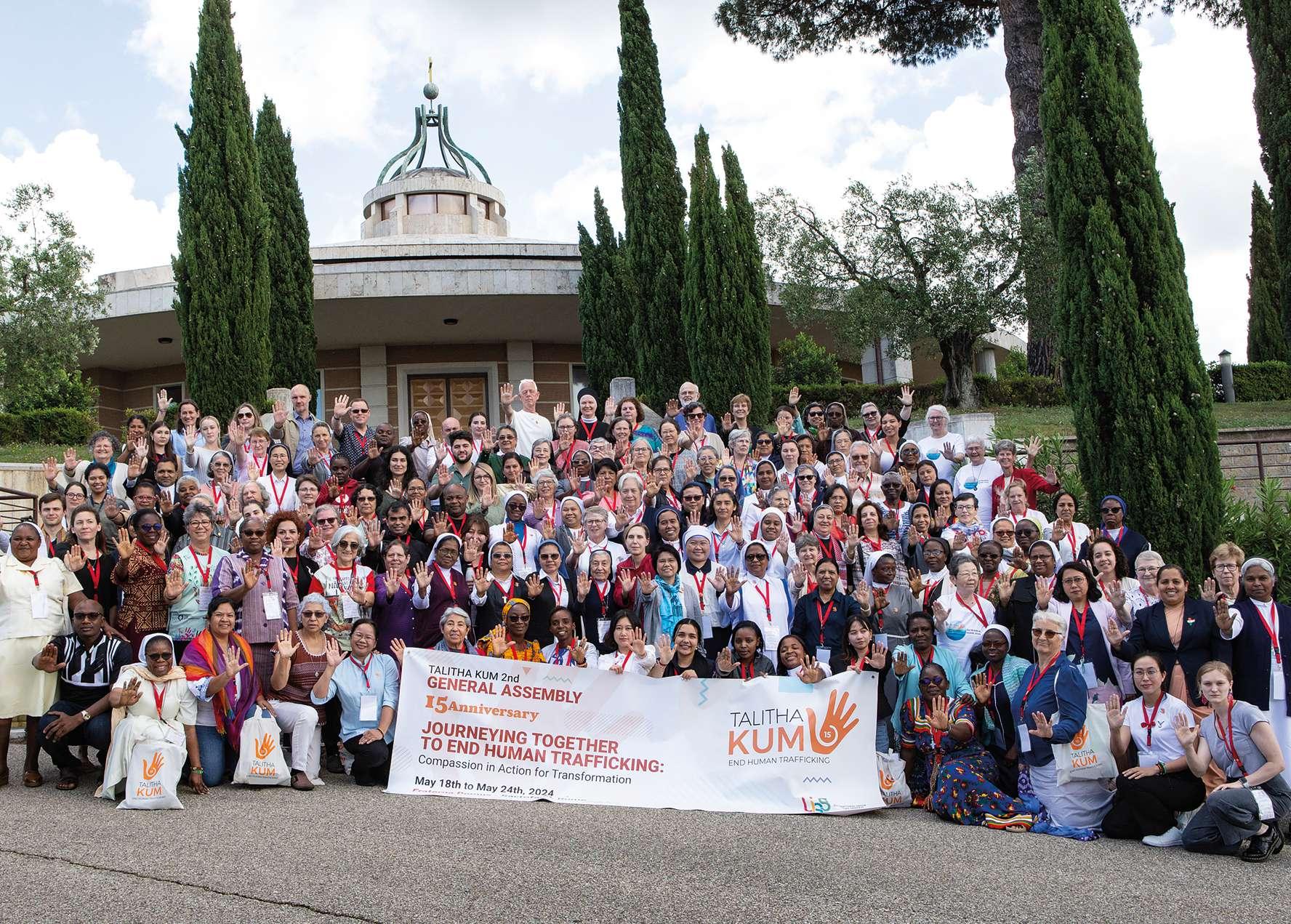

1 INTRODUCTION

SR. OONAH O’SHEA, NDS UISG President
“Talitha Kum” (Mark 5:41)
“Little girl, rise up.”
When Jesus commanded this child to have life and to stand up and take her place in her community, He was expressing God’s desire for each and every human person. This desire of God is the motivation of the Talitha Kum network in their commitment to dismantle the scourge of human trafficking and modern-day slavery.
This 2024 annual report presents the tireless efforts of the Talitha Kum network in eradicating human trafficking and the abuse of vulnerable people, particularly of women and children, through concrete actions rooted in faith and justice. The report outlines the implementation of the network’s strategic priorities and highlights its expansive reach made possible by the extraordinary dedication of religious sisters, their associates, and many collaborators working at the grassroots.
2024 witnessed a broadening of the network. The growth areas are Africa and Oceania. These regions, along with Asia, are where trafficking is most prolific. This expansion reflects a greater awareness among women religious and their collaborators of the reality of trafficking, especially affecting women and girls, and the need for a concerted effort to counteract it.
Unfortunately, the need for Talitha Kum has not diminished. The outreach of the network to victims/survivors continues to broaden as their numbers increase yearly. At the same time, the network’s efforts to raise awareness and bring this evil before the eyes of the local and international communities,
especially regarding forced labour and sexual exploitation, are also expanding.
Talitha Kum is a work of the Spirit, born of the Gospel’s call to stand with the poor and marginalized. It is blessed by our loving God, who always sides with the vulnerable and the exploited. In this Jubilee Year of Hope, we walk as Pilgrims of Hope, strengthened by faith and community.
On behalf of the International Union of Superiors General (UISG), I take this opportunity to express my deep gratitude to the Talitha Kum network for your ongoing dedication and steadfast commitment. Please be assured of UISG’s continued support, demonstrated through the endorsement of the Talitha Kum Call to Action and the reaffirmation of the declaration made during the 2nd General Assembly in May 2024. As I assume my new role as President of UISG, I remain firmly committed to supporting Talitha Kum and advancing its vision of a world free from human trafficking.
I also warmly encourage Superiors General across the globe to continue supporting and uplifting the vital work of the Talitha Kum sisters and their collaborators. Their prophetic witness at the grassroots is a sign of God’s mercy and a beacon of hope for those trapped in cycles of exploitation.
Let us move forward together—faithful, courageous, and united—as we respond to Jesus’ call: “Talitha Kum.”
INTRODUCTION

SR. ABBY AVELINO, MM
International Coordinator, Talitha Kum
Talitha Kum’s 2024 Report: A Journey of Transformation
With deep gratitude and hope, I am pleased to present the 2024 Annual Report on behalf of the global Talitha Kum network. 2024 brought significant challenges but also powerful signs of resilience, collaboration, and hope. In the face of global crises, Talitha Kum remained grounded in our mission: to walk alongside those affected by human trafficking and exploitation, responding with compassion, courage, and solidarity.
In 2024, Talitha Kum welcomed four newly established national networks , including Talitha Kum Pacific Islands . With these additions, our network now includes 64 national networks across 108 countries . In Africa, our presence expanded to Burundi , the Democratic Republic of the Congo , and Angola . Emerging efforts also got underway in other African and Asian countries. These developments highlight the continued relevance of Talitha Kum’s mission and
the urgent need for our presence in regions deeply impacted by trafficking.
2024 was also marked by the growing impact of armed conflicts in several African nations, Myanmar, Ukraine, and the Middle East. These crises displaced communities and increased risks for children and women, migrants and refugees. Despite these challenges, Talitha Kum expanded its support to victims and survivors by 20%, offering safe shelter, trauma-informed care, legal assistance, and skills development. These efforts underscore our steadfast commitment to accompany those on the margins.
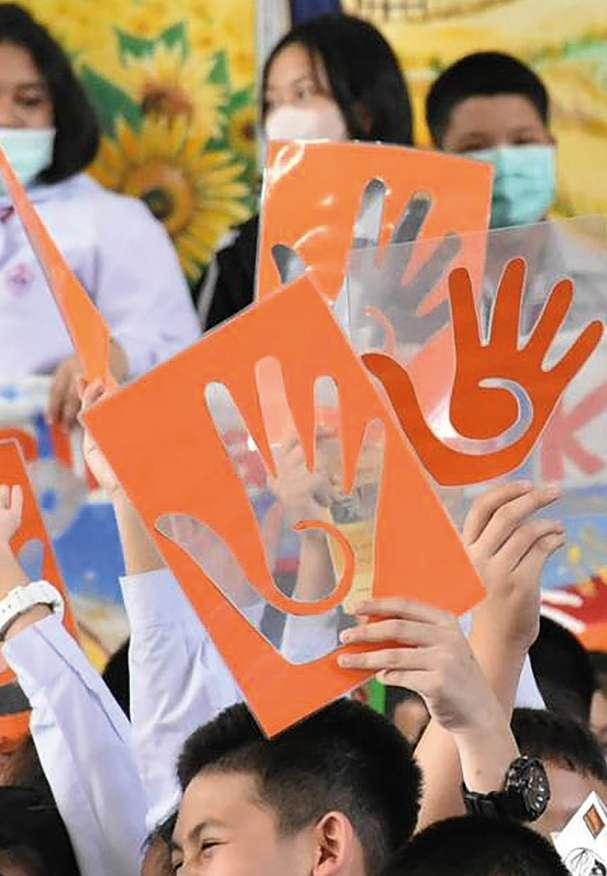
Our advocacy effort strengthened across every region. From Ghana to South Korea, and from Brazil to Ireland, Talitha Kum worked to influence public policy, drawing on the wisdom of survivors and local communities. The Youth Ambassadors Program continued to flourish, engaging young leaders who raise awareness both online and locally—mobilizing others to take action.
One of the most inspiring developments in 2024 was the growing recognition of Talitha Kum Sister members by governments and local communities. A number received civic awards, were invited to policy-making spaces, or were honoured for their service, integrity, and transformative impact.
A key highlight was Talitha Kum’s 2nd General Assembly in Rome, marking our 15th anniversary. Together, we drafted our strategic directions for 2025–2030, which will guide our efforts to strengthen protection, promote dignity, and drive systemic change in the fight against human trafficking.
We remain deeply moved by the legacy of the late Pope Francis, who called the world to listen to those suffering from exploitation. In his message for the 10th World Day of Prayer and Awareness Against Human Trafficking in 2024, he reminded us:
His leadership grounded our mission in the Gospel values of compassion, justice, and accompaniment. As we remember him with deep gratitude, we look with hope to Pope Leo XIV to carry this mission forward—supporting the work of consecrated women and all people committed to ending trafficking.
A heartfelt gratitude to the Executive Board of the International Union of Superiors General (UISG), the Talitha Kum International Coordinating Committee, our partner organizations, and mission companions. Your solidarity makes this mission possible.
With deep thanks to every Sister, Brother, priest, lay, partner, youth, and collaborator. Let’s continue to walk together toward a world free from trafficking, where every child is safe, every woman empowered, and every person treated with dignity.
With hope and unity, Sr. Abby Avelino, MM International Coordinator, Talitha Kum
“It is essential to listen to those who are suffering... May we feel challenged by the stories they tell.”
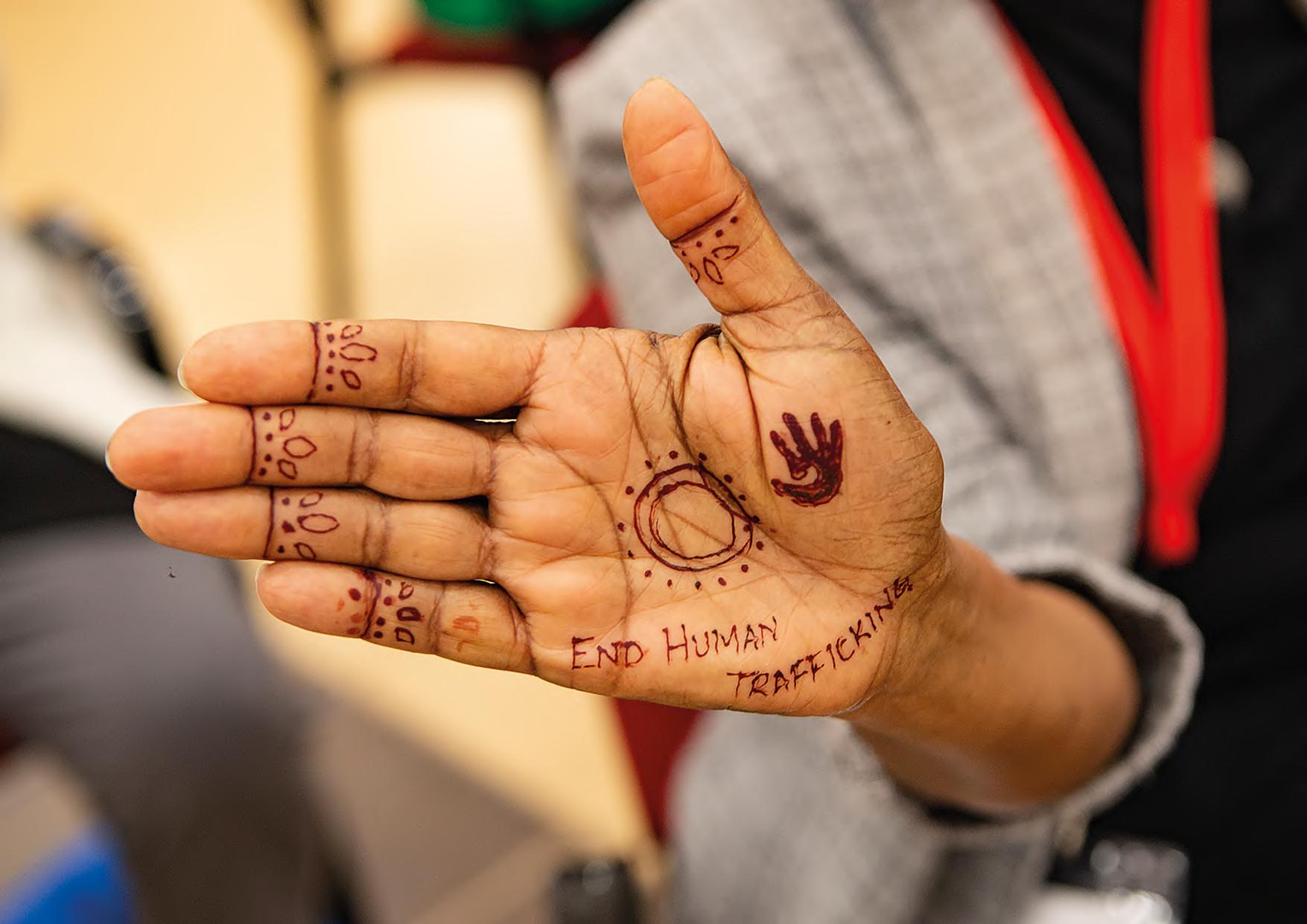
OUR MISSION 2
What is Human Trafficking?
As its name indicates, human trafficking, or trafficking in persons as it is also known, involves people. In this case, it refers to people who, in seeking to survive, thought their only option was to trust in promises they were unaware were false. What was promised was a “future” – not a better future, but a future. Samira, a survivor of human trafficking accompanied by Talitha Kum, shared in her testimony:
“I wanted to give my daughter a future and decided to embrace a journey to Tunisia. I knew that this could be a life-threatening journey; however, I knew that I had to do it for my daughter and myself.”
Human trafficking is increasing globally in nature. The phenomenon is complex and difficult to grasp because up-todate and real data is almost impossible to come by. It is constantly evolving since it is intrinsically linked to emerging global trends, realities, inequalities and vulnerabilities.
The latest UNODC Report highlights a sharp global increase in trafficking: a 25% rise in victims detected in 2022 compared to 2019. Cases of forced labour grew by 47%, and child victims increased by 31%, with a 38% rise among girls. These trends are linked to growing vulnerabilities from poverty, conflict, and the climate crisis. Trafficking of boys is increasing in areas with many unaccompanied children, while girls in high-income countries are often trafficked for sexual exploitation. 22% of NGOs report that over one-third of the survivors they support have been trafficked more than once.
According to the Global Report on Trafficking in Persons 2024:
• Women and girls still account for the majority of trafficking cases.
• In many regions, the majority of trafficked persons are minors.
• The number of persons trafficked for forced labor has now exceeded those trafficked for sexual exploitation.
These trends are based on the detected cases of human trafficking. The majority of people who suffer from human trafficking go undetected . To deepen your understanding on human trafficking, to read the definition agreed






+25%
OF VICTIMS OF HUMAN TRAFFICKING IN THE WORLD
UNODC Report 2024


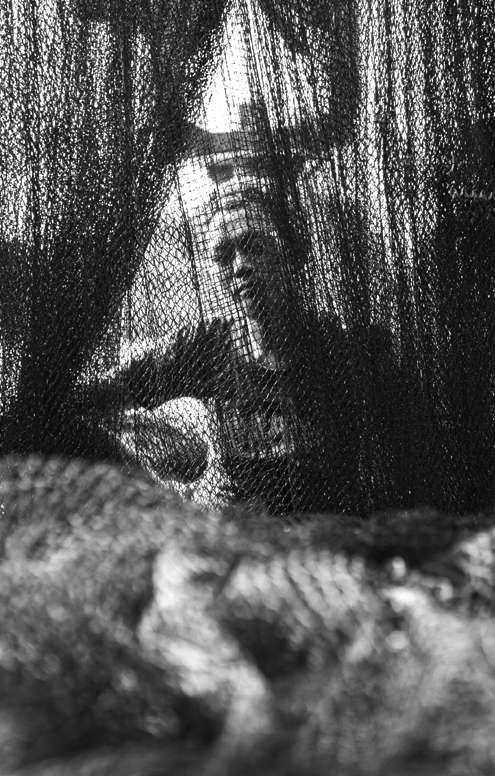
What is Talitha Kum?
Talitha Kum: An International Network Against Human Trafficking
Talitha Kum is an international network of Catholic Sisters, allies, and partners including survivors, committed to ending human trafficking and the various forms of exploitation driving it. Established in 2009 as an initiative of the International Union of Superiors General (UISG) , the network takes its name from the Gospel of Mark:
“
Talitha Kum. Little girl, I say to you, rise up”
(Mark 5:41)
These words of Jesus capture the spirit of Talitha Kum’s mission — a call to life, hope, and dignity for those harmed by the violence of human trafficking. Rooted in the Gospel and inspired by Catholic social teaching, Talitha Kum offers a compassionate, faith-based response to one of today’s most pressing global injustices.
Talitha Kum is a grassroots-oriented network , deeply embedded in local realities while connected across more than 100 countries. Catholic Sisters, often working in challenging contexts, lead the network in collaboration with religious, lay partners and people of goodwill. This networked communitybased model allows for close proximity to those most at risk of trafficking and exploitation.
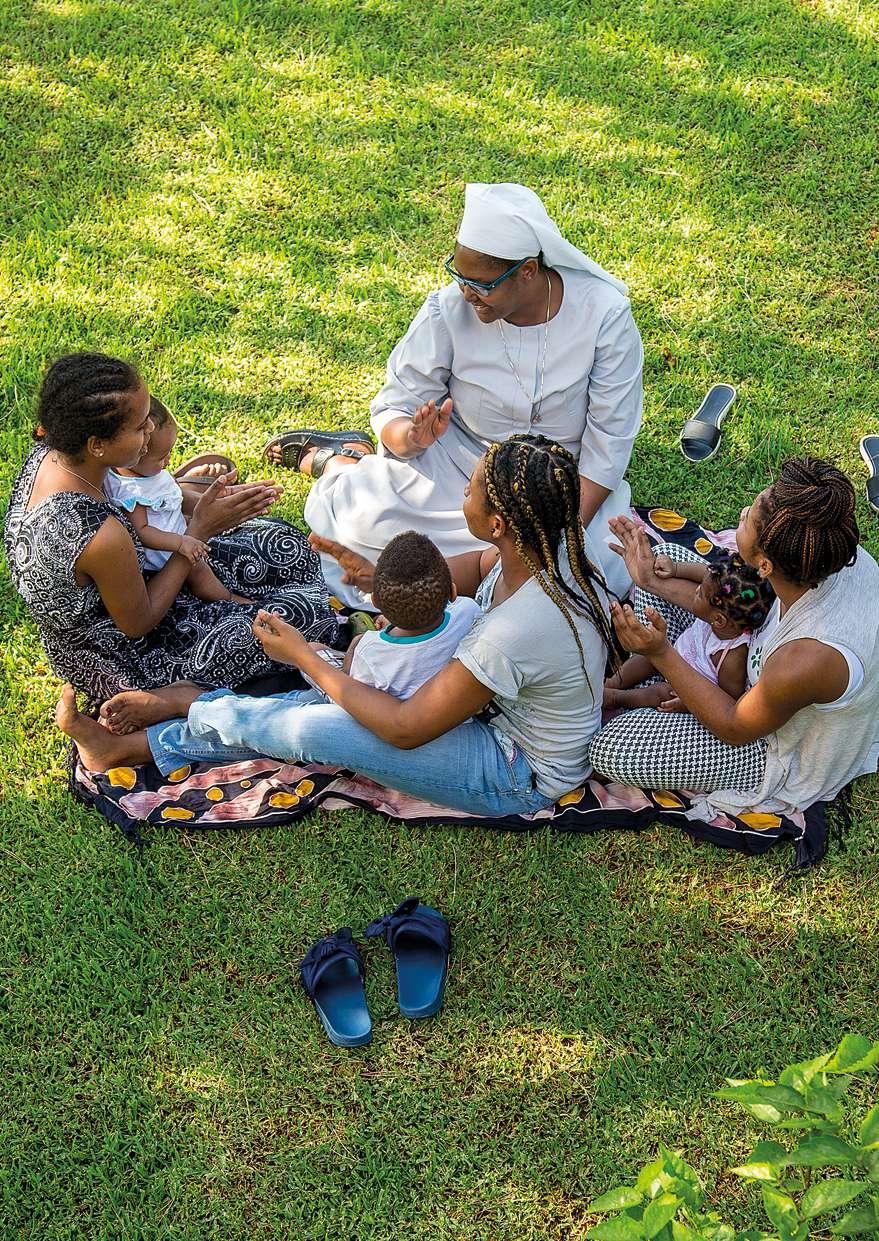
© Lisa Kristine
At the heart of Talitha Kum’s work is spiritual accompaniment . This is not simply a service, but a vocation. Catholic Sisters accompany survivors with presence and care , walking alongside them through pain, healing, and restoration. They uphold the dignity of each person, bearing witness to their resilience, hope, and courage.
The story of Aisha, a survivor of sexual exploitation, reflects this mission. Trafficked from the age of 16, Aisha endured fear and isolation. Her life began to change when she encountered a Talitha Kum network that offered her protection, listening, and spiritual support. Through their accompaniment, she found the strength to reclaim her dignity. Today, she supports other women on similar paths and dreams of building a shelter for survivors — a space rooted in healing and hope. Her journey embodies the Gospel message: “Talitha Kum” — Rise up.
In 2024, Talitha Kum celebrated its 15th anniversary, marking both its growth and deepening impact. What began as a small initiative has become a global, Sister-led network, a trusted presence within local churches and vulnerable communities.
On that occasion, Pope Francis offered his affirmation: “Talitha Kum has become a widespread global network and, at the same time, deeply rooted in the local Churches. It has become a reference point for victims, their families, those at risk and the most vulnerable communities. Furthermore, your appeals act as a strong reminder to local and national institutions and governments to take up their responsibilities in this regard. I encourage you to continue on this path, furthering prevention and care, and weaving together many valuable relationships that are indispensable in order to combat and defeat trafficking.”
Talitha Kum is more than a network. It is a living witness to the Gospel — prophetic, collaborative, and rooted in compassion. Together, we continue our journey toward ending human trafficking.
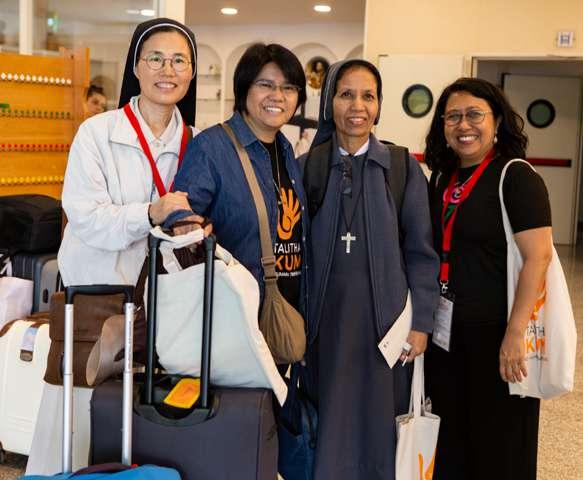
Message from Pope Francis 15th Anniversary of Talitha Kum 23 May 2024
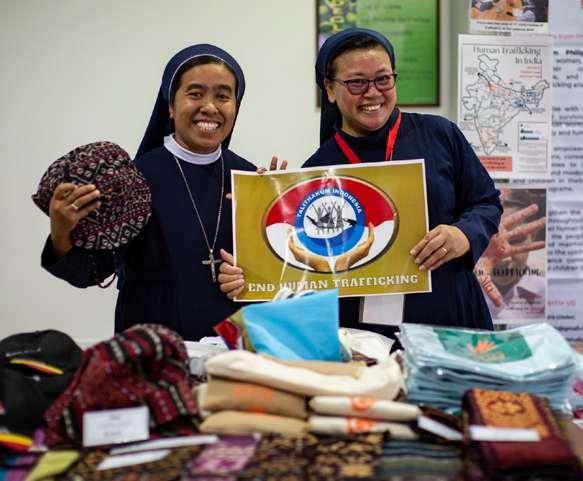
© Margherita Simionati-TK-UISG
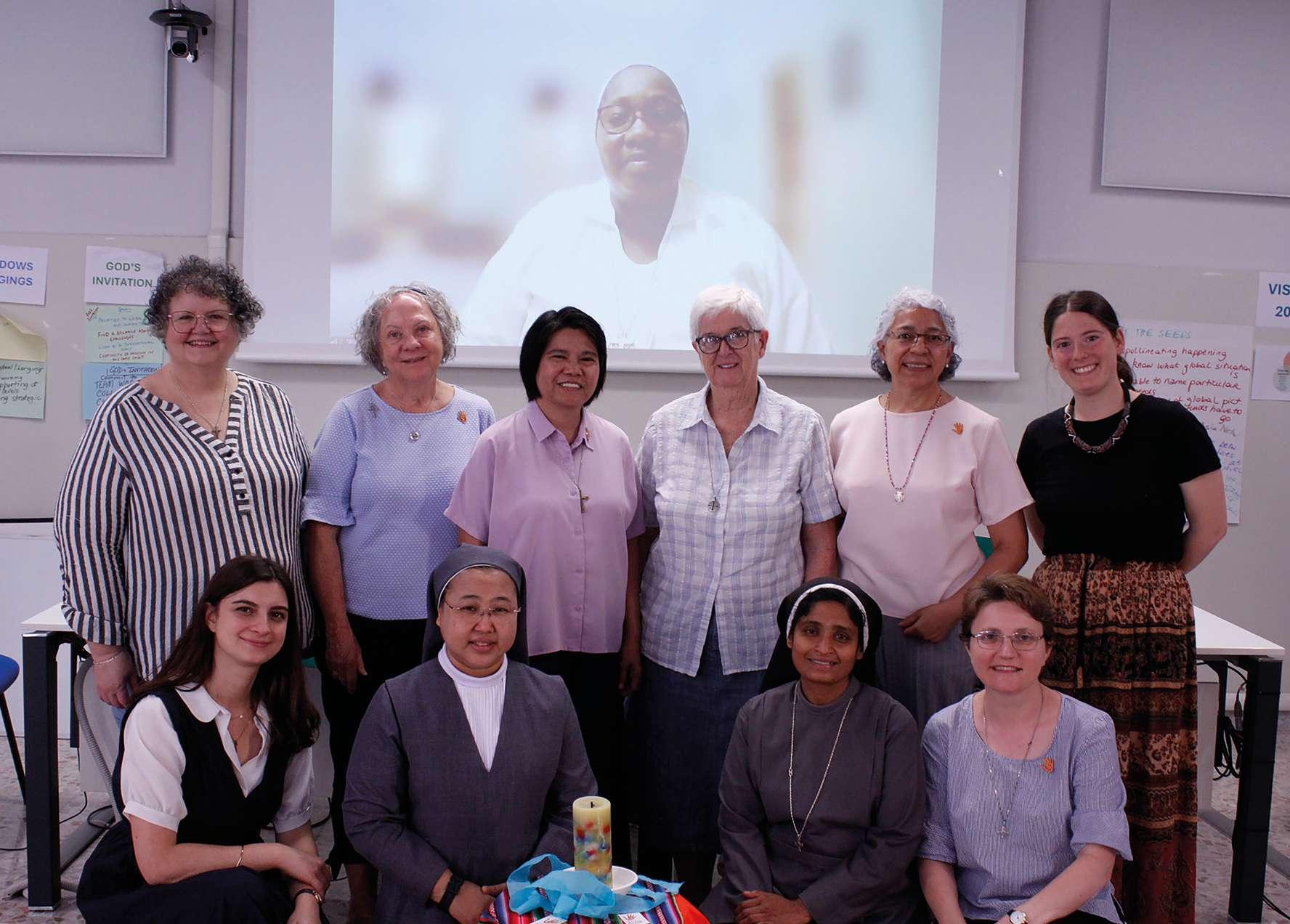
Talitha Kum International Coordination Committee

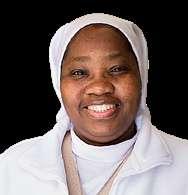
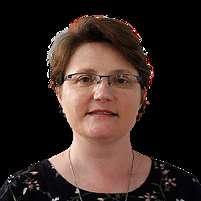

SR. ABBY AVELINO, MM
International Coordinator, Talitha Kum
MM - Maryknoll Sisters
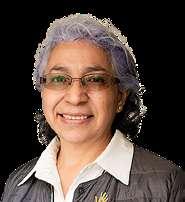
SR. YVONNE CLEMENCE BAMBARA, RGS
Regional representative of Africa
RGS - Congregation of Our Lady of Charity of the Good Shepherd

SR. CARMEN GARCIA UGARTE, OSR
Regional representative of Latin America
OSR - Oblate Sisters of the Most Holy Redeemer
SR. ADINA BALAN, CJ
Regional representative of Europe
CJ - Congregatio Jesu

SR. ISABELLE COUILLARD, SGM
Regional representative of North America
SGM - Sisters of Charity of Montreal
SR. PAULA KWANDAO PHONPRASERTRUKSA, SPC
Regional representative of Asia
SPC Sisters of Saint Paul of Chartres
SR. ANNETTE ARNOLD, RSJ
Regional representative of Oceania
RSJ - Sisters of St Joseph of the Sacred Heart
Talitha Kum in the World
Contact Country: No formal network established. Ongoing dialogue with one or more contact persons.
AFRICA ASIA
NIGERIA
SOUTH AFRICA
UGANDA
ZIMBABWE
KENYA
BURKINA FASO
CAMEROON
GHANA
MOZAMBIQUE
ETHIOPIA
TANZANIA
ZAMBIA
IVORY COAST
MALI
TOGO
TUNISIA
ALGERIA
MOROCCO
MAURITANIA
SENEGAL
New TK Network in 2024
BURUNDI
DEMOCRATIC REPUBLIC OF CONGO
ANGOLA
EUROPE
GERMANY
ITALY
IRELAND
PORTUGAL
ROMANIA
ALBANIA
POLAND
Contact Country
UNITED KINGDOM
FRANCE
SPAIN
DENMARK
NETHERLANDS
BELGIUM
LATVIA
LITHUANIA
UKRAINE
MOLDOVA
BULGARIA
GREECE
TURKEY
AUSTRIA
SLOVENIA
SWITZERLAND
MALTA
CROATIA
MONTENEGRO
KOSOVO
HUNGARY
SLOVAKIA
CZECH REPUBLIC
NORTH MACEDONIA
INDONESIA
INDIA
SRI LANKA
PHILIPPINES
THAILAND
SOUTH KOREA
JAPAN
MYANMAR
CAMBODIA
TIMOR LESTE
PAKISTAN
TAIWAN
BANGLADESH
VIETNAM
NEPAL
Contact Country
MALAYSIA
MIDDLE-EAST
LEBANON
JORDAN
SYRIAN ARAB REPUBLIC
EGYPT
LATIN & NORTH AMERICA
DOMINICAN REPUBLIC
COLOMBIA
BRASIL
PERU
ARGENTINA
GUATEMALA
HONDURAS
COSTA RICA
EL SALVADOR
PARAGUAY
URUGUAY
MEXICO
ECUADOR
BOLIVIA
PUERTO RICO
CANADA
UNITED STATES OF AMERICA
Contact Country
NICARAGUA
CUBA
HAITI
OCEANIA
AUSTRALIA
NEW ZEALAND
New TK Network in 2024
VANUATU
FIJI
SOLOMON ISLANDS
TONGA
SAMOA
KIRIBATI
3 2024 IN FIGURESKEY INSIGHTS AND STRATEGIC IMPLICATIONS
In 2024, Talitha Kum recorded 6,043 members and collaborators, marking a 2.85% increase over the previous year. At the same time, the number of Religious Congregations involved decreased to 841, a 3.85% decrease, noted mainly in the Americas and Oceania. This reality highlights the need to expand lay formation and leadership, strengthen intergenerational collaboration between Sisters, and build strong partnerships with allied networks to sustain the mission in the face of changing demographics.
Data from 2024 reveals both measurable growth and emerging challenges across the Talitha Kum global network. The following key insights reflect a combination of quantitative progress and qualitative significance:
1. Expanded Survivor Support
In 2024, 46,863 victim-survivors of human trafficking received direct support from Talitha Kum—an overall increase of 19% compared to the previous year . This includes a 26% increase in services such as safe shelter, trauma-informed care, legal assistance, and skills development, especially in Asia and the Americas. These efforts were carried out primarily by Talitha Kum Sisters and collaborators, whose compassionate presence and long-term accompaniment embody the network’s mission of walking with survivors in dignity and hope. This growing outreach reflects not only an increased need, but also the trust communities place in Talitha Kum as a faith-based network rooted in solidarity.
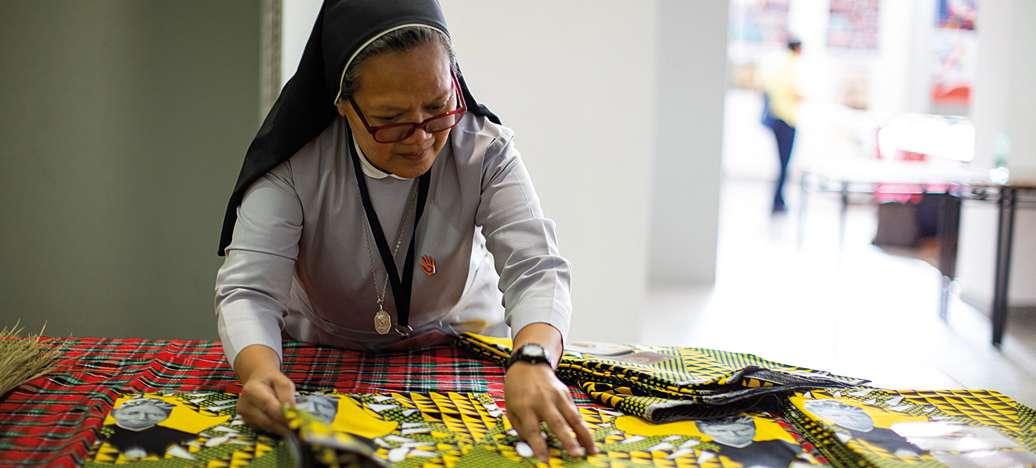
2. Uneven Trends in Access to Justice
There was a 26% overall decrease in access to justice services, with notable declines in Europe and Africa. However, this was contrasted by a positive increase in access to justice in Asia , where effective legal support and advocacy partnerships have yielded promising results. This variation points to the need for strengthening legal accompaniment and replicating successful regional practices across under-resourced areas.
3. Focused Outreach to Women and Girls, and Children
For the first time, Talitha Kum collected separate data on the number of women and girls, and children reached through prevention and protection programs. In 2024:
• 222,573 women and 204,044 children (boys and girls) were reached through prevention and awareness-raising activities.
• 31,157 women and girls received direct care and support for victims-survivors of trafficking.
This specification allows Talitha Kum to tailor its responses more effectively, ensuring programs are sensitive to the specific needs of women and girls, and children—those most vulnerable to trafficking and exploitation.

4. Growth in Prevention and Networking Prevention programs reached nearly 690,356 people in 2024—an 11% increase. Networking efforts engaged 123,493 individuals , marking a 36% increase . These increases were especially significant in the Americas, Asia, the Middle East, and Africa. Together, these strategies reflect Talitha Kum’s strength in grassroots mobilization, interfaith collaboration, and networking at multiple levels.
5. Strengthened Advocacy Presence
Advocacy initiatives reached 78,473 people , with strengthened visibility and lobbying across the American, European, Oceania, and African continents. Talitha Kum’s advocacy is grounded in the voices of survivors and the lived experiences of communities, enhancing the impact of its participation in policymaking spaces and civil society platforms.
6. Overall Impact and Reach
With a 25% overall increase in outreach, Talitha Kum reached 939,185 people globally in 2024. This growth was driven by expanded prevention programs, deeper networking collaboration, strengthened survivor support, and more impactful advocacy. The network’s presence now includes 64 national networks across 108 countries , with notable growth in Africa and Oceania.
© Margherita Simionati-TK-UISG
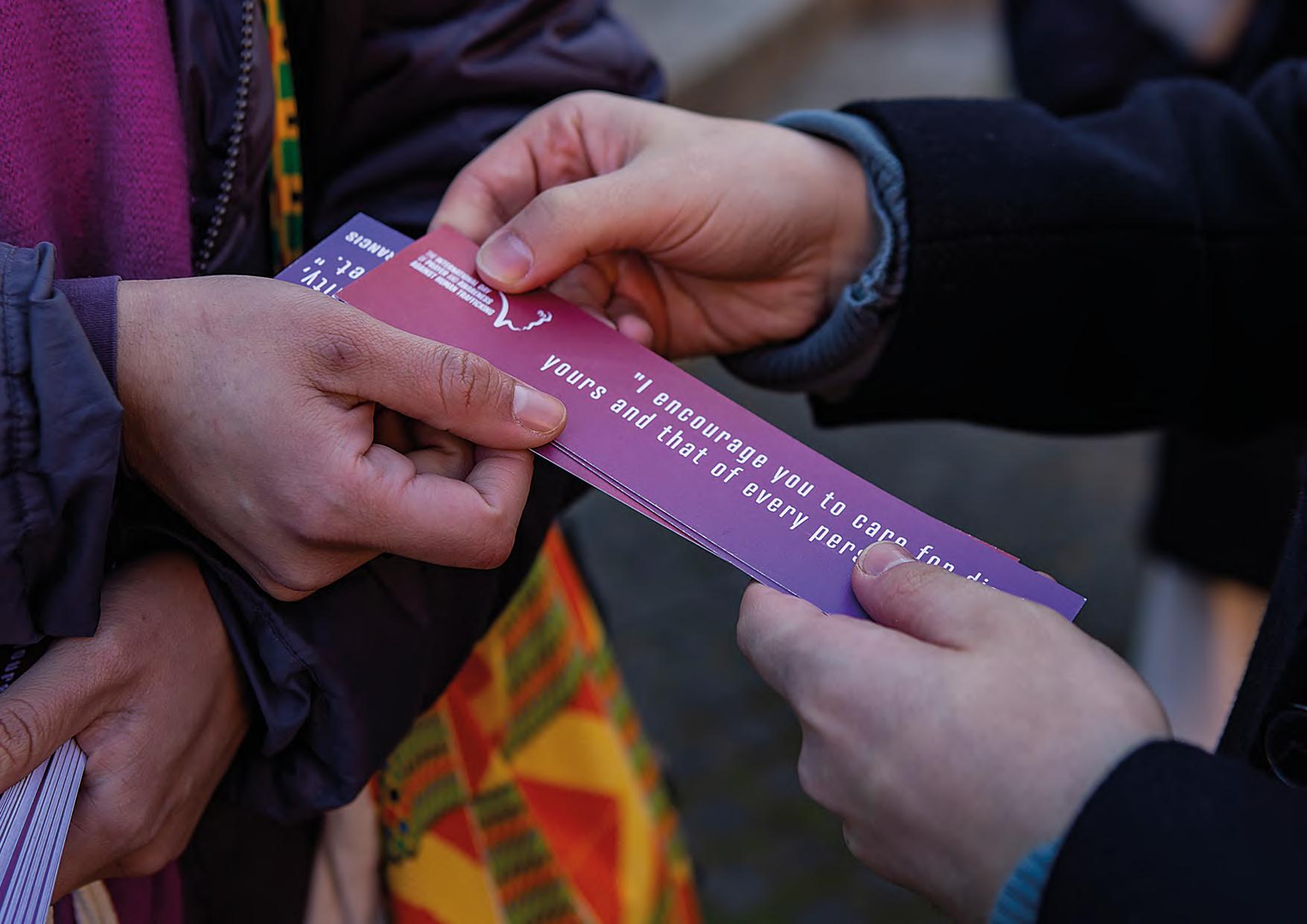
PROSECUTION ACCESS TO JUSTICE 4131 PROTECTION CARE FOR VICTIMS AND SURVIVORS OF HUMAN TRAFFICKING 42732
VICTIMS/SURVIVORS SUPPORTED 46863 WOMEN & GIRLS 31157
PREVENTION WITH POPULATION AT-RISK, AWARENESS-RAISING CAMPAIGNS EDUCATIONAL PROGRAMS WITH STUDENTS 690356 WOMEN & GIRLS 222573 CHILDREN UNDER 18 Y/O
PEOPLE REACHED IN 2024 939185
ADVOCACY 78473
PARTNERSHIP NETWORKING, TRAINING, CAPACITY BUILDING 123493
4 NETWORKING FOR SOLIDARITY AND CHANGE
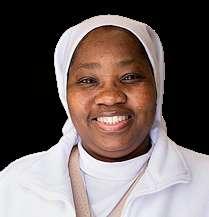
Regional representative of Africa
RGS - Congregation of Our Lady of Charity of the Good Shepherd
SR. YVONNE CLEMENCE BAMBARA, RGS
Africa
Talitha Kum Africa maintains a dynamic , collaborative interaction between the various national networks on the continent. The continental network is subdivided into 5 main continental zones . Qualitative interaction taking place between the national networks in the same regional group (HUBS) has led to effective collaboration in raising public awareness regarding human trafficking within countries, as well as joint awareness-raising actions at migrant border crossings where human trafficking is more of a threat. At the national level, networks collaborate together to create a national strategic plan. Each network within the country then translates that plan into action.
Talitha Kum is not the only organization involved in the fight against trafficking. Several civil organizations are aware of this reality and have organized to reduce the scale of the phenomenon and support survivors. Consequently, Talitha Kum has joined forces with other religious, civil and government entities,
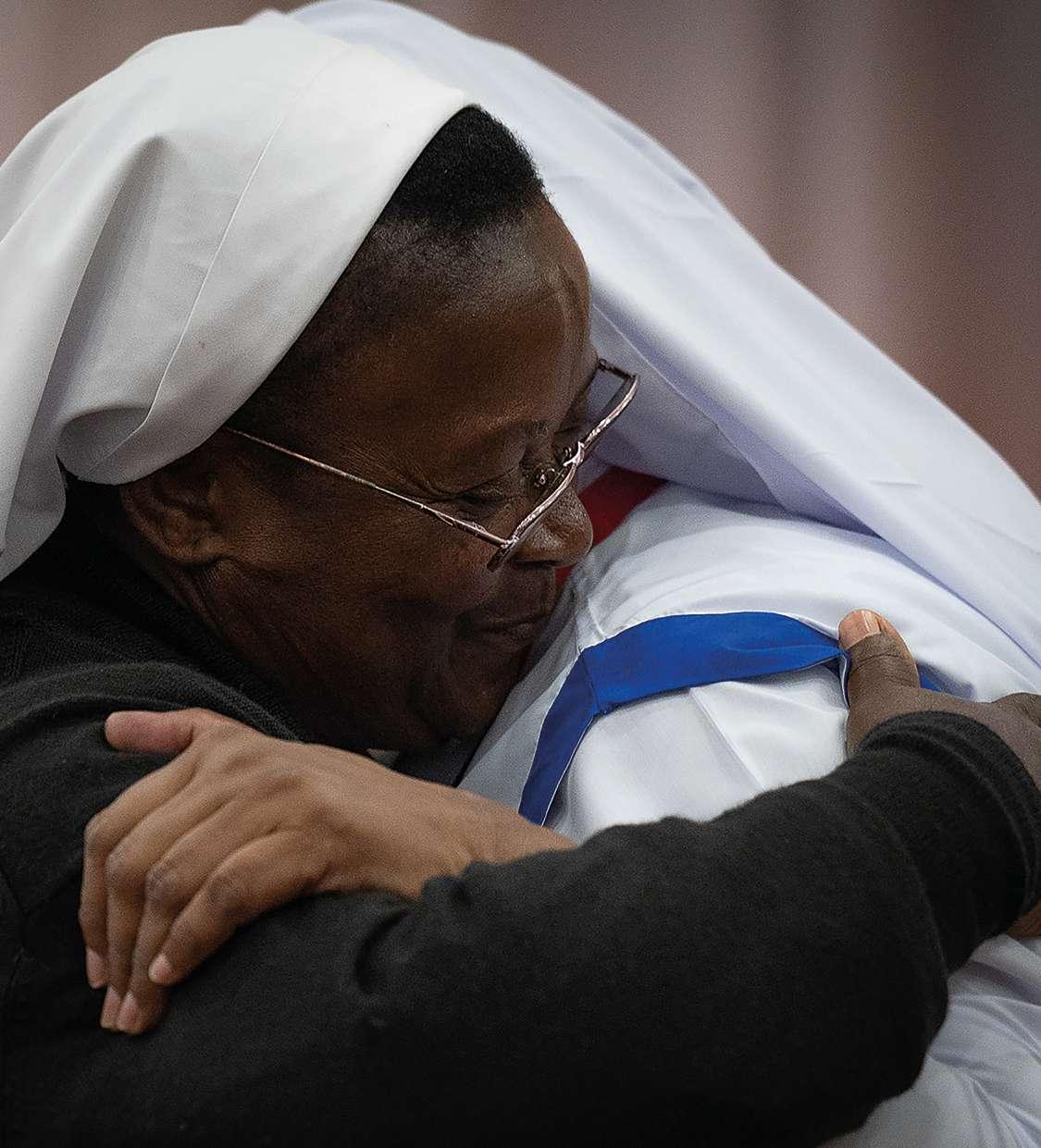
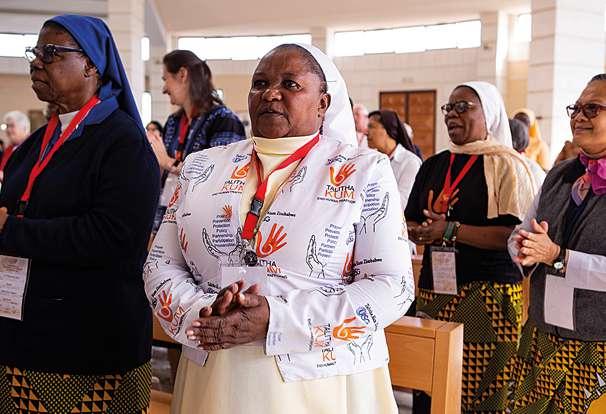
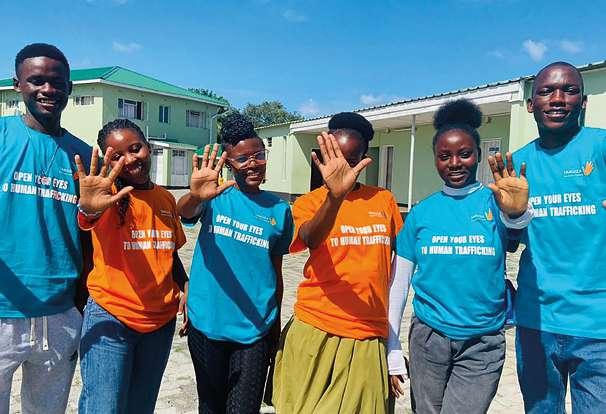
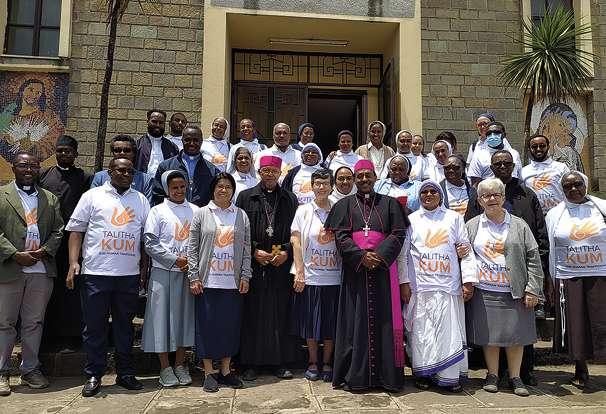
and NGOs in Africa. Networking at this level has provided such possibilities as offering Zoom training sessions and webinars, raising awareness through the press, local radio stations and television channels. It also extends to support and care for victims and survivors of trafficking, including the facilitation of the safe repatriation of survivors.
Governments in Africa are aware of the humiliating and dishonourable phenomenon of trafficking. However, this awareness does not always translate into a priority in policy making. Talitha Kum’s mission is therefore welcomed by most national government structures. This is reflected in joint activities on the issue of trafficking, and in the welcoming of survivors in shelters run by Talitha Kum member congregations since there is a lack of such facilities in many African countries.
With regard to religious structures, Talitha Kum has created links with grassroots Christian communities, parishes, dioceses and their leaders, who support Talitha Kum members in their specific mission of raising awareness, welcoming and supporting survivors of trafficking.
Another network Talitha Kum has invested in building is the Talitha Kum Youth Ambassadors Network. In 2024, Talitha Kum trained another group of around 100 young people, thus strengthening youth engagement across the continent.
As the African adage goes: “One finger cannot pick up flour by itself”. Through its various networks and by collaborating with other strategic partners, Talitha Kum is increasingly working to make its contribution in the field visible, and is gaining ground one network relationship at a time.
© Marco Mastrandrea












AFRICA
Talitha Kum’s African networks expanded significantly in Nigeria, Ghana, Ethiopia, Zimbabwe, and Burkina Faso. Efforts focused on prevention, survivor care, access to justice, and networking and collaboration. Radio and social media campaigns—particularly in Zambia and Kenya—raised awareness about the risks of migration. Survivors received holistic care and safe repatriation to support recovery. Trusted relationships with authorities improved justice outcomes while protecting victims. Strengthened partnerships broadened the network’s reach and deepened its impact, showing Talitha Kum’s commitment to ending human trafficking across Africa.
PEOPLE REACHED IN 2024
PARTNER ORGANIZATIONS Catholic Organizations 70 NGOs 64 Governmenta Intergovernmental Organizations 55 VICTIMS / SURVIVORS SUPPORTED
PROTECTION CARE FOR VICTIMS-SURVIVORS 1025
NETWORKING 42046 PROSECUTION ACCESS TO JUSTICE
ADVOCACY 51470
The numbers indicate the people reached through the different areas of activity in 2024.
REGIONAL COORDINATIONS
East Africa Hub
Northern Africa Hub
West Africa Hub (English speaking)
West Africa Hub (French speaking)
Southern Africa Hub
PROTECTING SURVIVORS AND OFFERING SHELTER
5
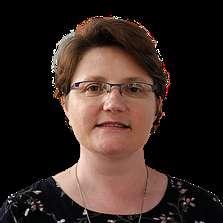
SR. ADINA BALAN, CJ
Regional representative of Europe
CJ - Congregatio Jesu
Europe

Survivors are not just recipients of care, but protagonists of change” was the core truth reaffirmed in 2024 by Talitha Kum Europe.
As trafficking patterns become more complex in Europe due to the increase of migration, displacement, and traffickers’ growing use of social media messaging apps and encrypted platforms to groom, recruit, and exploit victims, shelters have had to evolve from offering traditional services into spaces for empowerment and leadership development.
In 2024, through its vibrant network of congregations and partners, Talitha Kum Europe intensified its commitment to provide short and long-term shelters and survivorcentred protection to trafficked persons. All members actively engaged in responding to Talitha Kum’s Priority 2 by embracing a holistic, survivor-centred approach , walking empathetically alongside them, promoting their involvement, and fostering spaces of healing, dignity, and empowerment.
© Margherita Simionati-TK-UISG
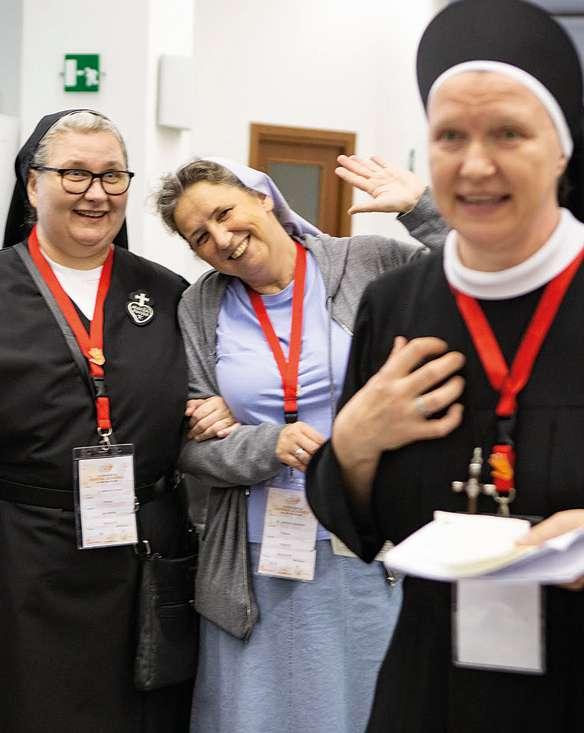
In 2024, responding to the needs of survivors, shelters were transformed from emergency stops into lifelines . Many are now equipped to provide immediate rescue or shelter, as well as long-term trauma-informed care, job training, and community as they rebuild their shattered lives. In these safe havens, they can initiate their healing process, which can include complex mental health challenges, rooted in prolonged trauma, fear, and loss.
Continuing the rollout of the Survivor Leadership Training Programme , designed by RENATE network, was a landmark initiative in 2024. Feedback from participants, many of whom now serve as peer mentors within shelters, highlights its transformative effect . It truly ignited a ripple of empowerment. Important discussions around inclusivity also emerged. In Albania, the network is exploring a pilot programme for male survivors, acknowledging their distinct vulnerabilities and the need to adapt support structures.
At the heart of all these efforts lies the unwavering dedication of shelter staff working in challenging and underresourced environments. Recognising the emotional toll of caregiving, RENATE endorsed the idea of an annual retreat.
This 10-year-old initiative offers those on the frontlines a sacred space to rest, reconnect, and receive the same compassion they extend to others.
Remaining challenges include: the increase of minors welcomed in shelters, which entails specific safeguarding and legal complexities; traditional care models no longer respond to cyber-
trafficking and digital exploitation; multilayered trauma in conflict zones requiring urgent psychosocial and spiritual accompaniment for survivors and their caregivers.
In countries like Albania, Greece, Poland, Romania, Germany, and Ukraine, sisters and lay partners accompanied survivors on a daily journey of reclaiming their voice and rebuilding their lives in communities still reluctant to acknowledge trafficking beyond stigma and prejudice.
“The sisters always listened without judgment, teaching me I was more than what happened to me. They helped me find hope, even on the darkest days.”
Crina (Romania)
© Margherita Simionati-TK-UISG









EUROPE
Talitha Kum Europe advanced prevention, care for victims and survivors, access to justice, networking, and advocacy. The Union of Major Superior’s Italy network “ANTI-TRATTA” raised awareness through film discussions, exhibitions, prayer vigils, and educational outreach. APT Ireland led strategic partnerships, public campaigns, and the cAPTives education program, engaging students and policymakers. SOLWODI Germany provided counselling, shelters, and reintegration support. Advocacy efforts, supported by strong collaboration with RENATE as a regional network, emphasized ethical research and data-driven policy enhancing research execution and advocacy impact across the region.





The numbers indicate the people reached through the different areas of activity in 2024.
6 ACCOMPANIMENT
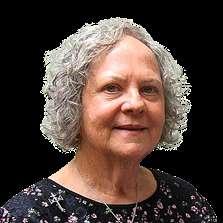
SR. ANNETTE ARNOLD, RSJ
Regional representative of Oceania
RSJ - Sisters of St Joseph of the Sacred Heart
Oceania
T he words of this survivor describe best the role of the ACRATH Companionship Program:
“I would like to extend my deepest gratitude to ACRATH for the incredible support I have received. From the very beginning, ACRATH provided more than just financial assistance - it was a pillar of emotional encouragement and belief in my potential. The scholarships and funding provided helped lift the heavy burden of tuition fees, textbooks, electronic device, car, childcare fees and daily living expenses. This allowed me to focus wholeheartedly on my studies and clinical training without the added stress of financial strain. Beyond financial aid, the emotional support I received made a lasting impact. During the most challenging moments, I felt seen, heard, and empowered. The encouragement and guidance I received reminded me that I was never alone in this journey, and that my dream of becoming a nurse was worth every sacrifice. Now, as I thrive in my career as a nurse, I carry the values and compassion that ACRATH instilled in me. I serve my patients with dedication, dignity, and a deep sense of purpose—knowing that I stand on the shoulders of those who believed in me. Thank you, ACRATH, for being a beacon of hope and strength. You have not only supported my education - you’ve shaped my future.”
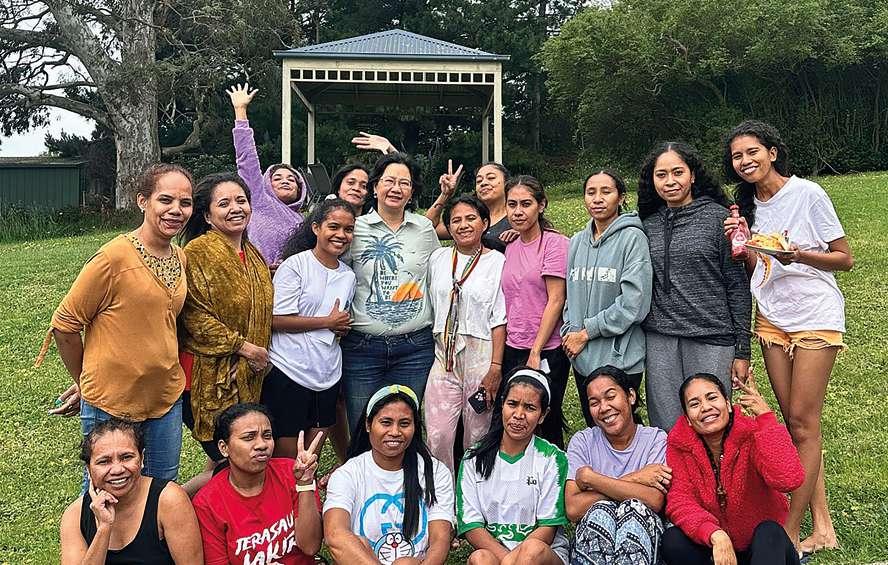
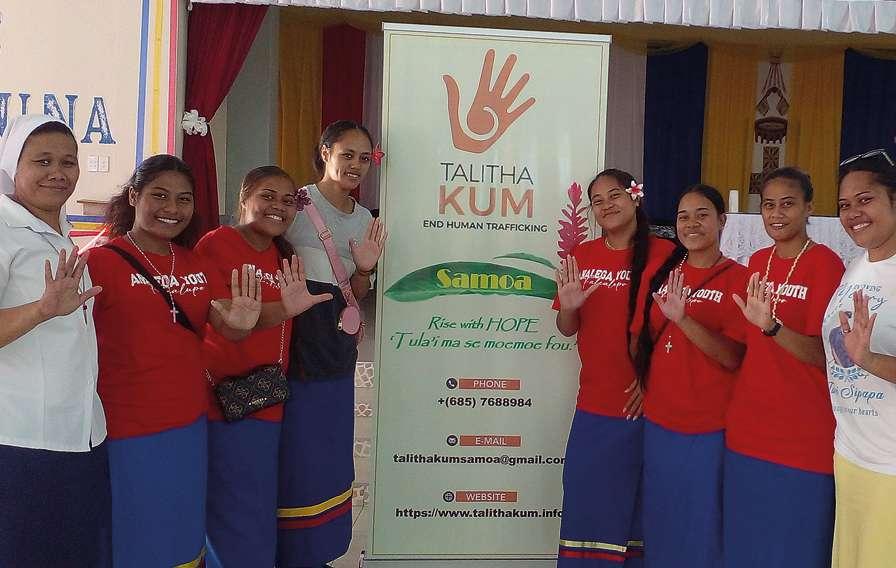
The ongoing support and empowerment of people who have experienced human trafficking is a priority in our Oceania Region. Our Companionship Program has been a fundamental priority of the work of Australian Catholic Religious Against the Trafficking of Humans (ACRATH) since 2005. A 2024 review has resulted in an updated ACRATH Companionship Program Handbook, appointment of a Companion Program Coordinator, a training program, revised policies and procedures, and a new Advisory Group. All this makes for a very robust program that supports both the Companion, the survivor, and the referring agencies.
What is ACRATH’s Companionship Program? ACRATH members provide a warm, friendly presence - the support of a ‘good neighbour’ - to support and encourage people to take charge of their own life. An ACRATH Companion is not a caseworker or a counsellor and is not there to respond to significant unmet needs such as acute mental health issues. In 2024, 13 Companions were carefully selected, provided with ongoing training, and received regular professional supervision. Particular foci for ongoing formation include: establishing and maintaining
healthy boundaries; cross cultural and interfaith awareness; traumainformed approaches to their ministry; and compliance with all safeguarding standards. Companions always prioritise and respect the privacy and autonomy of the people they support.
What
kind of assistance do ACRATH Companions provide? ACRATH Companions meet with their survivor Companions on a regular basis in a public place (e.g., a public library or coffee shop). Sometimes they accompany them to appointments (e.g., with government social services), or provide transport or support (e.g., by taking them to an appropriate community or cultural group, church). Support is most often an informal coffee and chat. In 2024, generous donors enabled us to offer financial support that will advance the healing, growth and development of 17 survivors and their children.











OCEANIA
In Oceania, Talitha Kum Pacifica was officially established, strengthening regional efforts against human trafficking. ACRATH led prevention through school awareness campaigns, fair trade initiatives, and youth engagement as leaders and ambassadors. Protection efforts centered on one-to-one support by professionally trained Companions offering survivors relational and supervised care. Partnerships grew with youth groups in Australia like Young Mercy Links through collaborative events such as Clothes Swaps. Advocacy efforts raised public and political awareness of modern slavery, highlighting sustained commitment and progress in combating human trafficking across the region.
13
PEOPLE REACHED IN 2024
VICTIMS / SURVIVORS SUPPORTED
AND COLLABORATORS
3
PROSECUTION ACCESS TO JUSTICE
ADVOCACY
PARTNER ORGANIZATIONS
Catholic Organizations 31 NGOs 25 Governmenta Intergovernmental Organizations 11
The numbers indicate the people reached through the different areas of activity in 2024.
REGIONAL COORDINATIONS
Talitha Kum Pasifica
CONTINENTAL COORDINATIONS
Talitha Kum Oceania
7 PREVENTION OF TRAFFICKING
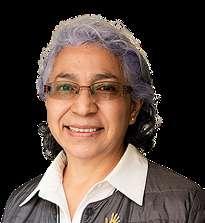
SR. CARMEN GARCIA UGARTE, OSR
Regional representative of Latin America
OSR - Oblate Sisters of the Most Holy Redeemer
Latin America and the Caribbean
2024 ended with the release of an important Manifesto against Human Trafficking. Talitha Kum networks and the Confederation of Latin American Religious’ (CLAR) Antitrafficking Commission jointly release this Manifesto on December 10, the day on which the World Day of Human Rights is celebrated. This Manifesto is clear and forceful:
“The mystical-prophetic dimension pushes us to have an impact on the eradication of human Trafficking.” –
Manifesto Against Human Trafficking
December 10, 2024
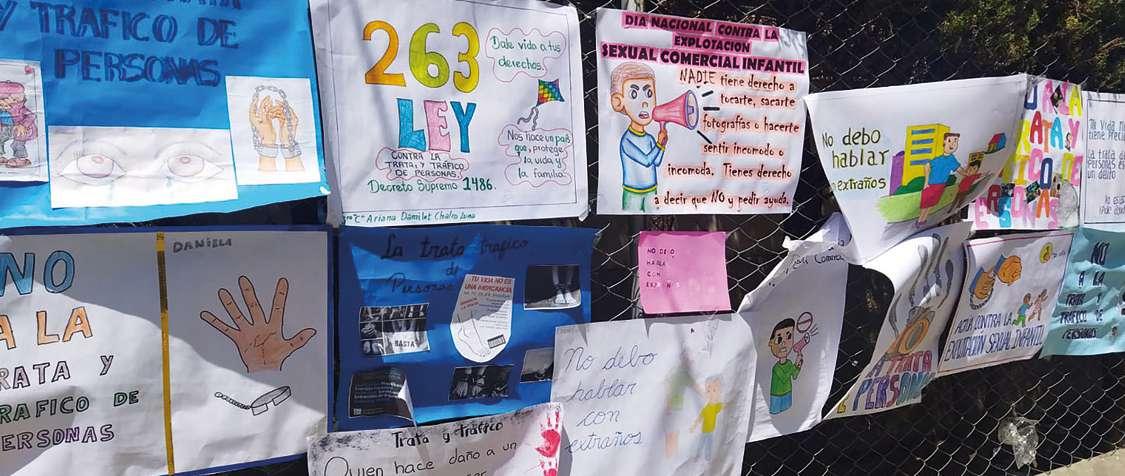
“ PEOPLE ARE NOT MERCHANDISE ”, is displayed at th e main border crossing from Colombia to Ecuador. The Talitha Kum Latin America Networks repeat this in every meeting and activity, because every human being has dignity, value and inherent rights that must be respected and protected . People are not objects that
can be bought, sold and used to satisfy others’ desires.
In the countries where there is a Talitha Kum network, prevention represented the most important mission in 2024 . This activity expanded with the presence of Talitha Kum’s Youth Ambassadors, reaching remote areas to continue its
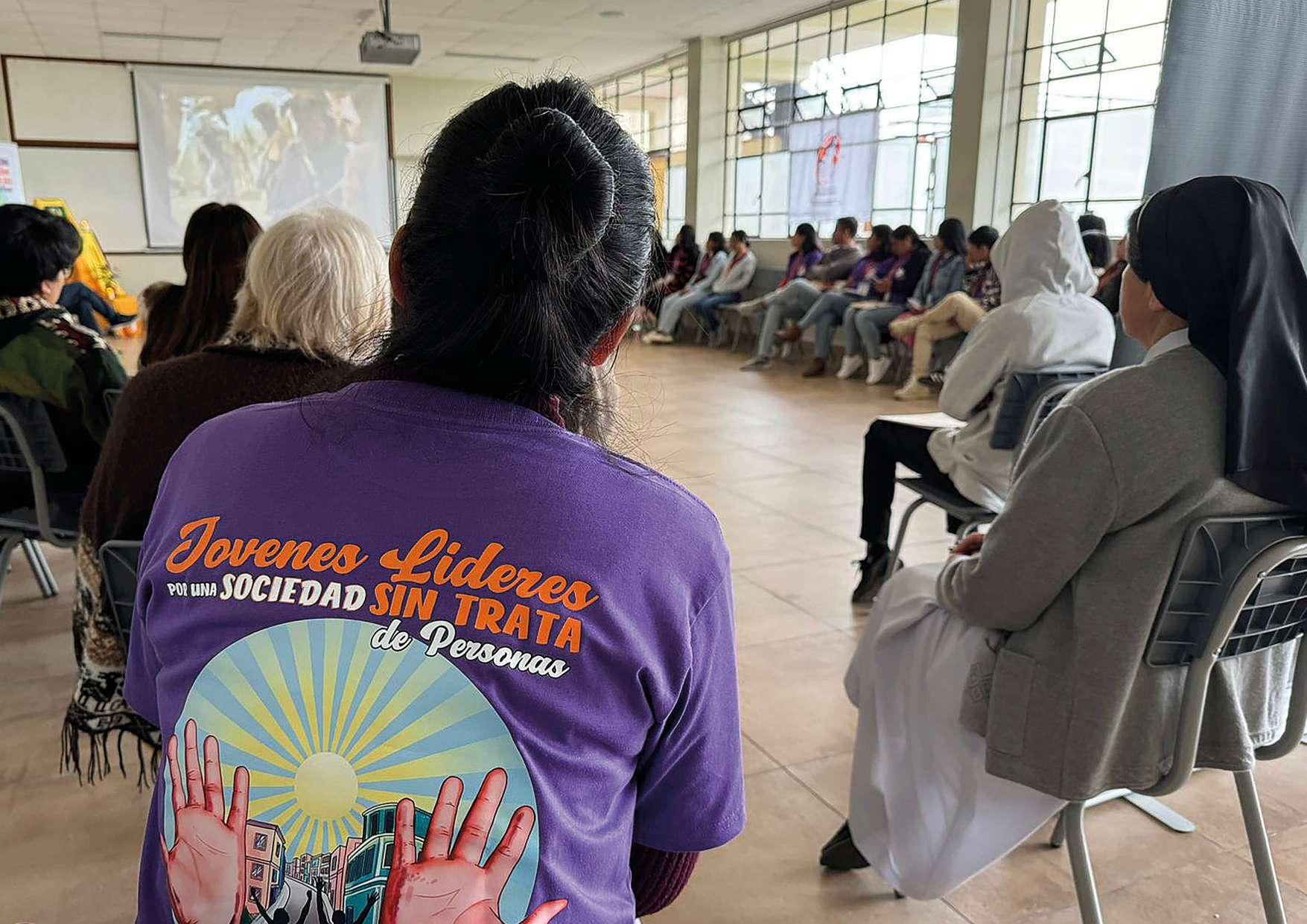
“The crime of human trafficking victimizes and severely disrupts the dignity of millions of human beings, especially women and children, violating all their rights. Climate change intensifies the vulnerabilities and inequalities that fuel human trafficking, forcing the displacement of populations. The State’s obligation is to protect victims of trafficking from exploitation and from further harm at the hands of those who have already exploited them or anyone else.”
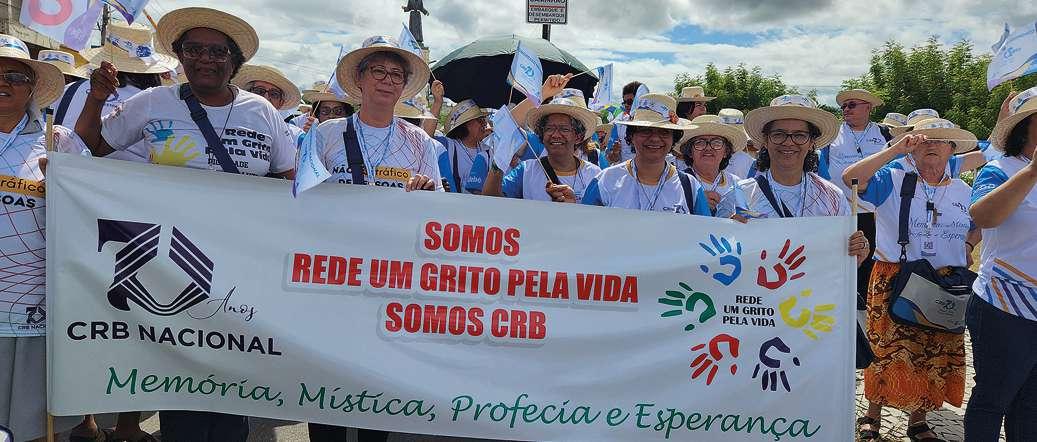
work alongside the most vulnerable people. In response to the increase in online exploitation we also made important steps in communication and all that social networks imply. Progress was made in direct attention to victims and survivors in shelters, such as in Argentina, Bolivia and Peru. Advocacy to governments and institutions to influence public policies took place primarily in Brazil, Peru and El Salvador. And of course, we continued to strengthen alliances and collaboration.
Day of Prayer and Awareness against Human Trafficking), March 23 (Stations of the Cross for the victims of trafficking), July 30 (World Day against Trafficking in Persons), September 23 (International Day against Sexual Exploitation and Trafficking of Women and Children), November 25 (International Day for the Elimination of Violence against Women and the anniversary of Talitha Kum’s Call to Action), December 10 (Human Rights Day, the day on which we launched the Manifesto).
Manifesto Against Human Trafficking
December 10, 2024
With great care, at the local level and continental levels (through CLAR), we carried out various activities and campaigns on February 8 (International
“There is no such thing as consensual trafficking.”
Manifesto Against Human Trafficking
December 10, 2024
ADVOCATING FOR CHANGE
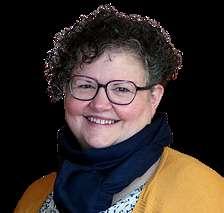
SR. ISABELLE COUILLARD, SGM
Regional representative of North America
SGM - Sisters of Charity of Montreal
North America
Advocacy is an essential strategic lever for influencing public policy, laws, and institutional practices to protect vulnerable populations and promote social justice. It relies on rigorous data and field expertise to raise collective awareness and encourage concrete and sustainable action.
For the Committee Against Trafficking in Human Beings (CATHII) in Canada, advocacy is an indispensable tool for raising public awareness, influencing policy, and strengthening legislative frameworks. It also helps to mobilize resources and implement concrete actions to protect victims and prevent exploitation in all its forms.
Following the submission sent by CATHII and the meeting with its partners and survivors with Mr. Tomoya Obokata, Special Rapporteur on contemporary forms of slavery, he published his report in 2024 stating that the Canadian temporary foreign worker program is a breeding ground for modern slavery due to a power imbalance that prevents workers from fully exercising their rights. This was a major boost to our ongoing postcard signing campaign advocating the Canadian government in favour of open permits and the abolishment of closed permits. CATHII also participated in Amnesty International’s research on migrant workers in Canada. They too seek the abolition of closed permits. Finally, our organization actively participated in the class action lawsuit authorized by the Superior Court of Quebec
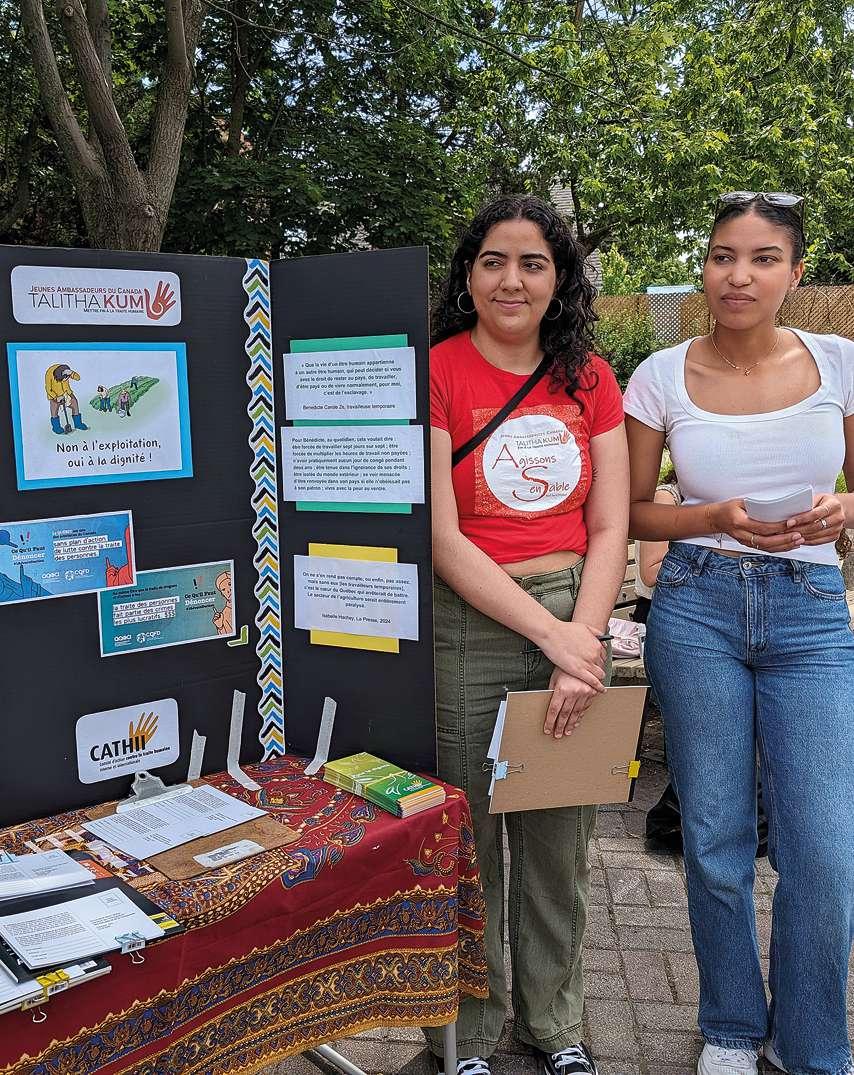
on September 13, 2024 to abolish closed permits in Quebec and Canada.
Together with the Montreal Union of Injured Workers, we have made representations to the court on behalf of workers injured on the job. We met with two Members of the Opposition of the Canadian Parliament and the Minister of Labour to advocate for reforms to the workplace injury legislation, so that it better reflects the realities and rights of temporary foreign workers.
The Alliance to End Human Trafficking, a network of religious sisters and their partners in the United States, regularly invites its members and partners to meet or write to their elected representatives in the Senate to bring about changes to specific laws. For example, one bill imposes penalties on those responsible for organ trafficking, provides for the revocation of the passports of individuals involved, and imposes criminal penalties
on offenders. The Alliance also promoted the Trafficking Survivors Relief Act introduced in Congress in January 2024, which would expunge trafficked persons of past convictions, thus facilitating their social reintegration. This Bill is still open in Congress.
Thanks to the mobilization of the Alliance to End Human Trafficking, federal funding for legal services for unaccompanied migrant children has been restored in the United States, ensuring their legal protection and reducing the risks of trafficking, abuse, and unfair deportation.
Advocacy remains one of the most effective levers for combating human trafficking on a large scale. The efforts of the Alliance to End Human Trafficking, CATHII, Talitha Kum, and their partners illustrate the power of collective mobilization to demand reforms and protect vulnerable populations.
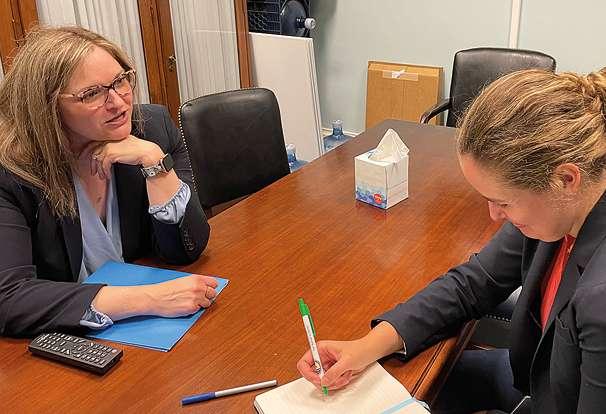
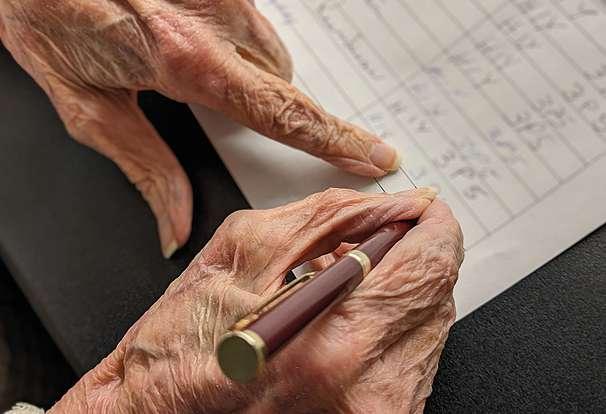
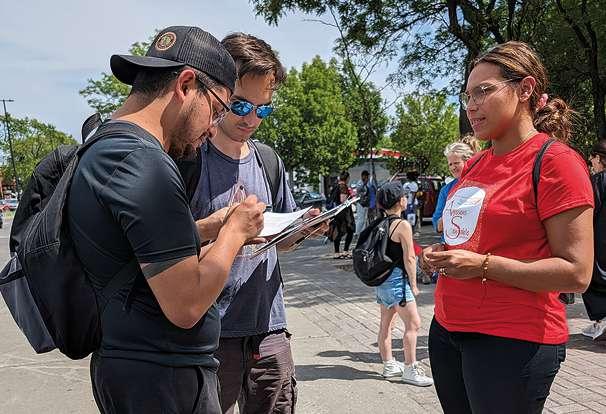







AMERICA
Talitha Kum networks across the Americas (South, Central, and North America) strengthened the fight against human trafficking through prevention, care for victims and survivors, access to justice, networking, and advocacy. Efforts empowered women, engaged transport workers, and educated communities via workshops, social media, and schools. Survivors received care through economic and emotional support. Access to justice improved through legal guidance and national hotline promotion. Networking grew through inter-institutional, ecumenical, and regional collaboration—most notably, a strong partnership with CLAR’s anti-trafficking initiative. Advocacy included contributions to Brazil’s National Plan and network in Canada’s engagement tools, ensuring an effective and unified continental response.





PEOPLE REACHED IN 2024
VICTIMS / SURVIVORS SUPPORTED
PROTECTION CARE FOR VICTIMS-SURVIVORS
The numbers indicate the people reached through the different areas of activity in 2024.
REGIONAL COORDINATIONS
CLAR- COMISION TRATA CLAR
CONTINENTAL COORDINATIONS
Emisferic Coordination (North, Central and South America)
9 STRENGTHENING COLLABORATION AND EXPANDING IMPACT

SR. PAULA KWANDAO PHONPRASERTRUKSA, SPC
Regional representative of Asia
SPC Sisters of Saint Paul of Chartres
Asia
In 2024, Talitha Kum Asia made significant progress in strengthening collaboration both within and beyond its continental network . To further strengthen collaboration, Talitha Kum Asia established a hub coordination framework – much like a spider web –ensuring that our mission reaches all corners of the continent.
Recognizing the importance of effective communication across Asia’s cultural, social, and language diversity, Talitha Kum Asia organised Englishlanguage training to enhance internal communication. Since English is a widely spoken global language, it plays a crucial role in uniting members and supporting the network’s coordinated efforts.
Talitha Kum Asia also strengthened its partnerships with key faith-based organizations such as the Federation of Asian Bishops’ Conferences (FABC), the Major Superiors Conference, Caritas Asia, as well as various NGOs and government entities. Members actively participated in the Freedom Forum (August 6-8, 2024)
in the Philippines and other advocacy conferences to amplify the call to end human trafficking.
Collaboration among national networks played a crucial role in 2024. Numerous victims across Asia were supported through the joint efforts of Talitha Kum Indonesia, Japan, and the Philippines. Networks in India, the Philippines, Indonesia, and Myanmar offered holistic survivor care, including psycho-social spiritual integration, health-focused rejuvenation sessions, and traumainformed assessments. Additionally, they provided safe spaces for survivors of online sexual exploitation. Plans are underway to establish dedicated shelters across Asia to ensure comprehensive, long-term support for survivors.
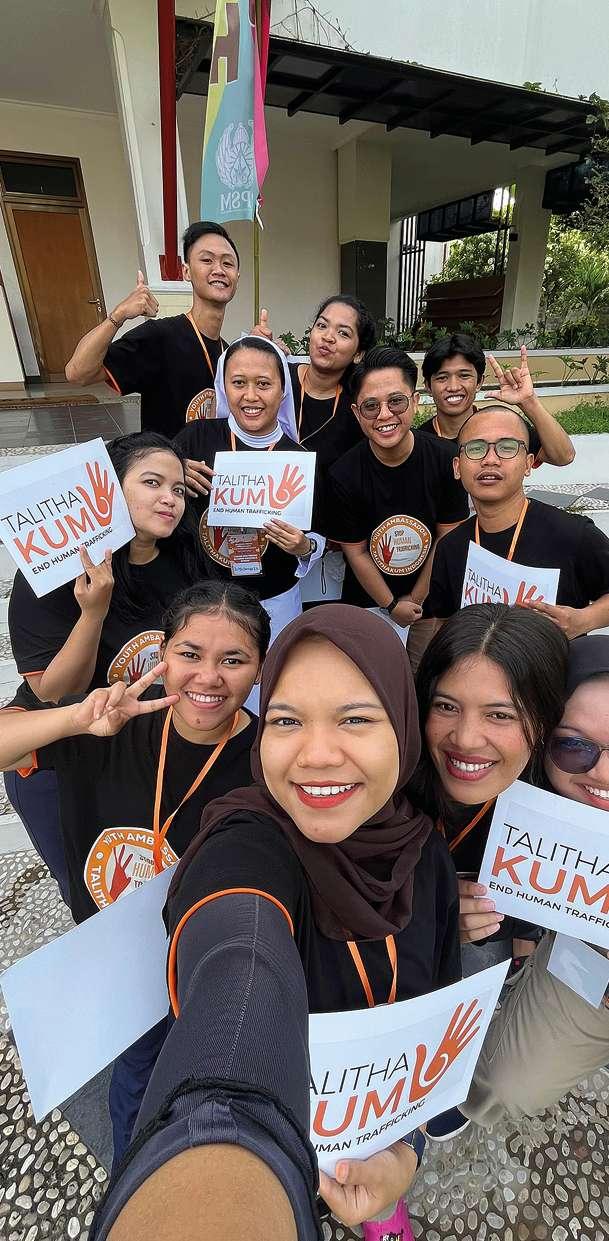
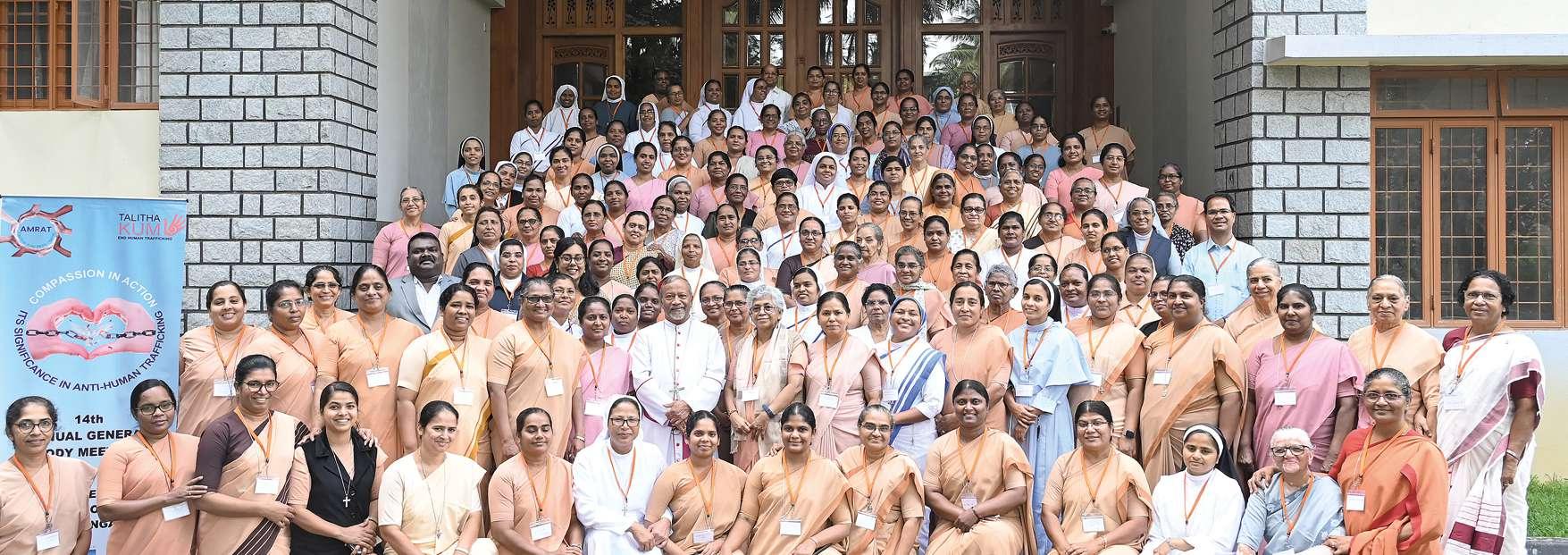
Youth engagement remained a priority . Each national network continued Youth Ambassador training programs, empowering young people to become community leaders and raise awareness about human trafficking at the grassroots level and beyond. Youth Ambassadors from Japan built a sustainable structure to grow their group and continued community outreach. Similar efforts took place in Bangladesh, Indonesia, India, the Philippines, Taiwan,
Thailand, and Vietnam. A new cohort of youth leaders was trained to lead creative awareness campaigns, particularly addressing trafficking through social networks – a growing threat in the digital age.
Another key highlight on the national level was Talitha Kum Sri Lanka’s expanded collaboration with the Conference of Major Religious Superiors (CMRS), local NGOs, and government agencies
to strengthen efforts in rescuing and accompanying survivors of human trafficking.
There is still much work ahead . Talitha Kum Asia remains committed to expanding our “spider web” of collaboration to prevent new cases of human trafficking, reduce the number of victims, and accompany survivors on their journey to restore their dignity as beloved children of God.













ASIA
Talitha Kum Asia advanced its mission through prevention, care for victims and survivors, access to justice, networking, and advocacy. Awareness campaigns in Japan, Vietnam, and Taiwan engaged youth, schools, businesses, and the public to prevent labour exploitation and support migrant workers. Survivors received care in India and Japan through safe spaces, counselling, and hotlines. In South Korea, legal action led to compensation in a rare trafficking case. Networking in Thailand and Korea expanded reach through collaboration with civic and church institutions. Advocacy efforts challenged systemic abuse, promoted survivor voices, and sought to instill truth and justice across the region.
PEOPLE REACHED IN 2024 284429 REGIONAL COORDINATIONS
The numbers indicate the people reached through the different areas of activity in 2024.
Talitha Kum East Asia
Talitha Kum South Asia
Talitha Kum South East Asia
10 NAVIGATING CONFLICTS
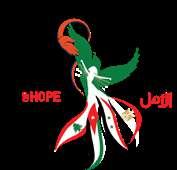
WELLS OF HOPE
Middle East
In 2024, the region of the Middle East faced severe political instability , a devastating war and acts of ethnic cleansing. These crises have deepened social collapse and displacement, leading to a significant increase in human trafficking cases. Wells of Hope in Lebanon, Syria, Jordan, and Egypt continue tirelessly to respond to the immense challenges in the region, despite overwhelming needs and limited resources.
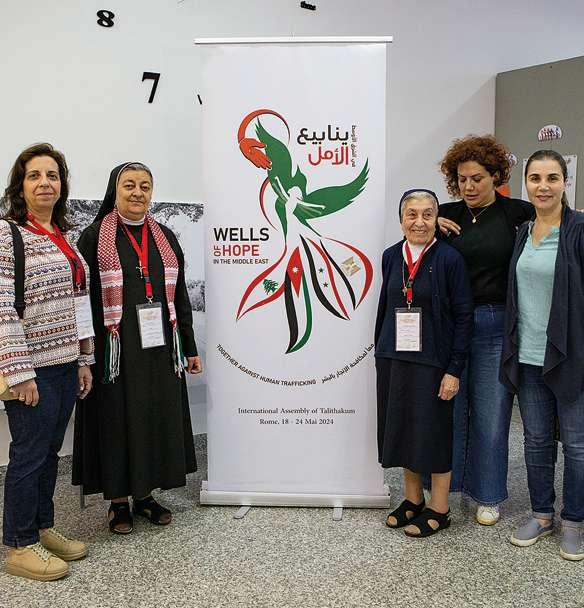
Following the escalation of Israeli strikes in September of 2024, a member of Wells of Hope Lebanon shared: “The situation on the ground has led to large numbers of civilians being displaced. Many left their homes with their families at midnight and moved to safer places such as the sea shore. Many are not finding collective shelters nor homes, and are staying on the streets. According to the United Nations Office for the Coordination of Humanitarian Affairs, more than one million people were uprooted from their homes due to Israel’s attack.”
Wells of Hope Lebanon responded to the calls of many displaced people asking for help and support, offering shelter, clothes, medicine, and accompaniment. More specifically, in Lebanon, following the Israeli attacks, Trauma Healing Protection Sessions were organized for displaced women and children in various shelters across the country . The sessions employed visualisation techniques to support psychological healing and recovery.
Throughout 2024, numerous awareness sessions were conducted across the region , reaching out to diverse groups
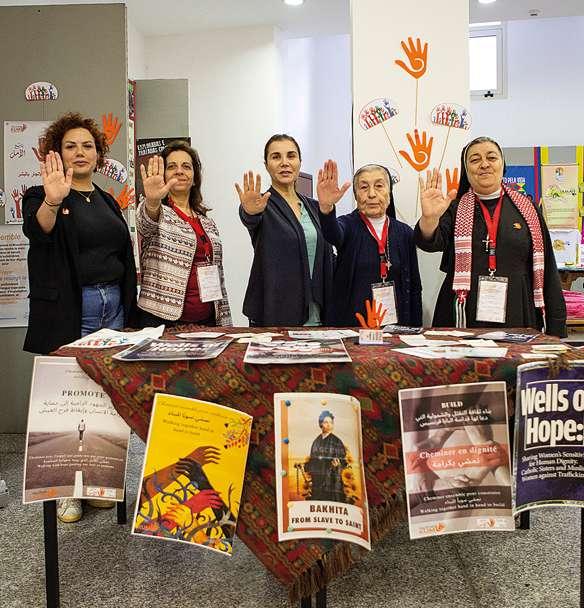
and nationalities, with a particular focus on women and girls who are the most vulnerable to trafficking. At-risk people and survivor accompaniment activities included individual consultation sessions for Lebanese, Syrian, Palestinian, and Ethiopian women in need of social and psychological support. These sessions aim to enhance the women’s selfesteem, help them create personalized action plans, and guide them toward vocational training opportunities. Several empowerment projects were conducted, providing professional training in hairdressing, manicure, and makeup –skills that open the door for long-term financial sustainability.
A close collaboration between each network in the Middle East, through monthly meetings in which members support each other, share contacts and good practices, has been essential to effectively address human trafficking in the region.
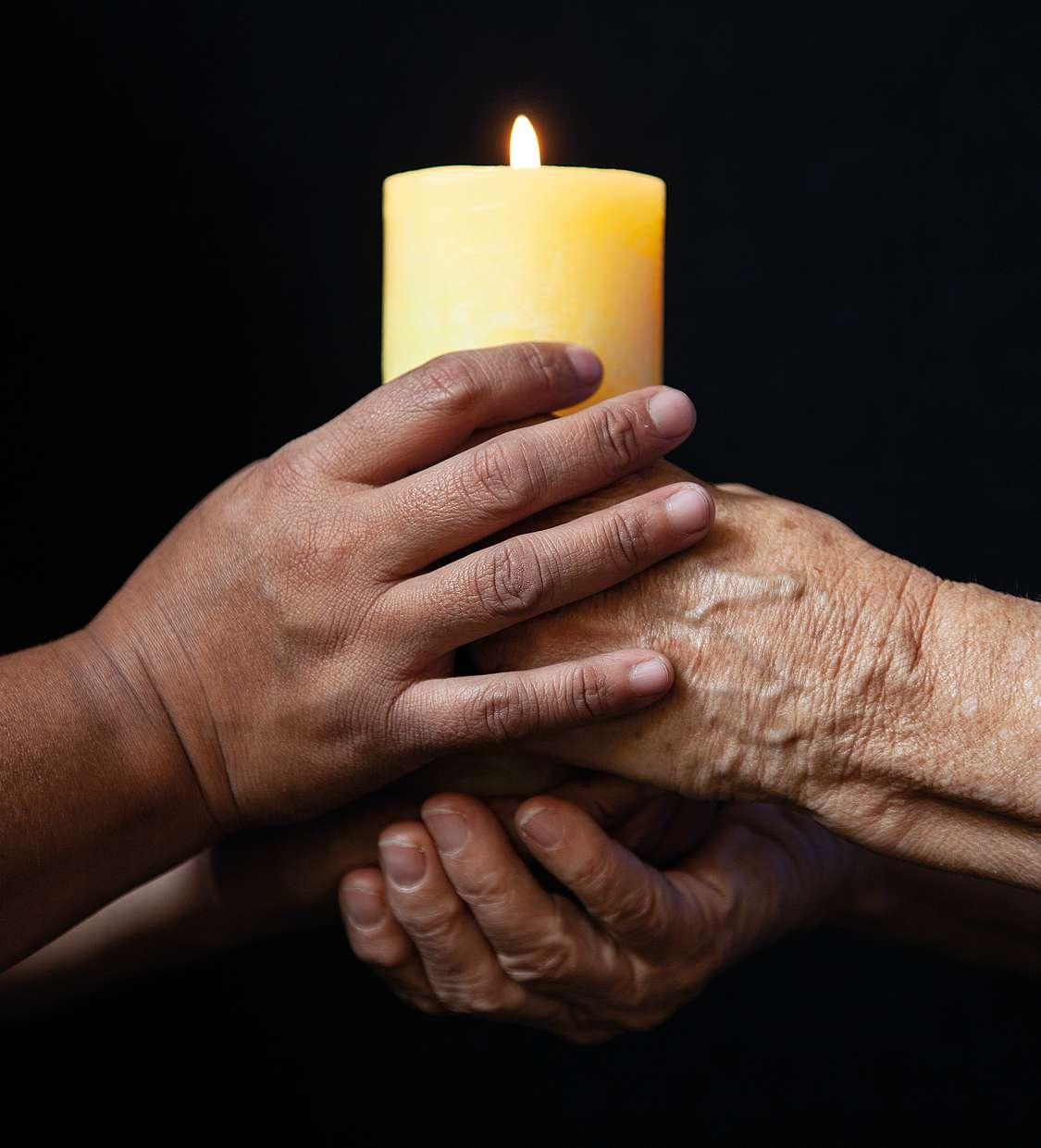
© Lisa Kristine

















MIDDLE EAST
Wells of Hope networks in the Middle East advanced prevention, care for victims and survivors, access to justice, networking, and advocacy. Talitha Kum Egypt educated young girls about media risks linked to trafficking. Despite ongoing regional conflicts, Yanabia’ El’amal Lebanon responded to war-driven displacement with trauma healing sessions and training programs empowering women and girls. They also provided direct care to vulnerable women and children. Efforts in Syria focused on addressing trafficking risks during conflict. In Jordan, collaboration with religious congregations promoted child rights awareness. Strengthened networking through member engagement enhanced the region’s capacity to tackle challenges in the area of trafficking.


The numbers indicate the people reached through the different areas of activity in 2024.
COORDINATIONS Yanabia’ El’amal (Wells of Hope)
11 IDPAAHT 2024 EMPOWERING THE YOUTH
Listen, Dream and Act against Human Trafficking: Youth Engagement in 2024
On the occasion of the 10th edition of the International Day of Prayer and Awareness Against Human Trafficking (February 2- 9, 2024), 45 youth representatives of partner organizations, from 22 countries, gathered in Rome. The week was organized around the official theme’s three verbs: Listen, Dream, Act. The week was a continuation of the 2023 meeting, when 15 youth representatives met and together wrote the Call to Action from Young People to Journey in Dignity. Once again in 2024 on the occasion of the Day of Prayer’s 10th anniversary, the youth representatives expressed joy and gratitude to be able to meet in Rome, learn more about and ask others to act against human trafficking.
Highlights of the week included an online meeting with more than 150 youth participants from around the world;
sharing testimonies; participating in an awareness raising flash mob and prayer vigil at Santa Maria in Trastevere; attending a General Audience and Angelus with Pope Francis; and an online pilgrimage with an official written message from Pope Francis in which he declared, “I associate myself wholeheartedly with all of you around the world, especially the young, who are working to combat this global scourge.”
The main aim of the week was to empower the 45 youth participants through open dialogue and sharing of good practices. They returned home feeling ready to pursue their fight against human trafficking:
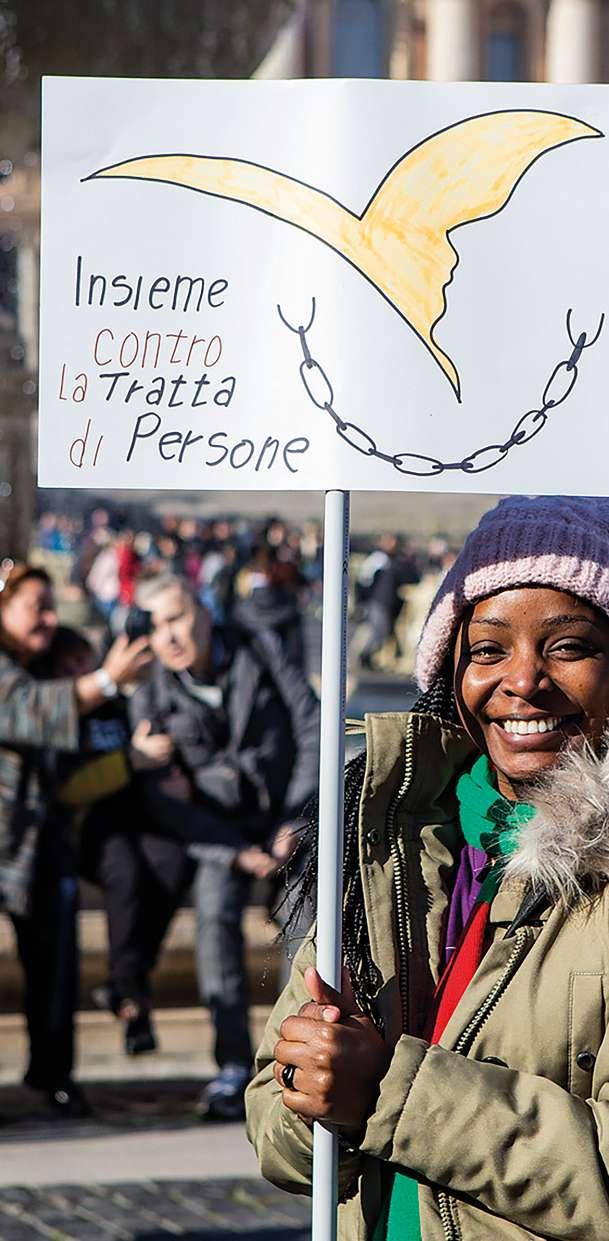
“Meeting young people who are very openminded to share their stories, experiences and work about human trafficking and personal lives was awesome. ”
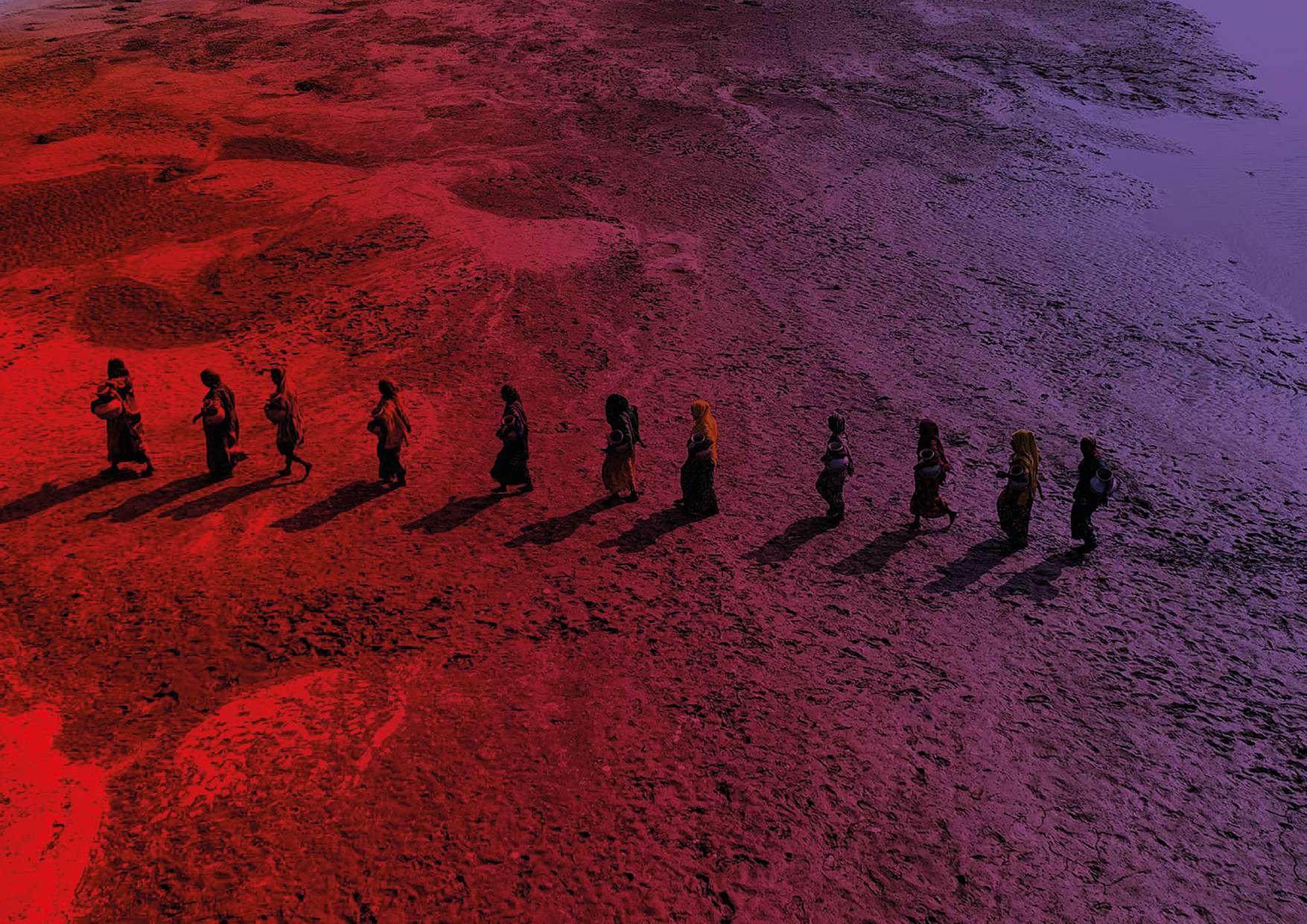
© Asaf Ud Daula - Emotions to Generate Change
“What I take from this week is the word ‘Together’. Sometimes, I feel alone in the fight against human trafficking, I wonder whether what I do is good, whether it has an impact. But this week, I felt that together, we can do it!”
“I look forward to changing my engagement and commitment. I want to work hard and mobilize other young people to fight human trafficking.”
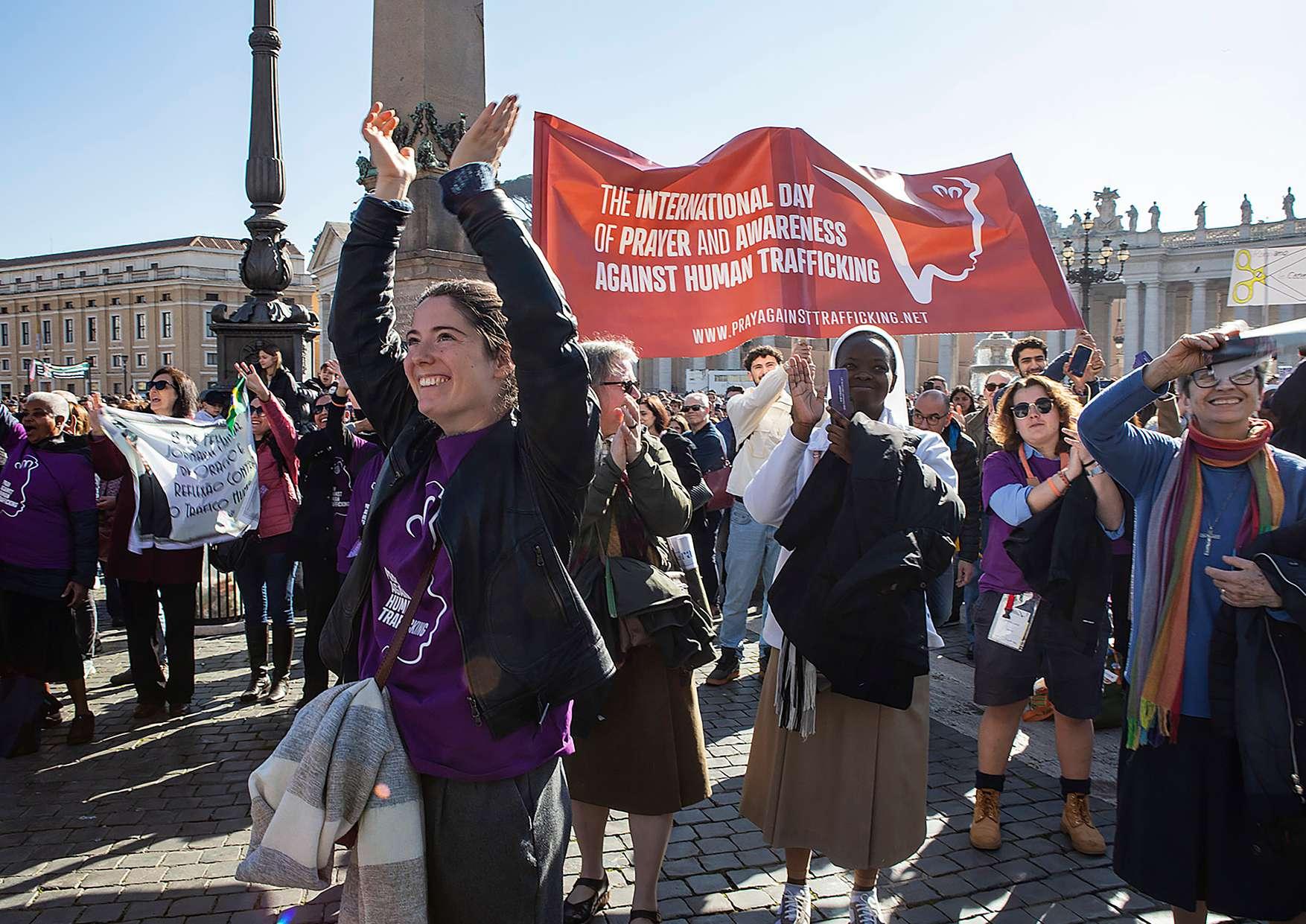
© Margherita Simionati-TK-UISG
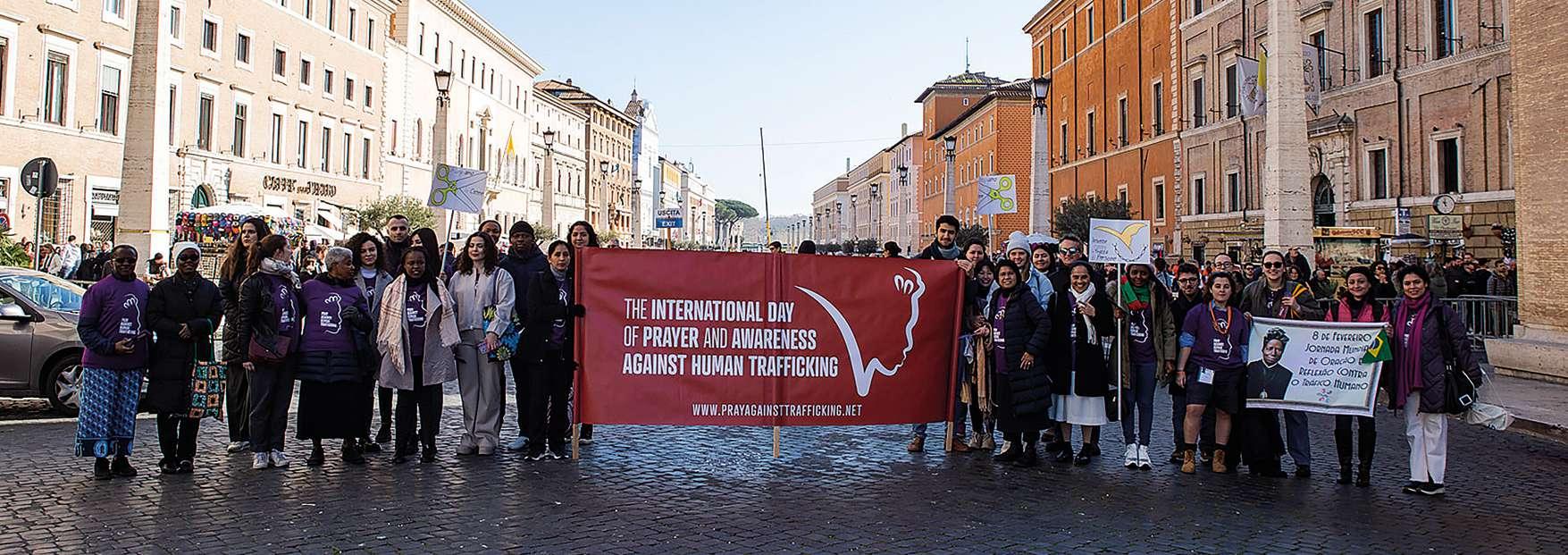
In addition, in 2024, the Youth Ambassadors program was launched in Africa and 56 Youth Ambassadors received training in French and English. These youth ambassadors organized awareness-raising activities among their peers around February 8 th, Saint Bakhita Day, in 11 countries: Burkina Faso, South Sudan, Kenya, Mali, Morocco, Nigeria, Tanzania, Togo, Zambia, Cameroon, and Zimbabwe. They reached 14,800 young people through this effort.
This experience confirmed the “success story” of the Youth Ambassadors program in Asia and Latin America as applicable in Africa as well. Since access to a stable internet connection is a challenge in Africa most of the activities were planned physically. Support in the form of 4G keys was provided for the online training so each participant could attend online sessions. In the African context, face-to-face events planned in schools, parishes, marketplaces, etc., using printed and graphic materials (e.g. T-shirts, flyers, etc.) for greater visibility, is the most effective peer-to-peer awareness-raising method.
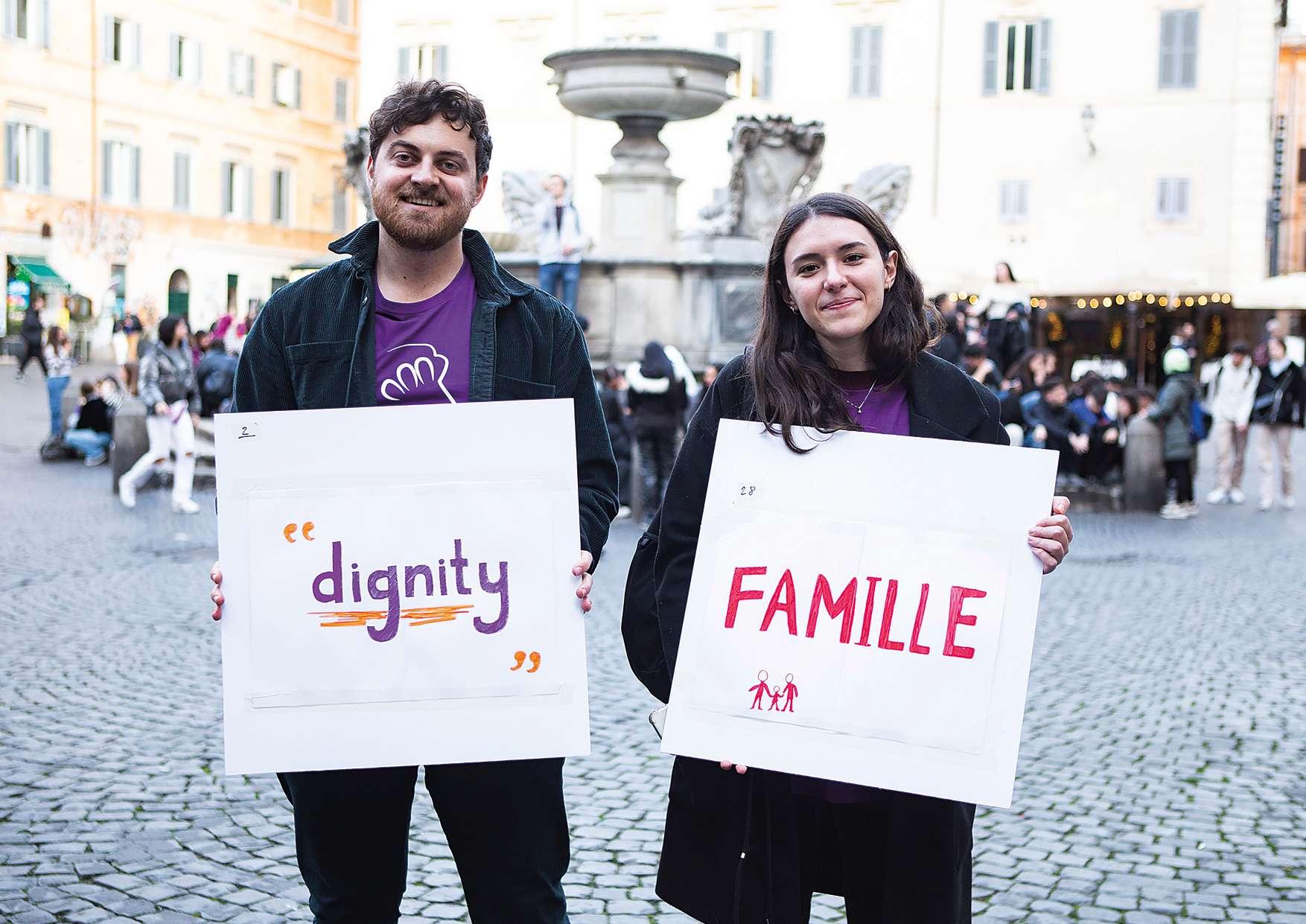
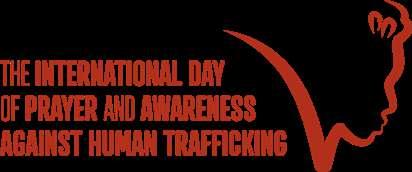
THE NETWORK OF THE INTERNATIONAL DAY
The International Day of Prayer and Awareness Against Human Trafficking (IDPAAHT) is coordinated by Talitha Kum. The 2024 edition was promoted by the International Union of Superiors General (UISG) and the Union of Superior Generals (USG), in collaboration with the Dicastery for Promoting Integral Human Development, the Dicastery for Communication, the Dicastery for Institutes of Consecrated Life and Societies of Apostolic Life, the Pope's Worldwide Prayer Network, Caritas Internationalis, CoatNet, the Focolare Movement, the Jesuit Refugee Service, the International Union of Catholic Women's Associations (WUCWO), JPIC- Anti-Trafficking Working Group (UISG/ UISG), The Clewer Initiative, the Community Association Pope John XXIII, the International Federation of Catholic Action, the Italian Catholic Guides and Scouts Association (AGESCI), the Community of Saint Egidio, the Santa Marta Group, and many other organizations worldwide.
ORGANIZATIONAL PARTNERS FOR THE DAY +1 FROM 2023
PARTICIPATED IN PRAYER VIGIL IN ROME
DIOCESES, RELIGIOUS COMMUNITIES, INTER-RELIGIOUS GROUPS THROUGHOUT THE WORLD ORGANIZED a prayer vigil against human trafficking
COUNTRIES FROM EVERY CONTINENT
on YouTube
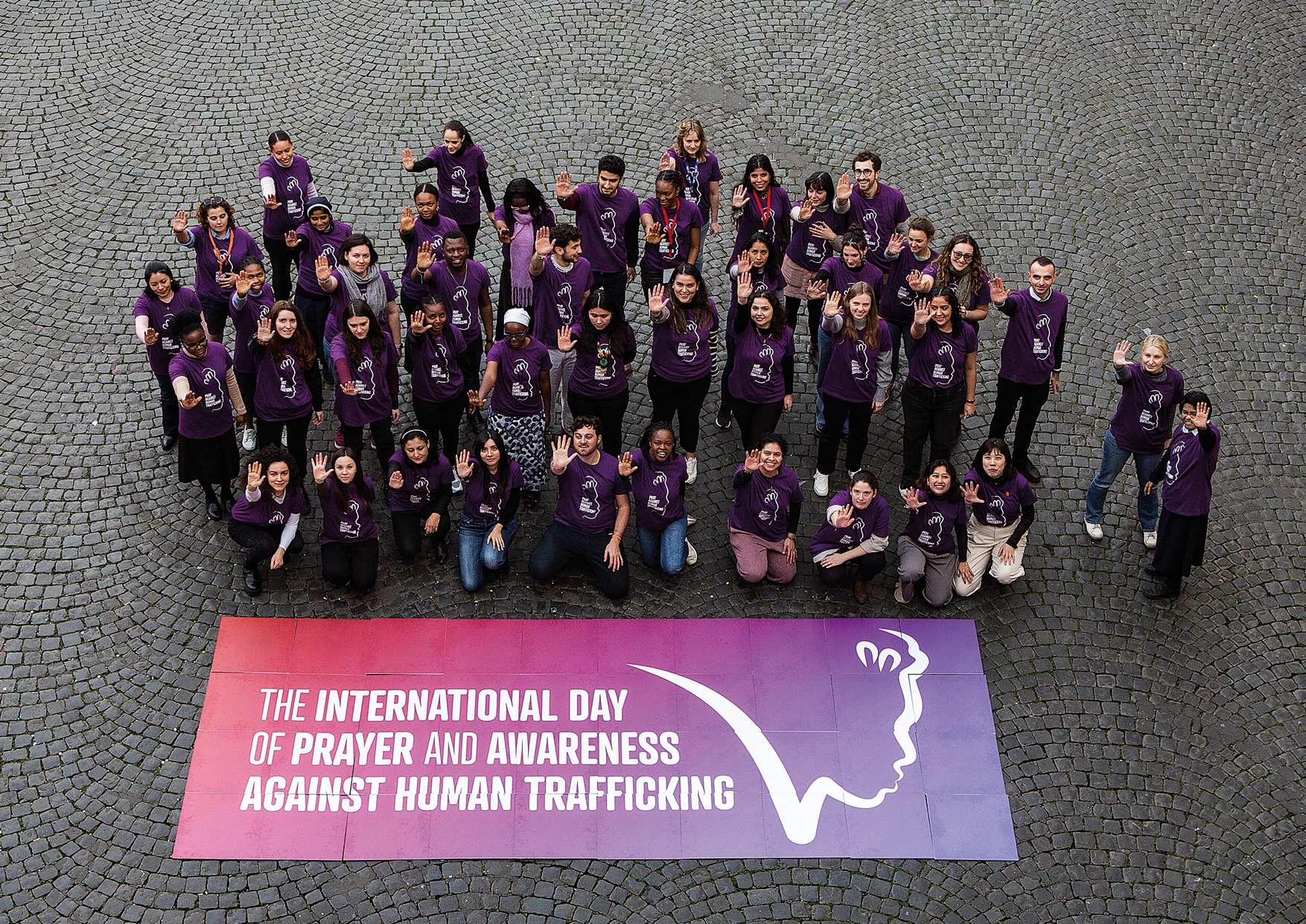
12 INSPIRING STORIES AND BEST PRACTICES FROM 2024
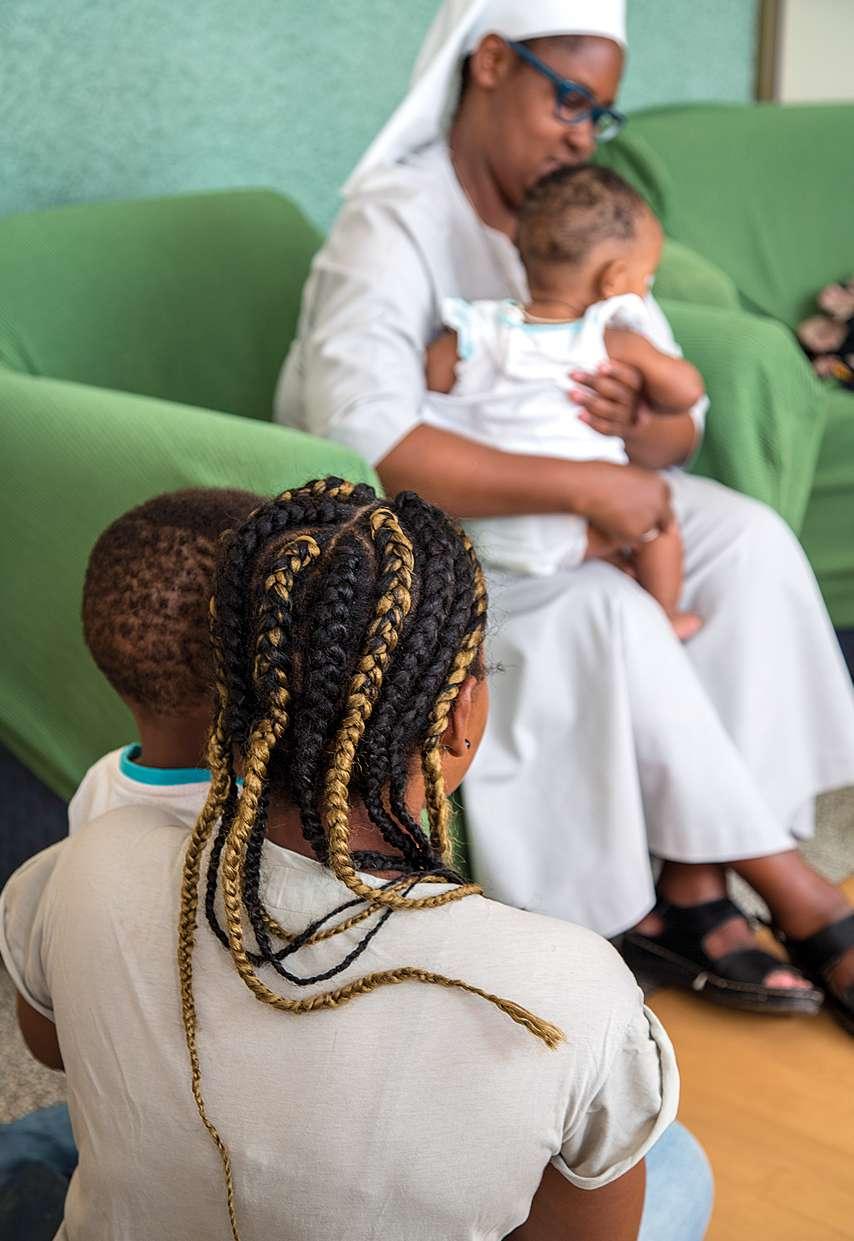
STORY OF INSPIRATION Networking and Collaboration
The Loreto Sisters Eastern Africa , member of Talitha Kum Kenya, are making an impact in the fight against human trafficking in the Gishagi informal settlement of Kangemi. Their project brings together everyone— from community volunteers and paralegals, to police and local leaders—to protect vulnerable people, especially asylum seekers, refugees, and those with disabilities.
Between March 2023 and 2024, their awareness campaigns shining a light on the dangers of trafficking reached nearly 12,000 people. They also helped rescue and reintegrate 19 survivors, supporting them with education, healthcare, and safe housing, while honouring their privacy and dignity.
The collaborative partnership with Counter Human Trafficking Trust-East Africa (CHTEA) in Nairobi for safe housing and counselling exemplifies the strong networking and collaboration emphasized in the 2nd General Assembly of Talitha Kum (2024) . What makes this effort stand out is its spirit of true collaboration, and demonstrates what members worldwide committed to working together can do when they focus on survivor-centred care and strong partnerships. The Loreto Sisters’ work is a perfect example of how communities can be a catalyst for real change—healing lives and challenging the roots of trafficking with hope and action.
GRACE’S TESTIMONY
Grace escaped her traffickers in Dubai, seeking help from a local church.
There she was connected to the Sisters of Talitha Kum in Nigeria. Talitha Kum offers courses in catering, tailoring, and hairdressing to help survivors regain independence.
After 7–8 months at Bakhita Villa, Grace started her own catering business to support her family. She says, “With their help and prayers, the Sisters gave me the courage to stand on my own.
” Now, while running her business, Grace is pursuing a degree in nutrition on scholarship. She remains close to the Sisters, saying, “I’m filled with joy and gratitude every time I think of them.”
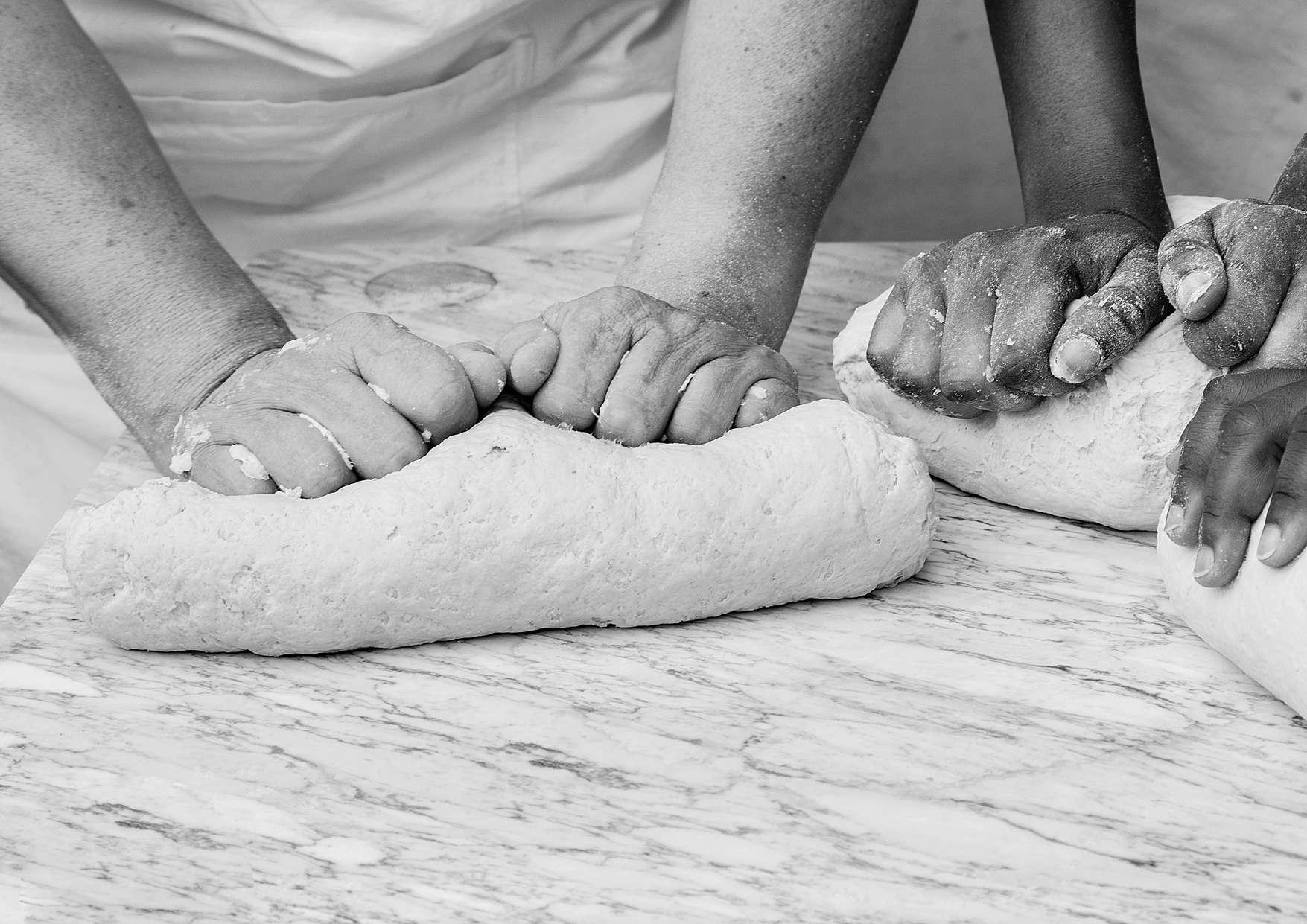
“Her story encourages us to keep going, showing there is hope for all survivors.”
A Sister from Bakhita Villa shared.
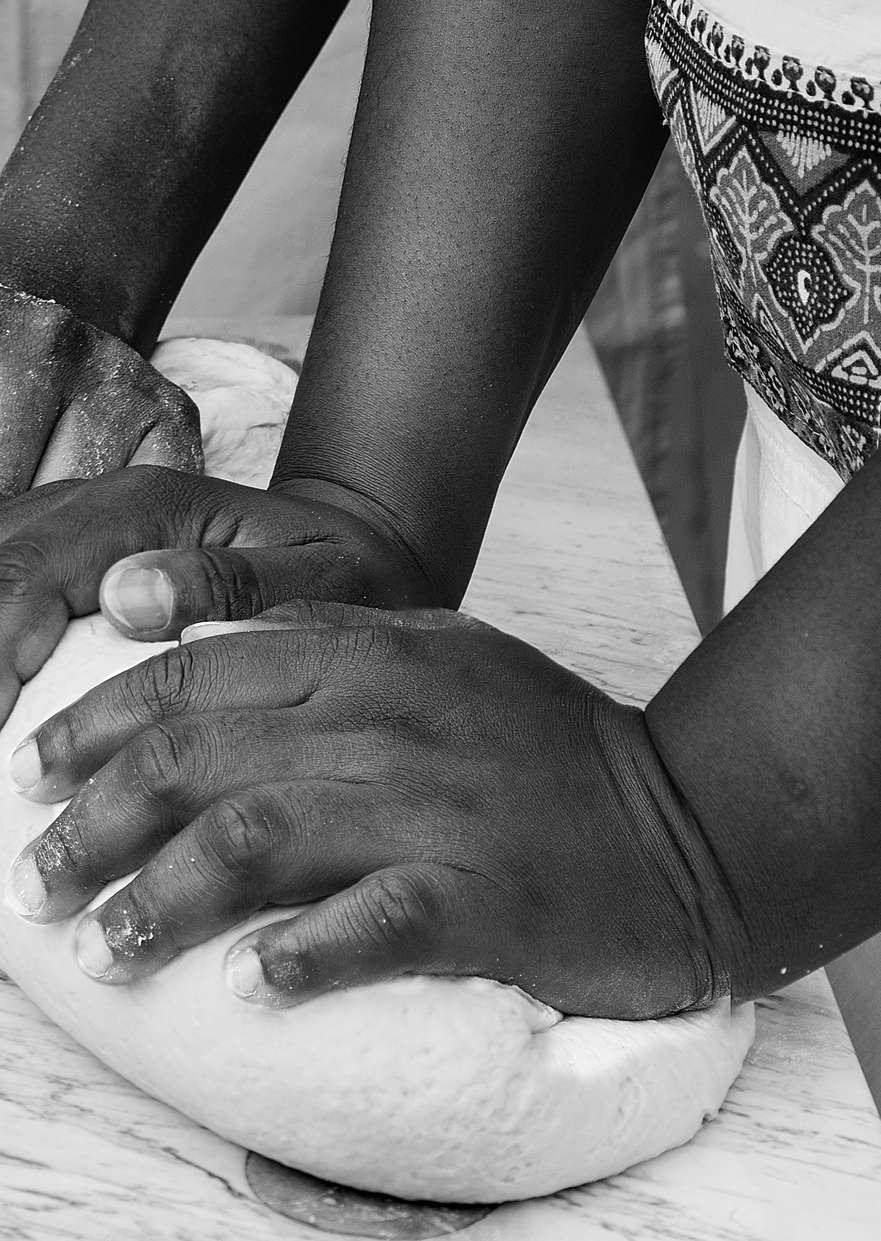
© Lisa Kristine
STORY OF INSPIRATION
Systemic Advocacy and Empowerment
The story of Grace, a survivor of human trafficking in Nigeria, is a powerful testament to the transformative impact of the Sisters of Talitha Kum. Their holistic approach not only aids in individual recovery but also advocates for systemic change to combat human trafficking.
Talitha Kum’s “Call to Action” outlines a comprehensive strategy to address human trafficking. This includes:
• Legal and Social Support: Advocating for state-supported legal services, non-punishment clauses for victims, and access to justice.
• Economic Empowerment: Promoting equal access to education, vocational training, and job opportunities for women and survivors.
• Restorative Justice: Implementing procedures that facilitate healing and reintegration for survivors.
• Global Collaboration: Encouraging partnerships among states, international organizations, civil society, and the private sector to dismantle structures that allow exploitation.
Talitha Kum: Sharing Some Good Practices Around the Globe in 2024
Protection
Talitha Kum Burkina Faso made significant progress in repatriating survivors to their home countries or cities, prioritizing reunification in safe and familiar environments. Given limited shelter resources, the focus was directed to providing long-term care and legal support for survivors facing state challenges.
In Brazil, Um Grito Pela Vida distinguished itself through sustainability training and economic empowerment programs, alongside capacity-building initiatives that trained local agents and authorities to identify trafficking patterns. This facilitated direct connections between victims and experts, reducing the risk of further exploitation.
In Oceania, ACRATH delivered trauma-informed, one-on-one support through trained companions, nurturing essential social connections that support survivors’ successful reintegration.
Prevention
Con PAHT (Ghana) and Talitha Kum Thailand led powerful community and school-based awareness campaigns, empowering vulnerable children, youth, and local leaders to recognize, prevent, and report trafficking—in the hopes of disrupting traffickers’ recruitment tactics.
ACRATH (Oceania) engaged youth leaders and utilized social media outreach to educate at-risk populations, strengthening prevention efforts through collaboration between government and education sectors.
Public advocacy efforts in Africa, Canada, and Brazil played a crucial role, using radio and TV campaigns alongside social media to broaden outreach—reaching over 401,000 people in the Americas and 23 million in Africa.
In the Americas, CATHII (Comité d’action contre la traite humaine internet et internationale) leveraged films and public dialogues to raise awareness about issues affecting Temporary Foreign Workers (TFW), fostering community engagement and informed advocacy.
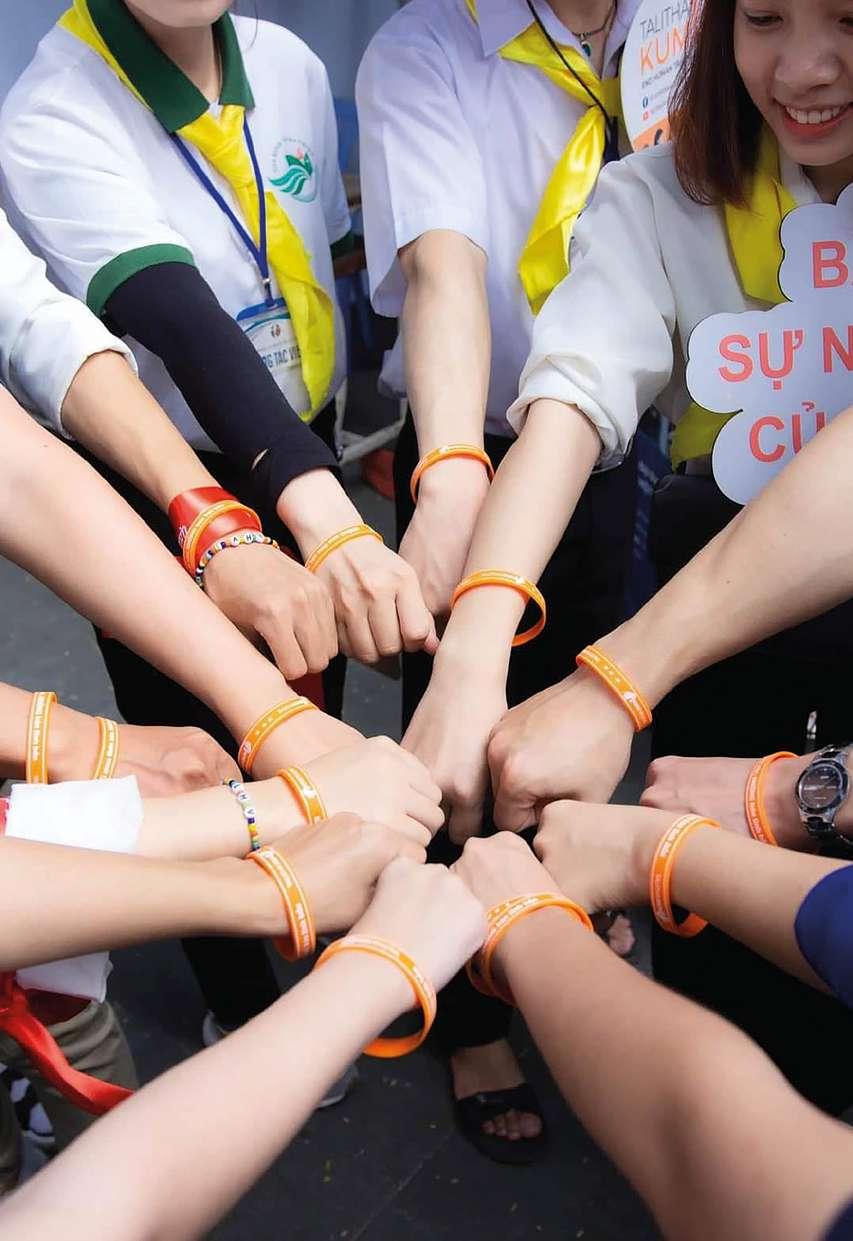
Prosecution/Networking
AMRAT – Talitha Kum India concentrated on sensitizing and educating local authorities and professionals on human trafficking and exploitation issues. This increased awareness bolstered prosecution efforts and ensured survivors received vital emotional and legal support, contributing to more effective rescue operations and the pursuit of justice.
While only a few cases have been reported under prosecution, the efforts to denounce trafficking cases and support victims throughout the judicial process are encouraged. This requires strong network assistance.
One case highlights best practices at work between AMRAT Talitha Kum India and the network in Nigeria in ensuring effective legal assistance, rehabilitation and repatriation.
It involved the repatriation of a young, educated woman from Nigeria trafficked to India. Upon arrival in India she realized she was trapped in a trafficking situation. She was rescued through a collaborative intervention, and went through the legal process with the support of a committed advocate.
Simultaneously, with support through counseling and accompaniment, she experienced emotional healing, enabling her to see the world with renewed hope. Eventually she was repatriated, completing the transformation from being trapped and trafficked to regaining newness of life through freedom.
13 HIGHLIGHTS
Second Talitha Kum General Assembly and Celebration of 15 years of the Talitha Kum Network
Journeying Together to End Human Trafficking: Compassion in Action for Transformation. This was the theme of the second Talitha Kum General Assembly (TKGA), held from May 18th to May 24th, 2024 in Rome. Facilitated in 5 languages, the TKGA gathered 153 delegates and participants from 71 countries representing Talitha Kum’s 60 networks. The gathering also marked Talitha Kum’s 15th anniversary.
“I was overwhelmed with the sharing of survivor stories and the challenges that they faced. Their stories brought to light the reality of exploitation in many forms.”
In the spirit of journeying together, the TKGA was preceded by a grassroots listening process across its global network. Every network organized listening sessions in preparation for the TKGA. Thus, the stories, voices and reflections of its members , both experienced and new, religious and laity, young and old contributed to creating a global synthesis.
On May 22nd, the delegates approved the Final Declaration of the 2nd TKGA , laying out three new priorities for 20252030:
1. Systemic change in the face of new vulnerabilities
2. Holistic, survivor-centred approach
3. Broadening collaboration and partnerships
Using the synodal method of Conversation in the Spirit was pivotal. It allowed participants to listen deeply to each other and to the Holy Spirit speaking in them to enhance the path of discernment and decision-making. Unique to this General Assembly was the first-time inclusion of Youth Ambassadors and Survivors as Assembly delegates. They too had space to voice their concerns and opinions.
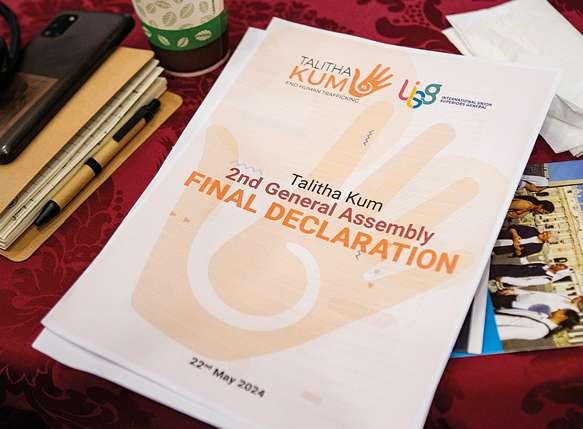
“The youth presence and energy stirred me greatly and sparked great hope for the future. Their passion, intelligence, commitment and solidarity with each other together with their openness to the whole group was inspiring.”
This TKGA ended with the celebration of Talitha Kum’s 15 th anniversary and a moment of thanksgiving for key people who have contributed to its growth. A celebration of its members’ diversity through skits, plays and songs was also included.
“I encourage you to continue on this path, furthering prevention and care, and weaving together many valuable relationships that are indispensable in order to combat and defeat trafficking.”
Pope Francis’s Message for Talitha Kum’s 15th Anniversary
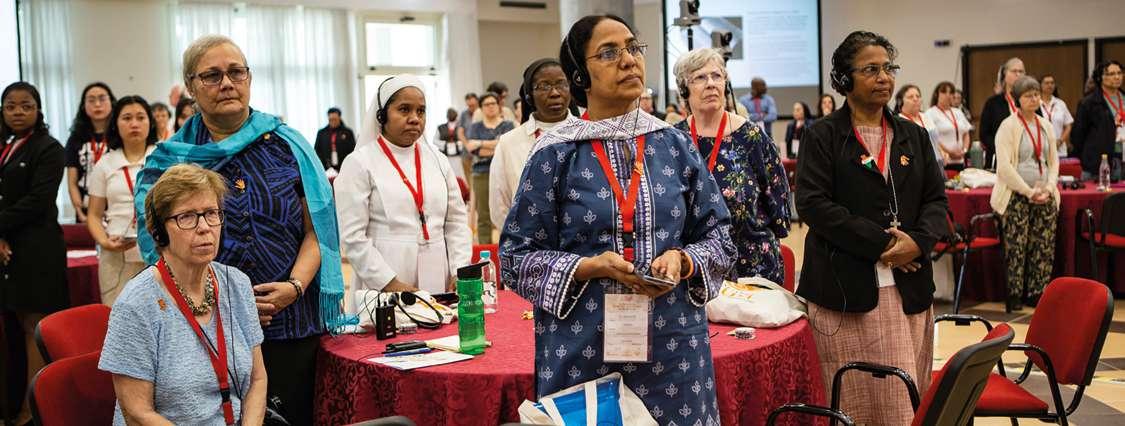
© Margherita Simionati-TK-UISG
The delegates who attended were tasked with bringing back to their network what they experienced and learned, committing to the priorities decided upon together, and deepen the sense of belonging to Talitha Kum. As they share:
“Being alongside delegates from 71 countries, and in the presence of survivors, youth ambassadors, and donors, truly stirred my heart.
Fueled by the Holy Spirit, my commitment deepened to enact real change and provide compassionate support to survivors.”
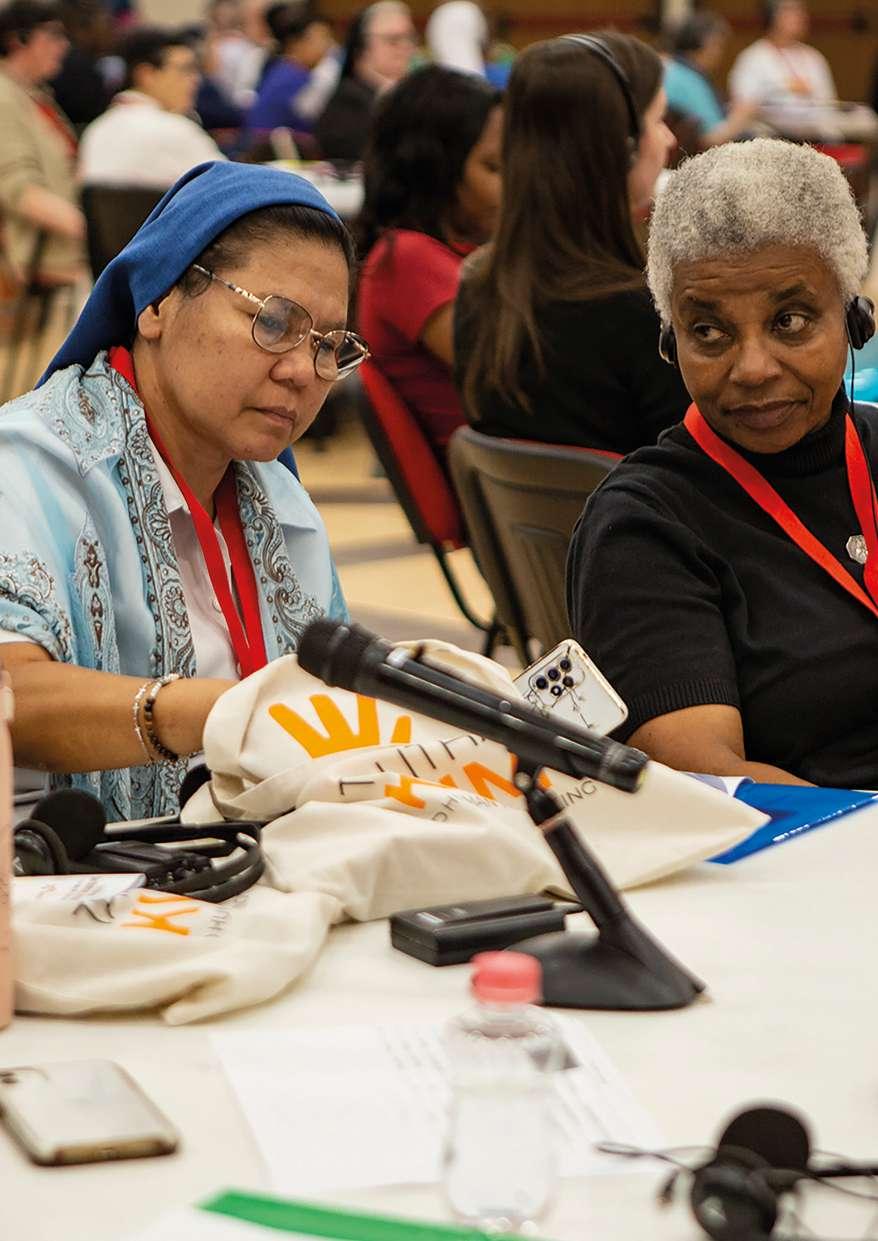
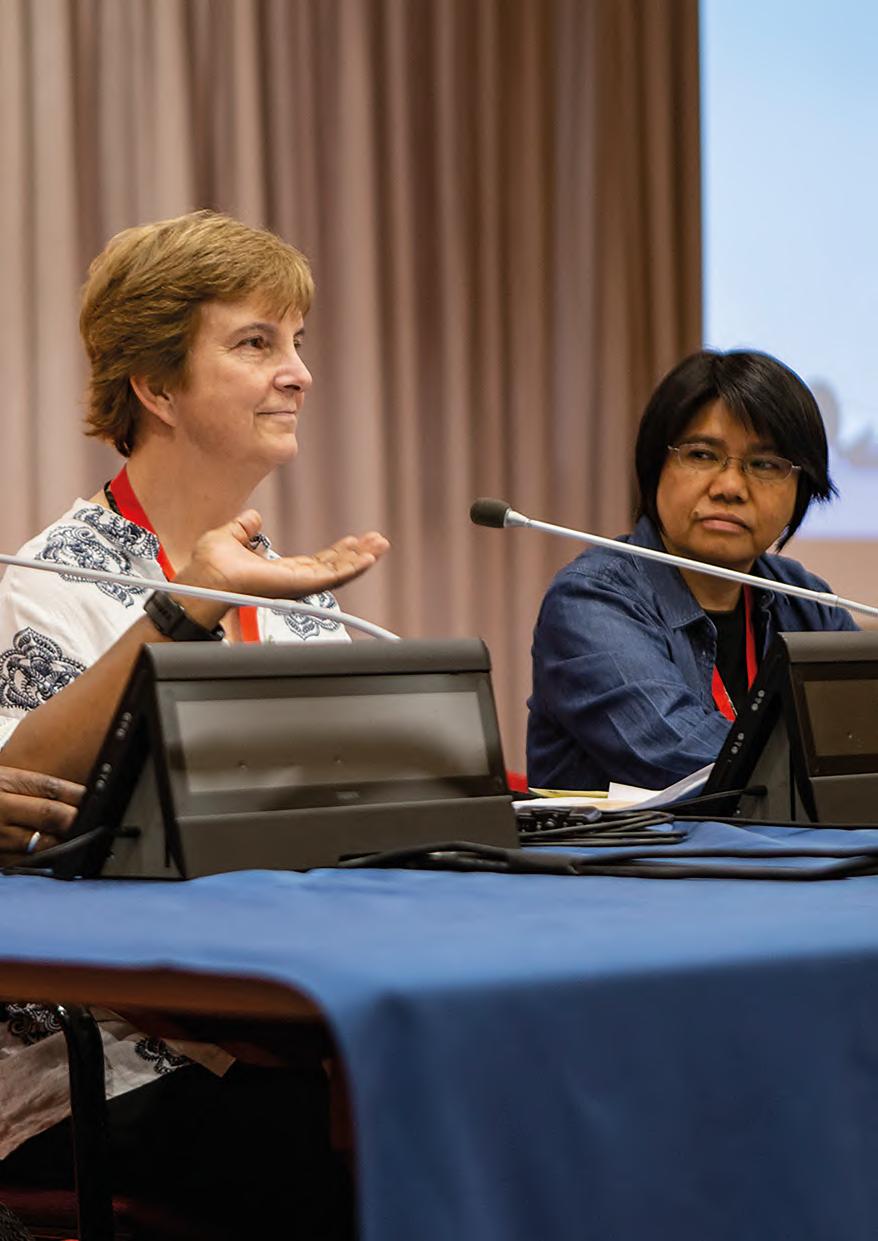
“There was a palpable sense of God’s presence throughout the General Assembly. There was hope in the determination to address the root causes of human trafficking: demand, greed and corruption.”
“What I experienced at the Second Talitha Kum GA fills me with energy to renew my personal and community commitment to continue strengthening global efforts to confront human trafficking and support survivors.”
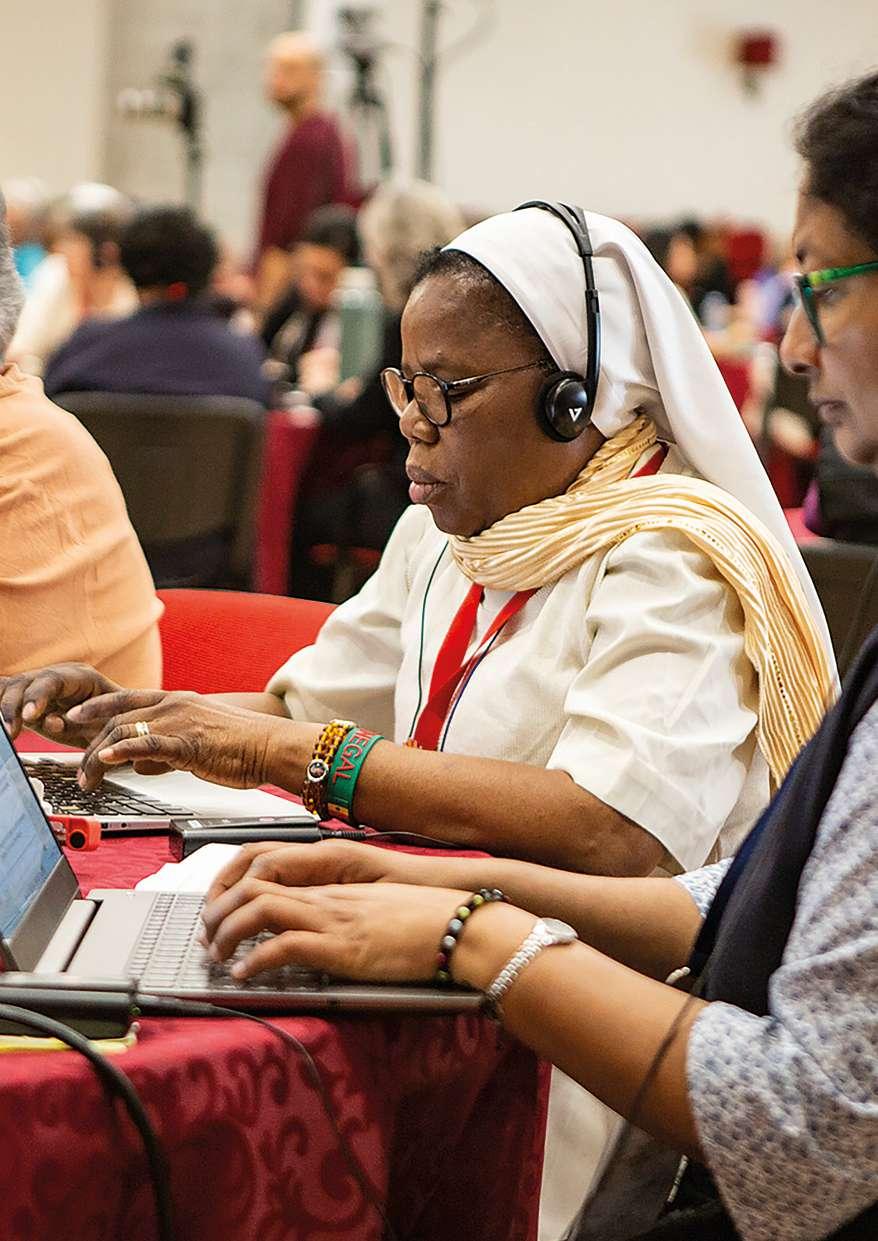
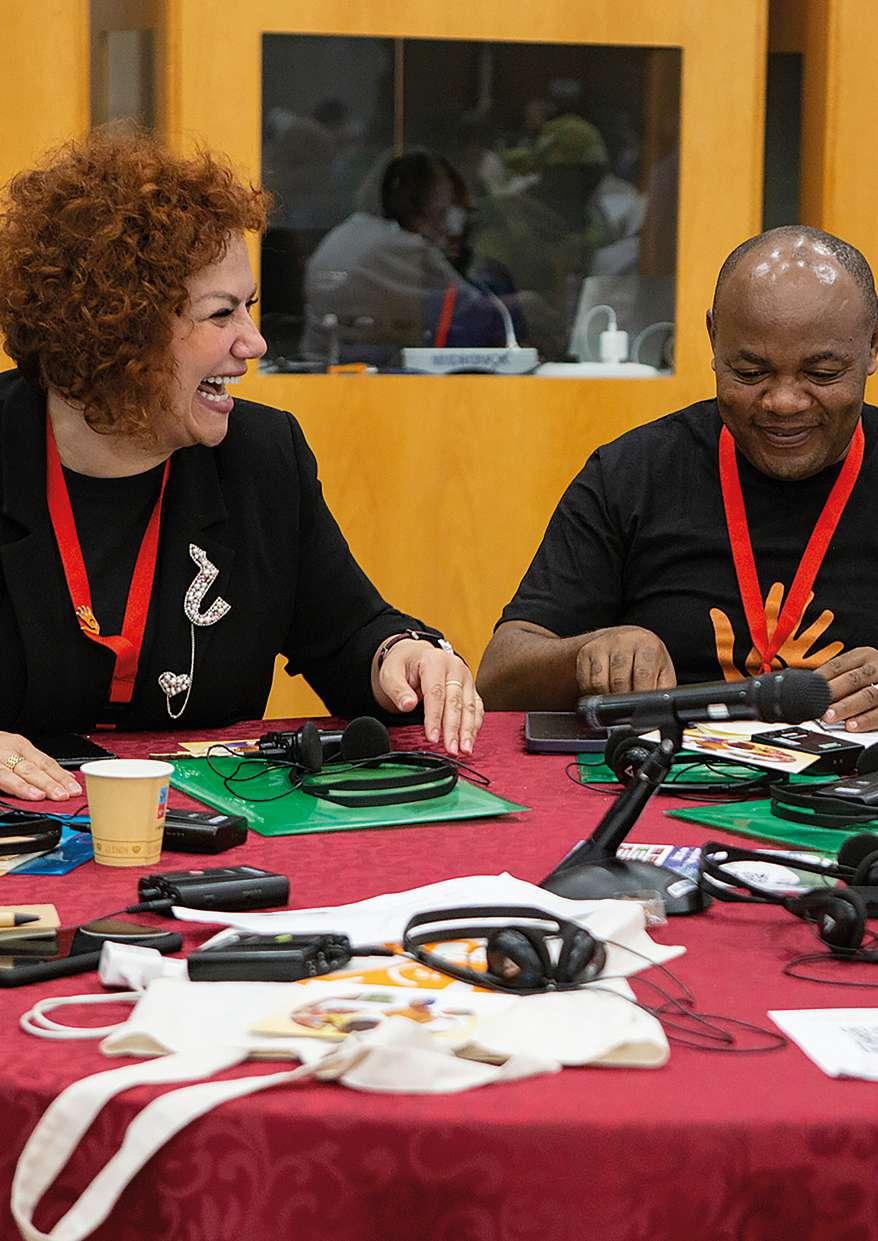
“[The delegates] went home with the fire burning in their heart to end human trafficking. It was really a good journey that transformed our hearts to have more compassion with our brothers and sisters who are trafficked.
Together we can end this evil from our world.”
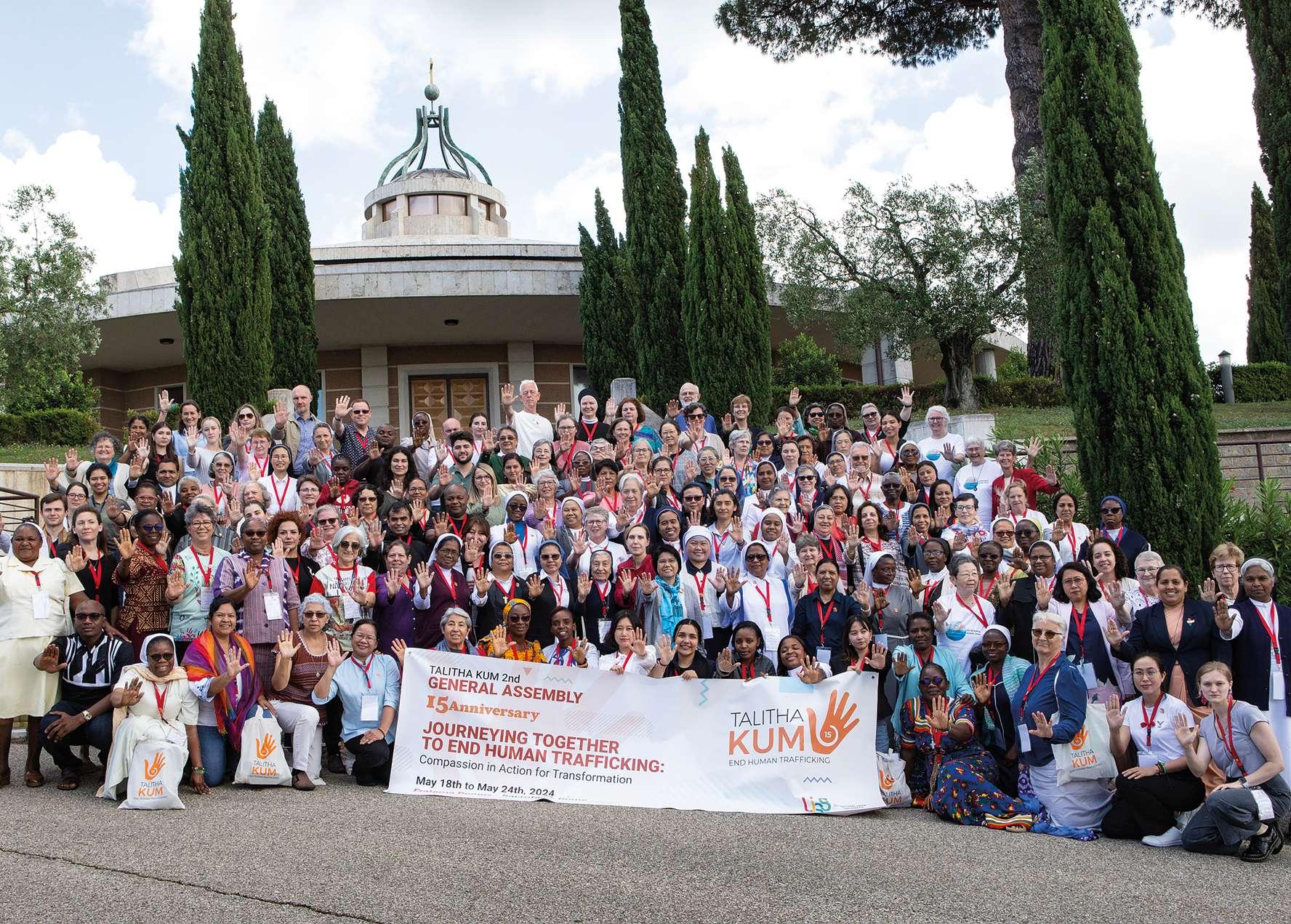
The Walking in Dignity App
Talitha Kum developed the innovative Walking in Dignity app with the collaboration of its Youth Ambassadors. It was launched on January 30, 2024. The app combines wellness and awareness in an educational, youth-focused, and interactive manner. Interactive features empower and educate its primary target audience of 16–35-year-olds. Users who reach a certain number of steps can unlock educational content regarding human trafficking, including its causes, effects, and community efforts for eliminating it. By showcasing local efforts across nations, it demonstrates to its users how their little everyday actions might lead to systemic change. In this way, the app also promotes a sense of global empathy and unity.
The app literally encourages users to take steps in support of victims of trafficking, drawing inspiration from Talitha Kum’s goal to advance prevention, protection, and the rehabilitation of survivors. Users receive one token for each 1,000 steps they take. These tokens can then be
donated to actual, survivor-led antitrafficking initiatives worldwide. Donors match these tokens, transforming regular exercise into concrete financial assistance for international human trafficking projects.
Walking in Dignity is a Call to Action rather than simply a fund-raising platform or fitness tracker. Users in over 95 countries around the world have collectively walked over 150,000 kilometres, raising more than 200,000 tokens for anti-trafficking projects. Thanks to this global effort, by the end of 2024, 9 of 14 projects had reached their donation goals, helping Talitha Kum continue its mission of supporting local communities and raising awareness about human trafficking.
Dowload the app
+95
COUNTRIES AROUND THE WORLD
150,000
KILOMETERS
PROJECTS HAD REACHED THEIR DONATION GOALS 9/14
200,000
TOKENS FOR ANTI-TRAFFICKING PROJECTS
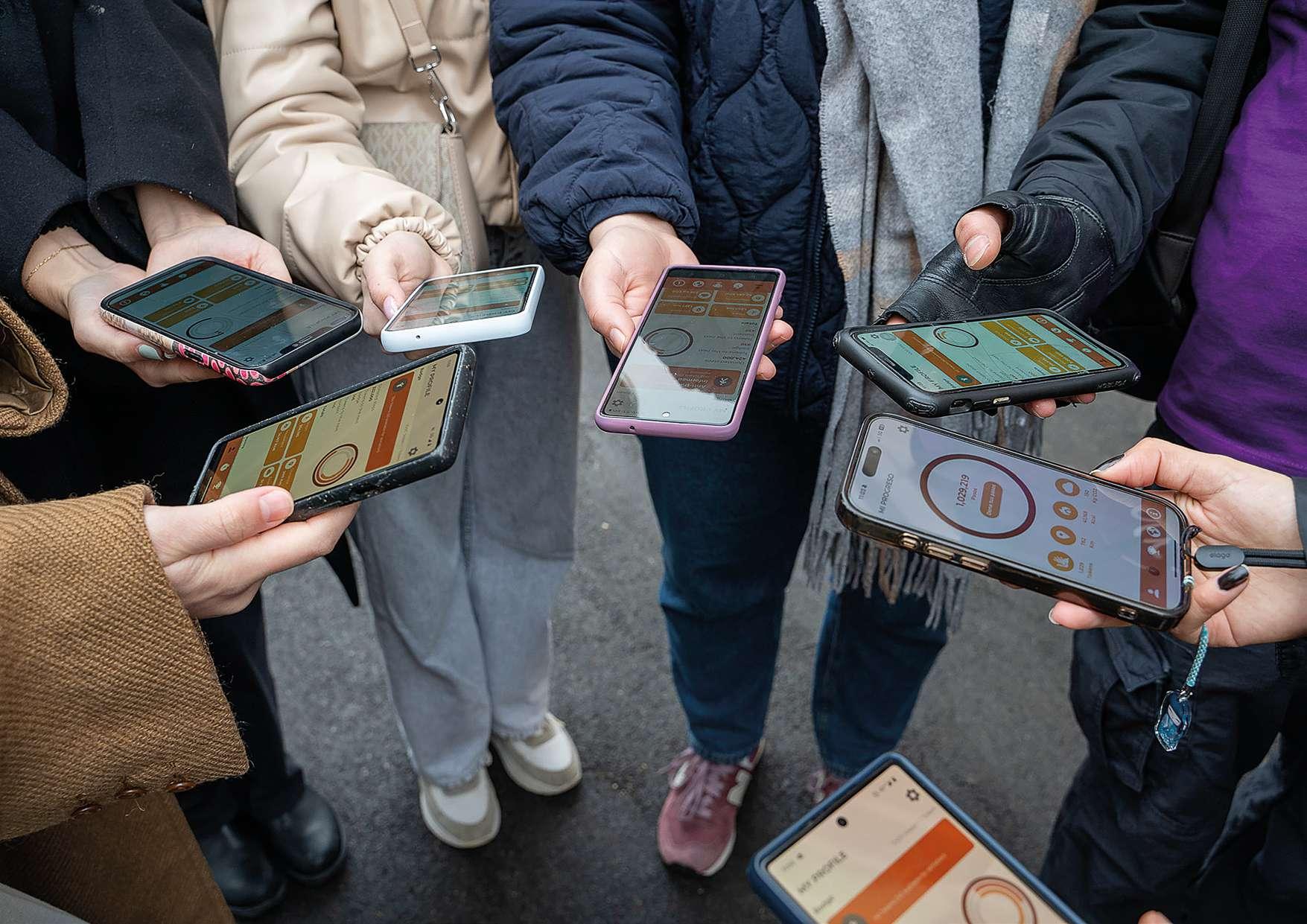
5th edition - Talitha Kum Leadership Training Course (2024-2025): Weaving New Paths of Growth and Solidarity
Talitha Kum’s leadership formation continues to expand and evolve, taking into account a global perspective. The fifth edition of our leadership training was a meaningful milestone, providing a dynamic space for learning, reflection, and connection. Rooted in collaboration, it reaffirmed the importance of joining hands to build a network of passionate, courageous leaders committed to serving others and finding creative ways to combat the scourge of human trafficking.
The residential training, which took place in Peru, carried a particularly meaningful dimension.
A hallmark of the fifth edition was the intentional emphasis on the involvement of the Latin American Spanish-speaking group, whose strong
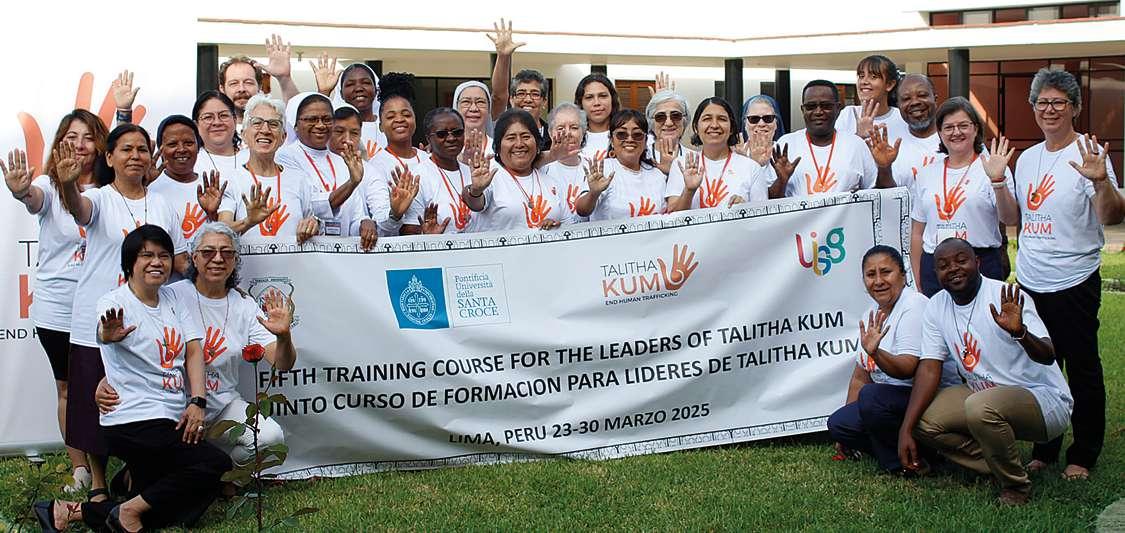
presence greatly enriched the experience for everyone. Their level of dedication, passion, and unwavering commitment to combating human trafficking was not only evident but also profoundly inspiring. This collective spirit became a source of mutual empowerment and solidarity, weaving together a broad, supportive network rooted in trust, compassion, and shared mission.
Indeed, a net was cast and woven with passion , love , and total trust in God walking alongside us . It beautifully affirms the wisdom that true leadership is about discerning how and when to weave the net together creating connections that strengthen and sustain our shared efforts.
The Talitha Kum Leadership Formation organized in collaboration with Talitha Kum International, the Pontifical University of the Holy Cross (Rome), and Tangaza University College (Nairobi), this program of the Talitha Kum Leadership Formation aimed to enhance and foster more leaders within the Talitha Kum network. It stands as a testament to our shared commitment to cultivating transformative leadership for systemic change.
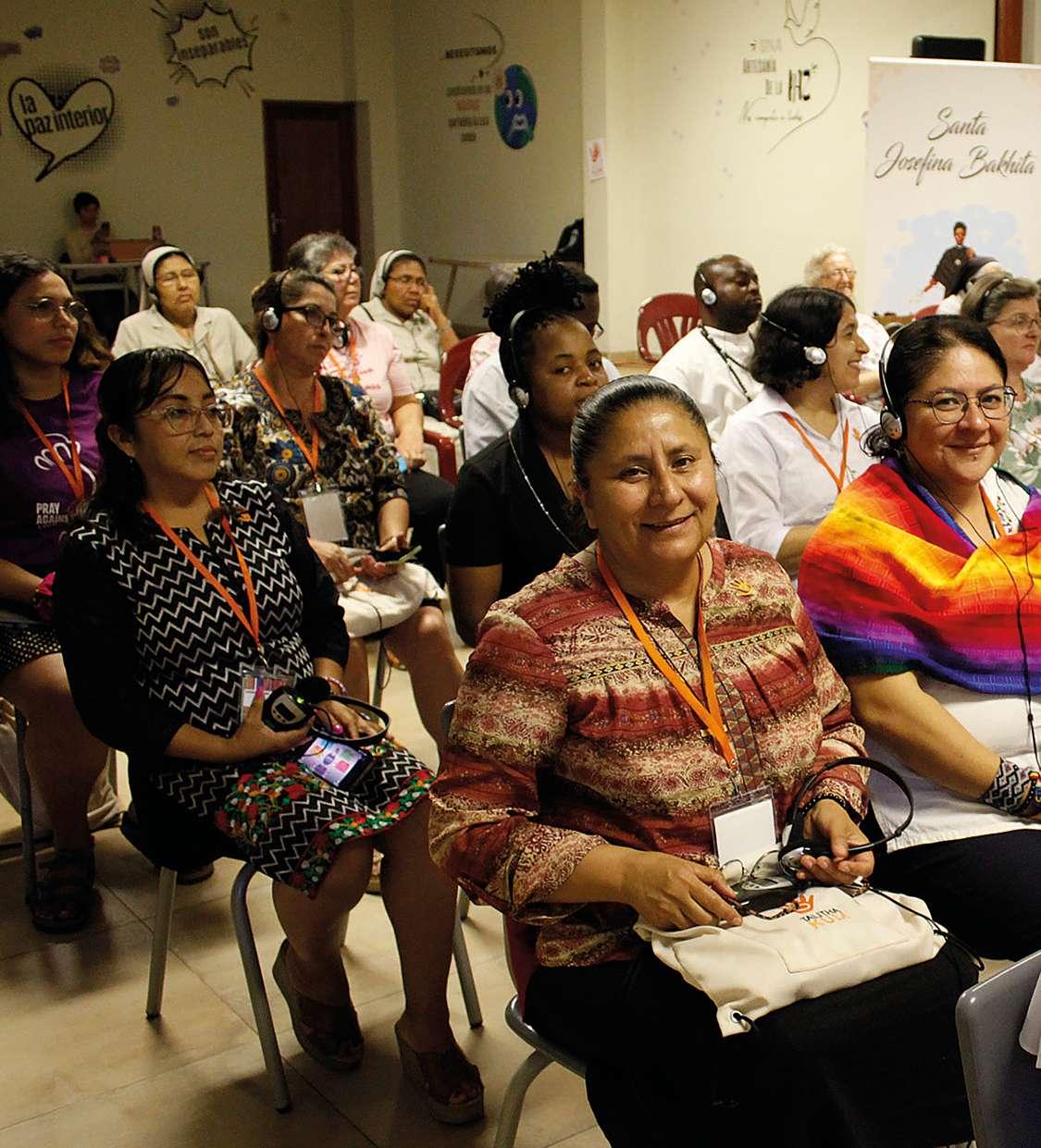
14 RECOGNITION FEATURES
2024 Recognition Features
We are deeply honoured to highlight the remarkable work of the Sisters dedicated to combating human trafficking. Their unwavering commitment and compassionate service have earned well-deserved local and international recognition throughout 2024. These acknowledgments reflect the profound impact of their efforts to restore dignity, hope, and care to survivors. Their courage and perseverance, embodying true leadership and compassion in action, continue to inspire and strengthen the global fight against trafficking.
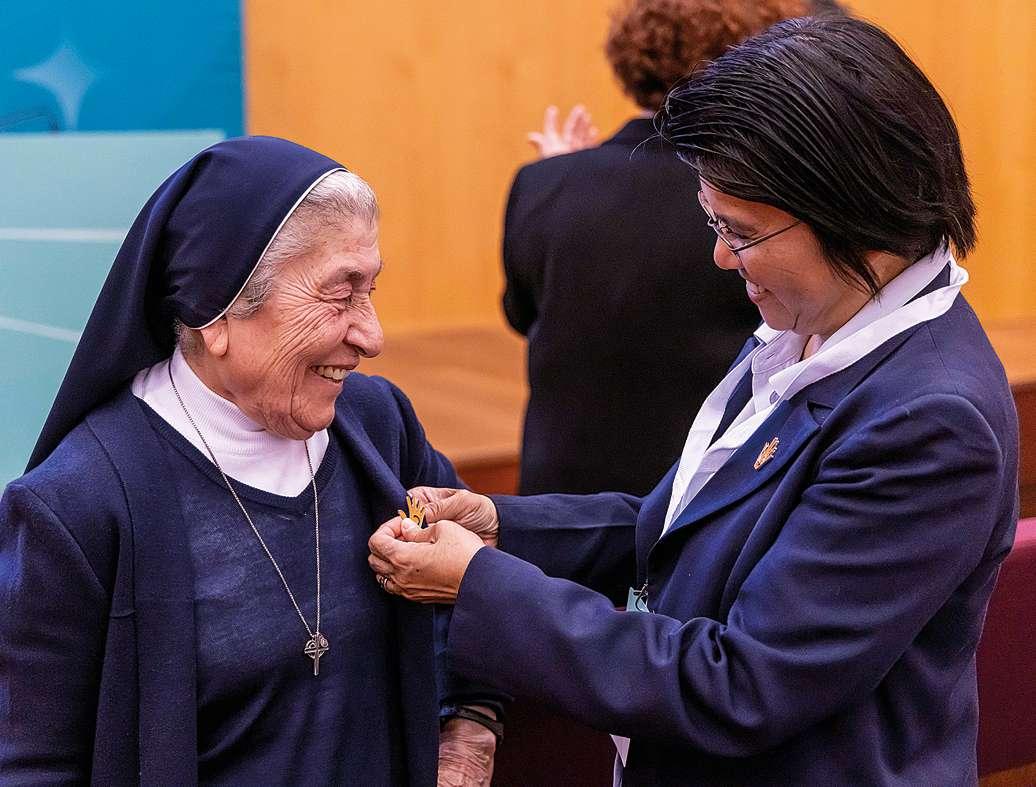
The Sisters’ Anti-Trafficking Awards in 2024
The Sisters’ Anti-Trafficking Awards (SATAs) aim to bring international attention to the reality of human trafficking. Since 2023, three awards are given annually to three sister laureates to acknowledge the devotion and passion that individual sisters (and through them, Congregations) have put into the fight against human trafficking. Coordinated and hosted by the Conrad N. Hilton Foundation, the Arise Foundation, and the International Union of Superiors General (UISG), the SATAs are an opportunity to gather people from different realities to meet, dialogue, share, and learn from each other, in the hope of developing a wider anti-trafficking network. Since human trafficking is a networked crime, it requires a networked response.
On May 23 rd, 2024, the second SATAs were held in Rome. The event was well attended by more than 200 Sisters and partners from different parts of the world, reflecting the global commitment to
ending human trafficking. Facilitated by Vaticanologist Delia Gallagher, the ceremony began with impactful testimonies from youth, survivors, and policy-makers acting against human trafficking. In her keynote speech, Sr. Nathalie Becquart, XMCJ, Undersecretary of the General Secretariat of the Synod, highlighted the importance of listening to victims and survivors, and serving those on the peripheries.
The 2024 laureates were:
• Sr. Grasy Luisa Rodrigues, FDCC, from India, recipient of the Common Good Award
• Sr Anne Victory, HM, from USA, recipient of the Servant Leadership Award
• Sr. Marie Claude Naddaf, RGS, from Lebanon, recipient of the Human Dignity Award.
Each recipient represents not only herself, but also her network, congregation, and community.
“I cannot do it alone. I’m just a drop in the ocean. So I need others’ support, others’ collaboration […]. We share our work, our mission, we participate in each other’s joys and sorrows.”
Sr. Grasy Luisa Rodrigues, Common Good Award Recipient
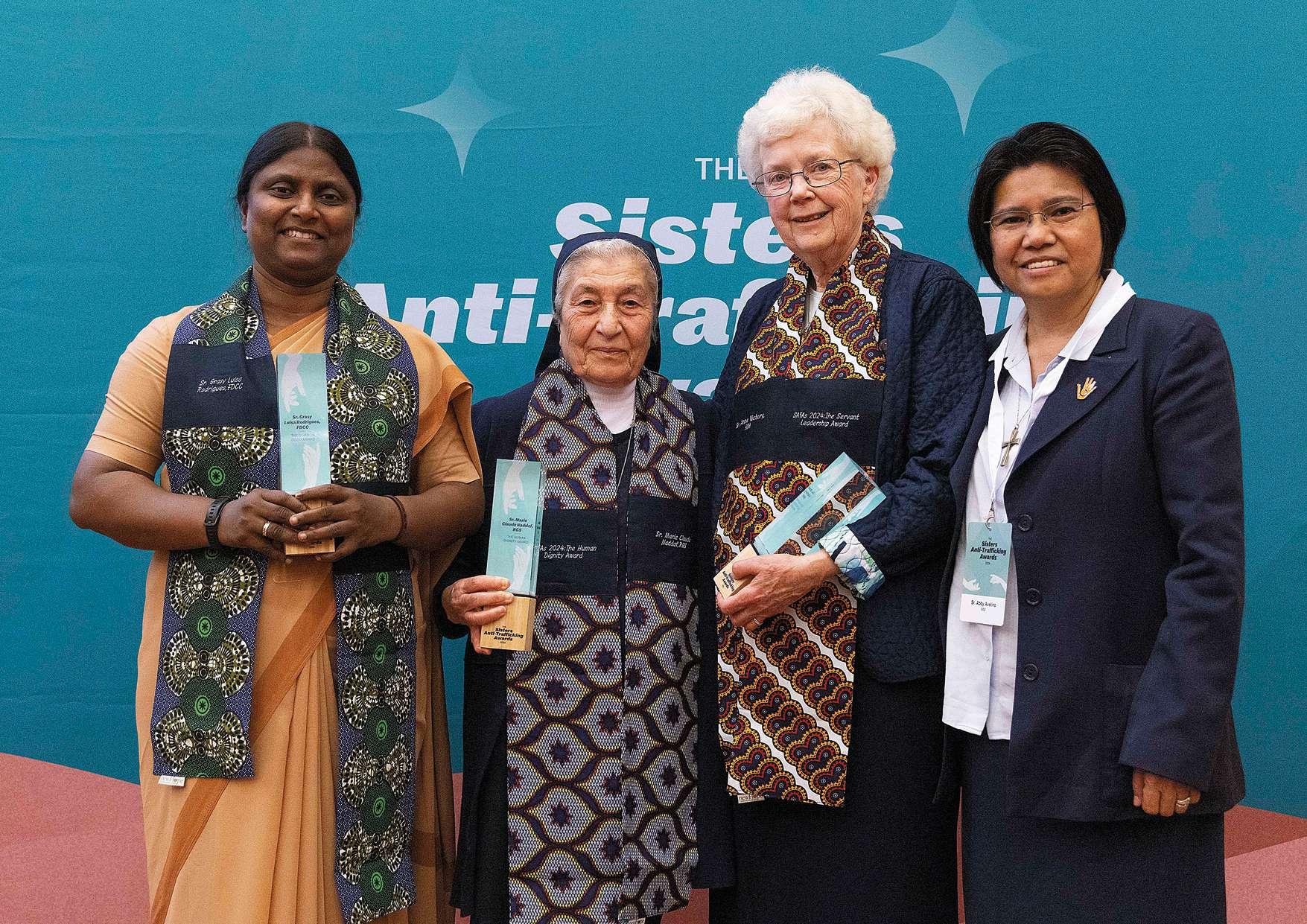
© Stefano Dal Pozzolo / SATA2024
We Embrace Award 2024
Talitha Kum International was honoured with the We Embrace Award 2024 in the “We Embrace the World” category at a charity gala held in Milan on March 21, 2024. This event, organized by the non-profit art4sport, was inspired by the story of athlete Bebe Vio, and recognized organizations committed to creating a more inclusive world. In accepting the award on behalf of Talitha Kum, Sr. Abby Avelino described it as a meaningful recognition of Talitha Kum’s global efforts to support victims and survivors with care, dignity, and hope.
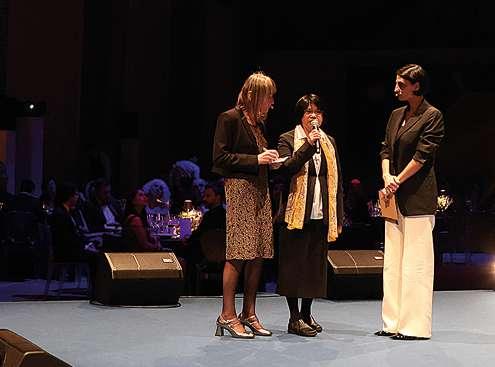
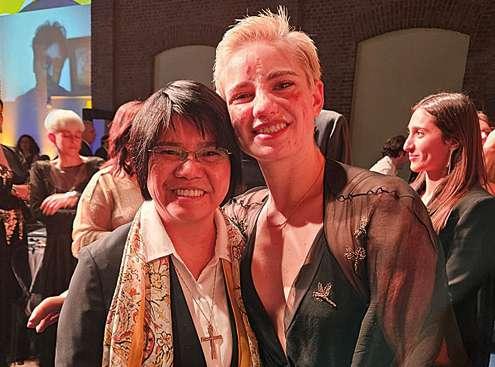
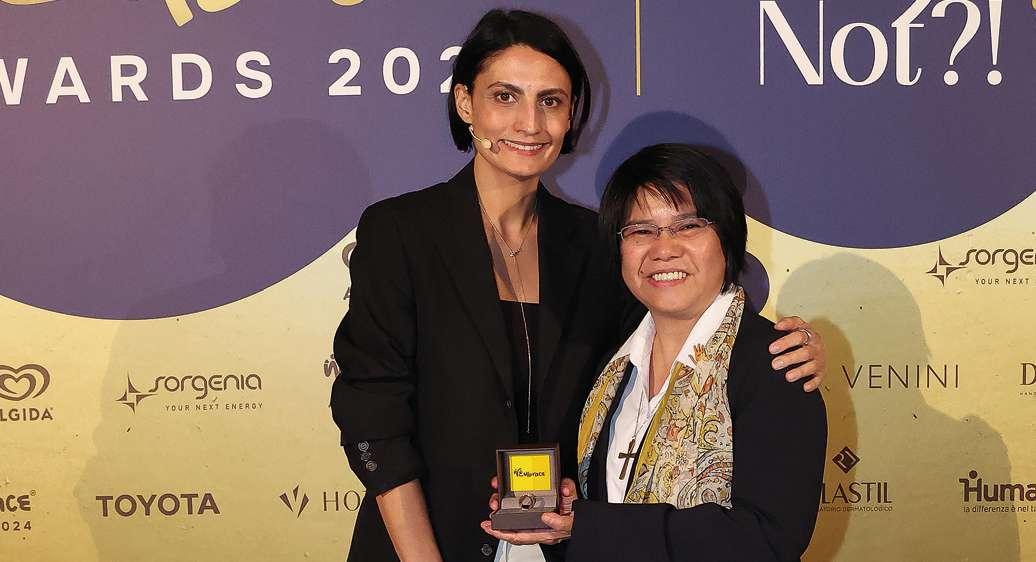
© Bizzi team and Luigi Lombardo /WE Awards 24
© Bizzi team and Luigi Lombardo /WE Awards 24
© Bizzi team and Luigi Lombardo /WE Awards 24
Lifetime Achievement Award 2024
Sr. Laurentina Suharsih, a member of the Sisters of Divine Providence in Indonesia, was honoured on December 28, 2024 by Indonesian President Prabowo Subianto with a Lifetime Achievement Award for over a decade of dedicated service to anti-human trafficking efforts. Sr. Laurentina’s journey into anti-trafficking began in 2011, and has a particular emphasis on migrant workers’ rights. The government’s recognition of her work underscores the importance of collaborative efforts between religious organizations, civil society, and the government in addressing and combating human trafficking. Sister Laurentina is better known as “Sister Cargo” since after she was sent by her Congregation in 2017 to help victims of human trafficking, she assisted in repatriating hundreds of corpses of undocumented Indonesian migrant workers.
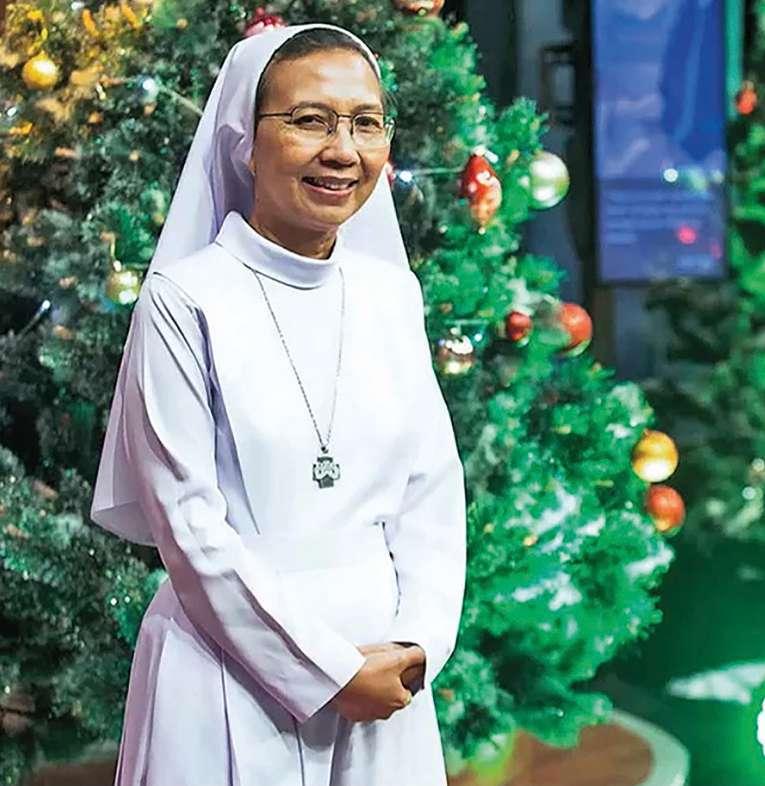
Photo courtesy of Sr. Laurentina Suharsih
Honorary Doctorate of Humane Letters degree –Liverpool Hope University
On July 25, 2024, Sr. Imelda Poole, IBVM, was awarded an honorary Doctor of Humane Letters degree by Liverpool Hope University in recognition of her unwavering commitment to eradicate modern slavery and her advocacy for the rights and dignity of vulnerable individuals. Through her roles in the Mary Ward Loreto Foundation, and as co-founder of Religious in Europe Networking Against Trafficking and Exploitation (RENATE), Sr. Imelda’s efforts have been instrumental in providing shelter and care to those rescued from trafficking, as well as furthering education and prevention in highly vulnerable and exploited communities. Her leadership in RENATE has significantly enhanced support for survivors and strengthened cooperation with law enforcement to bring perpetrators to justice.
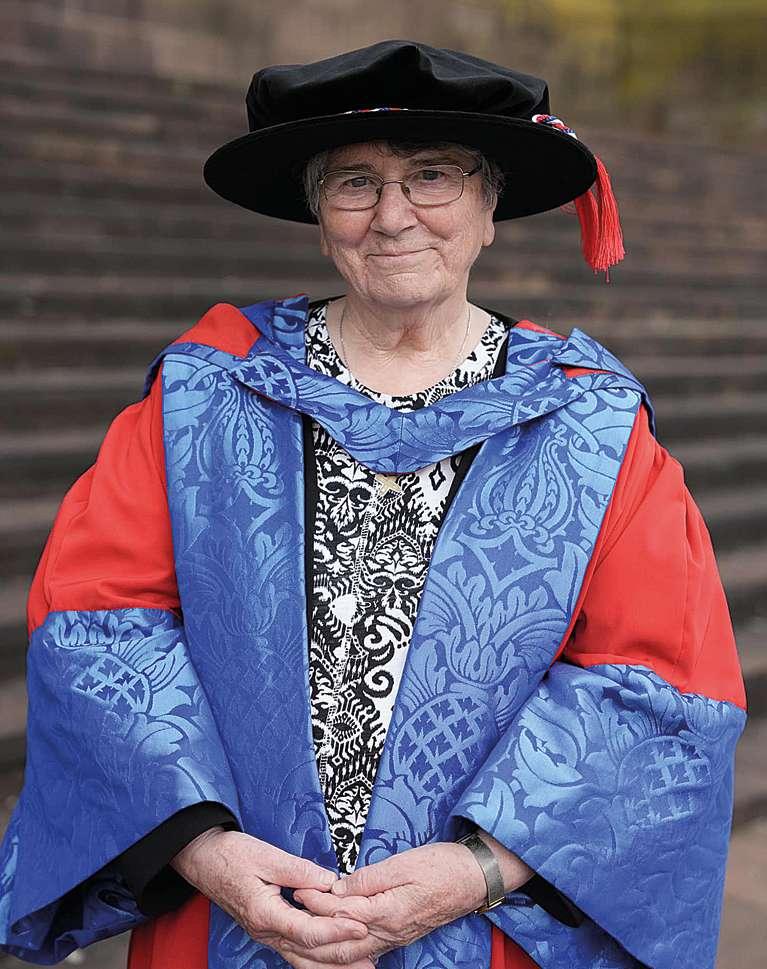
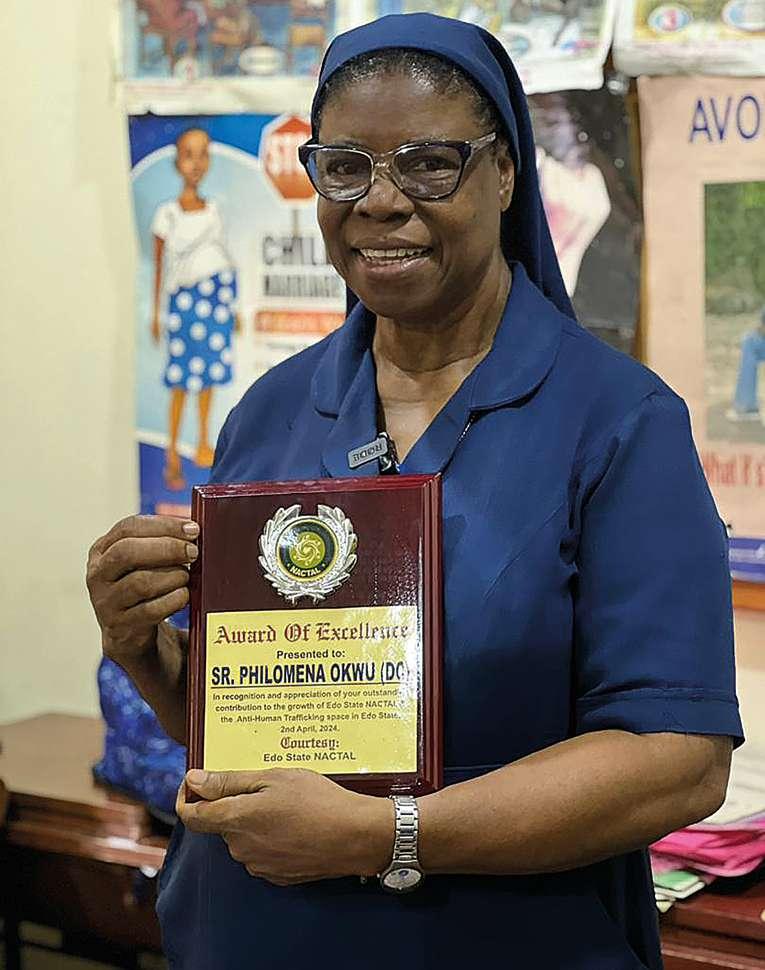
Award of excellence by Nigeria’s Network Against Child Trafficking, Abuse and Labour (NACTAL)
S
r. Philomena Okwu, of the Daughters of Charity of St. Vincent de Paul, was presented on April 10, 2024 with an award of excellence by Nigeria’s Network Against Child Trafficking, Abuse and Labour (NACTAL) for her outstanding dedication to victims of human trafficking and her contributions to anti-human trafficking efforts. Okwu has been involved in anti-human trafficking efforts since 1999 and is a member of Talitha Kum in Nigeria. Through numerous initiatives, she has raised public awareness for the prevention of human trafficking, the importance of protecting and caring for survivors through rehabilitation and reintegration, and the prosecution of perpetrators.
15 NEXT STEPS
Concrete Actions
Towards Systemic Change, a Survivor-Centred Approach, and Broadened Collaboration (2025–2030)
I. Strengthen Global Advocacy
By the end of 2025, Talitha Kum plans to develop a multilingual Advocacy Study Packet that includes survivor testimonies, practical tools, and Gospel reflections to support advocacy training and local campaigns.
International Days Against Human Trafficking (February 8 and July 30) will be marked by coordinated global campaigns led by religious, survivors, and youth ambassadors. Talitha Kum will increase its engagement on international platforms and strengthen partnerships with interfaith and faith-based groups for joint advocacy efforts.
II. Advance a Survivor-Centred Approach
By the end of 2026, a global network of survivor leaders will be established.
Trained focal points on each continent will begin monitoring and reporting trafficking trends starting in 2025. A Victim Identification Guide will be piloted in early 2026 to enhance grassroots capacity to identify and support victims. Partnerships will be initiated in three countries to establish integrated survivor support centres providing legal aid, healthcare, and psychosocial services. Survivors will actively contribute to program development, campaigns, and research
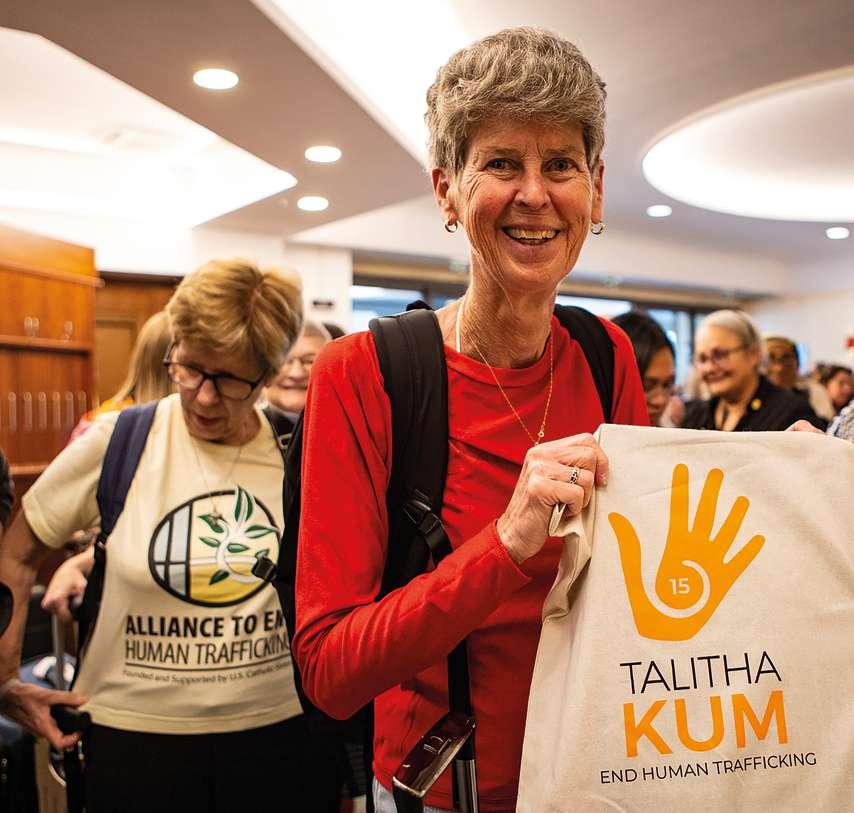
© Margherita Simionati-TK-UISG
III. Formation and Leadership Development
The Talitha Kum Leadership Formation Program will expand to include the formation of regional and national leaders in trauma-informed and synodal-collaborative leadership approaches.
A New Leaders Handbook will be created to support leader orientation and succession planning.
The Youth Ambassadors Program will grow to include at least 10 new countries by the end of 2025, with training modules on survivor sensitivity, safeguarding and digital advocacy, and community engagement.
Hybrid formation sessions will be offered to both religious and collaborators to strengthen resilience, mission focus, and Gospel-rooted responses to emerging challenges.
IV. Enhance Communication and Visibility
By late 2025, a global communication team will be established, the website refreshed, and a coordinated social media strategy will be implemented to showcase regional and global initiatives, survivor stories, and campaigns. Regular communication training will be provided to Talitha Kum leaders, youth ambassadors, and survivors.
A strategy to promote and expand the use of the Walking in Dignity App will be developed in collaboration with young people globally.
V. Strengthen Regional Collaboration and Sustainability
Regional conferences will be held in Asia, Africa, and Latin America in 2025, focusing on advocacy, formation, and collaboration. These initiatives will contribute to the mid-term strategy review scheduled in 2027.
Three pilot countries will be selected to demonstrate best practices in survivor care, leadership development, networking, and resource management. Capacity-building workshops on project management will be provided, alongside outreach for legacy giving among religious congregations.
These concrete actions will strengthen Talitha Kum’s global mission and provide a solid foundation for achieving its 2025–2030 vision—driving systemic change, empowering survivors, and deepening collaboration across regions and faith communities.
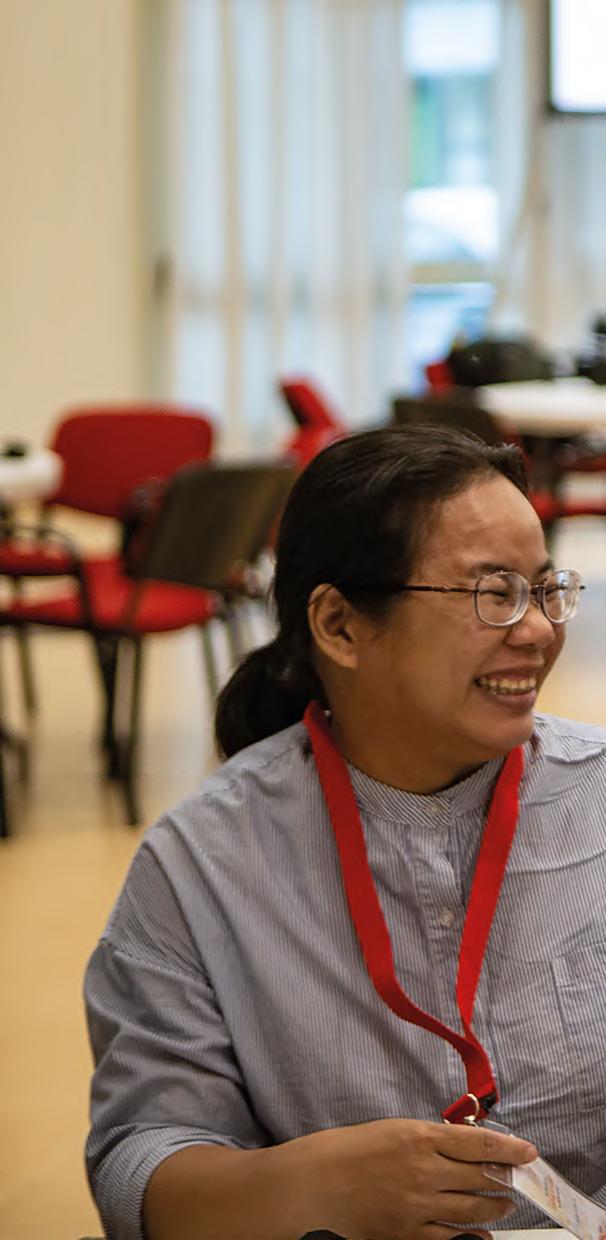
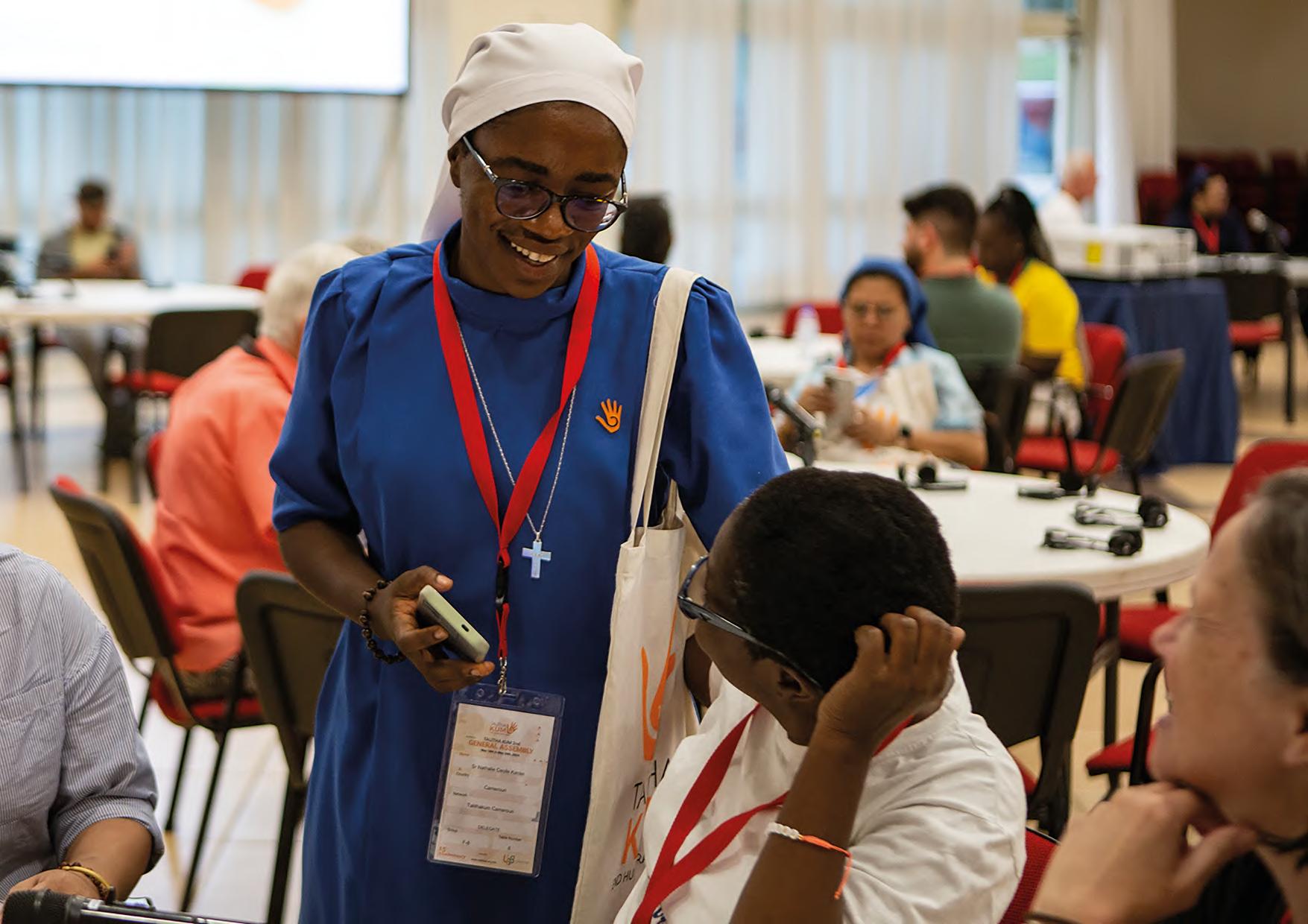
16 CONCLUSION
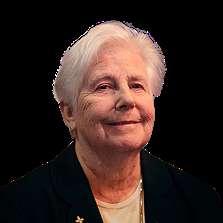
SR. PATRICIA MURRAY, IBVM UISG Executive Secretary
Women Religious Leading the Talitha Kum Mission
As I read the 2024 Talitha Kum Annual Report, I began to reflect on the extraordinary growth in engagement by religious and lay people in anti-trafficking ministry since December 1998.
That was the month and year that Sr. Lea Ackermann, MSOLA, from SOLWODI, spoke at a Justice, Peace and Integrity of Creation (JPIC) gathering in Rome. Her words began a movement that has since spread worldwide and is now known as Talitha Kum. It has been led by extraordinary women religious who have facilitated its growth and development.
We celebrate the commitment of the international coordinators, beginning with Sr. Estrella Castalone, FMA (2010–2014), who sadly died in 2018. She was succeeded by Sr. Gabriella Bottani, CMS (2014–2022), who had been engaged in anti-trafficking ministry in Brazil before
coming to Rome. More recently, Sr. Abby Avelino, MM (2022–present), who served as the Talitha Kum Coordinator in Japan and later as Regional Coordinator for Asia, has taken up the role.
Each of these sisters has brought knowledge, insight, passion, and commitment to the growth of Talitha Kum. They have answered the appeal of Pope Francis to defend human dignity and fight human trafficking—a call that echoes that of Pope Leo, who consistently urged special attention and protection for the most vulnerable members of society.
There have been other notable religious women whose efforts have been widely recognized: Sr. Eugenia Bonetti, CM, founder of Slaves No More, which concluded its work in October
2024 after rescuing and repatriating many survivors of human trafficking; Sr. Bernadette Sangma, FMA (who sadly died in 2015), a key figure in offering formation worldwide to help establish anti-trafficking networks; Sr. Imelda Poole, IBVM, who works tirelessly to eliminate trafficking throughout Europe, particularly in Albania and the UK; Sr. Laurentina Saharsih, SDP, whose antitrafficking work with migrant workers in Indonesia has been highly effective; and finally, Sr. Philomena Okwu, DC, who has spent years supporting victims of human trafficking in Nigeria.
Each year, the UISG, in conjunction with the Arise Foundation and the Conrad N. Hilton Foundation, offers three awards to outstanding sister leaders in the categories of Servant Leadership, Common Good, and Human Dignity. In 2024, the recipients of these awards were Sr. Anne Victory, HM (USA); Sr. Gracy Luisa
Rodrigues (India); and Sr. Marie Claude Naddaf, RGS (Lebanon). At each award ceremony, the laureates represent the many other leaders whose commitment, dedication, and courage have rescued, repatriated, rehabilitated, and restored the dignity of countless women, men, and children.
As Talitha Kum continues to flourish, thousands of consecrated women and men—and a large number of lay women and men—participate in over
60 networks. It is particularly exciting to see the growth in the number of youth ambassadors and the success of their creative initiatives in forewarning their peers of the dangerous methods used by traffickers.
May all the Talitha Kum networks continue to grow stronger. And in this Jubilee Year of Hope, may their outreach bring the precious gift of hope to those who feel trapped, exploited, and abandoned. May they show them the tender face of God.
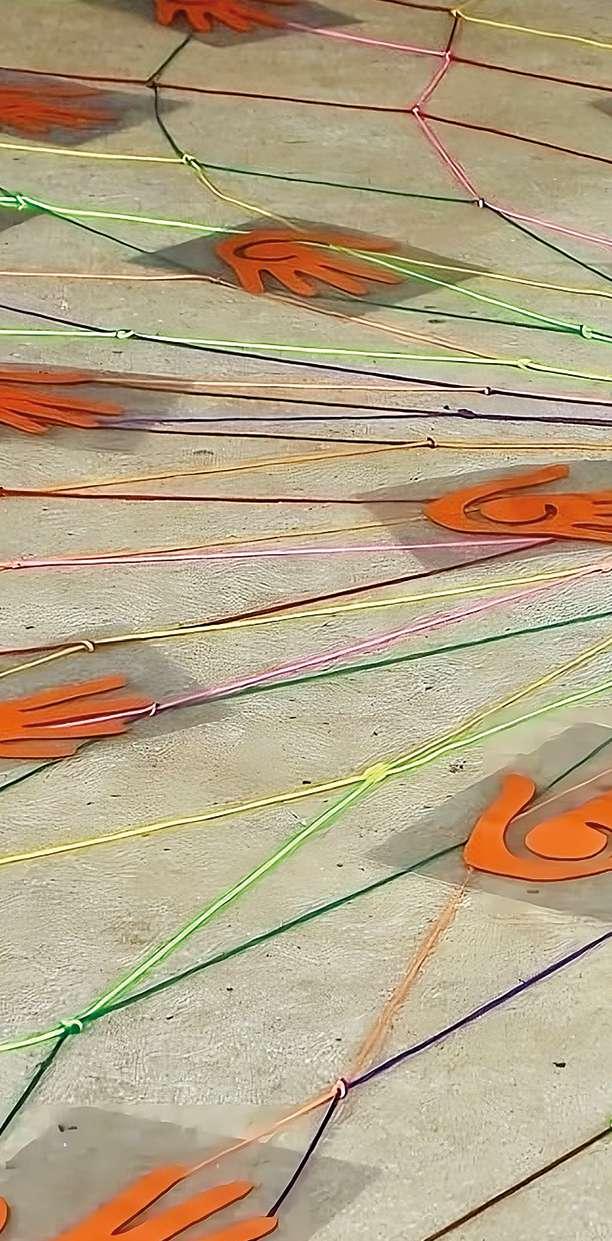
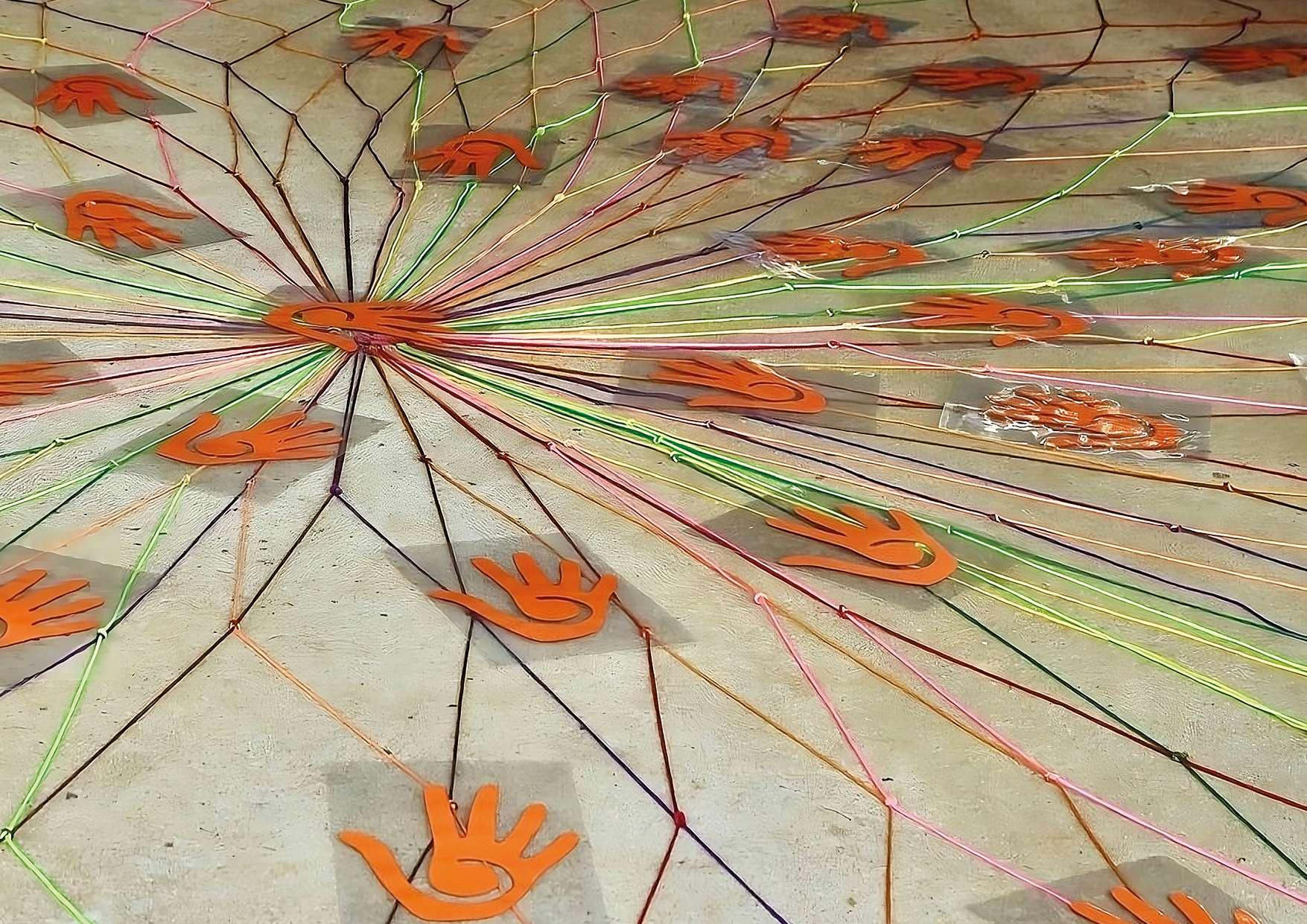
17 PARTNERS
The International Union of Superiors General is grateful to all the partners, collaborators and supporters of Talitha Kum International during the year 2024.
Together, as partners in mission, you help us create lasting impact and drive meaningful change.
Partners
Dicastery for Promoting
Integral Human Development
Dicastery for Communication of the Holy See
Caritas Internationalis
World Union of Catholic Women Organizations
Anti-Trafficking Working Group of the Justice and Peace Commission (JPIC) UISG - USG
Pontifical Gregorian University
- Department of Social Sciences
Pontifical University of the Holy Cross
Tangaza University College
Jesuit Refugee Service
Collaborators
Multilateral Section of the Secretary of State
Embassies to the Holy See
International Organization for Migration – IOM
United Nations High Commissioner for Refugees – UNHCR
Organization for Security and Co-operation in Europe – OSCE
International Justice Mission – IJM
UN Special Rapporteur on trafficking in persons, especially women and children
The Regional Implementation
Initiative of Preventing and Combating Human Trafficking
The Santa Marta Group
Focolari Movement
The Clewer Initiative
Azione Cattolica Italiana – ACI
Association Pope John the XXIII
Community of Sant’Egidio
Associazione Guide
e Scouts Cattolici Italiani – AGESCI
Anti-trafficking formation and networking consultants
Supporters- Partners in Mission
Conrad N. Hilton Foundation
Conrad N. Hilton Fund for Sisters
Galileo Foundation
Lady of Bethany Sisters
Porticus
Misean Cara
UK Embassy to the Holy See
Religious Sisters Congregations
Online donors
18 LIST OF ACRONYMS
ACRATH Australian Catholic Religious Against Trafficking in Humans
AEHT Alliance to End Human Trafficking
AMRAT Asian Movement of Women Religious Against Human Trafficking - Talitha Kum India
CATHII Comité d’action contre la traite humaine internet et internationale (Committee Against Trafficking in Persons)
CHTEA Counter Human Trafficking Trust - East Africa
CLAR Confederation of Latin American Religious
Con PAHT Consecrated Persons (Ghana) Against Human Trafficking
IDPAAHT International Day of Prayer and Awareness Against Human Trafficking
IGO Inter-governmental organization
JPIC Justice, Peace and Integrity of Creation
NACTAL Nigeria’s Network Against Child Trafficking, Abuse, and Labour
NGO Non-governmental organization
RENATE Religious in Europe Networking Against Trafficking and Exploitation
SATAs Sisters’ Anti-Trafficking Awards
TFW Temporary Foreign Workers
TKGA Talitha Kum General Assembly
UISG International Union of Superiors General
UNODC United Nations Office on Drugs and Crime
19 CREDITS AND CONTACT
© 2025 Talitha Kum - UISG. All rights reserved.
View the Report online at: www.talithakum.info
Produced by Talitha Kum
Editors
Sr. Abby Avelino, MM
Sr. Yvonne Clemence Bambara, RGS
Sr. Carmen Ugarte Garcia, OSR
Sr. IsaBelle Couillard, SGM
Sr. Adina Balan, CJ
Sr. Annette Arnold , RSJ
Sr. Paula Kwandao Phonprasertruksa, SPC
Sr. Denin Chiriyankandath, JMJ
Marion Paparella
Emma Pagé
We gratefully acknowledge the efforts of the Talitha Kum network across the globe in populating and maintaining the database. Their contributions were essential to the development of this report.
Data collection support
Francesca Mattetti, Intern- John Cabot University
Mia Latran & Nicole Deady, Interns-Institute for The International Education of Students
Special thanks to Sr. Bernadette Reis, FSP
/talithakum.uisg/ /talithakumrome/
@TalithaKumUISG
Review Editors
Sr. Bernadette Reis, FSP (English)
Contact us and subscribe our newsletter at talithakum.info/en/contacts/
Support us donorbox.org/talitha-kum
Emma Pagé and Marion Paparella,
Sr. Rasmata Nadine Ouedraogo, CSC (French)
Alessandra Tarquini (Italian)
Sr. Milagros Isabel Plaza (Spanish)
Sr. Ines Camiran, SSND (Portuguese)
Coordination: Alessandra Tarquini
Graphic Design: Marco Soma and Livia Ranzini @4Sigma
Web Design: Domenico Cosentino @4Sigma
Cover photo by Margherita Simionati
Photos
Talitha Kum/UISG
Lisa Kristine
Asaf Ud Daula/GMPT
Margherita Simionati
Marco Mastrandrea
Stefano Dal Pozzolo / SATA2024
Bizzi team and Luigi Lombardo /WE Awards 24

INTERNATIONAL UNION SUPERIORS GENERA L
